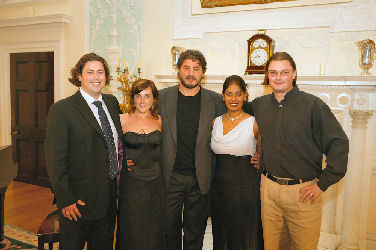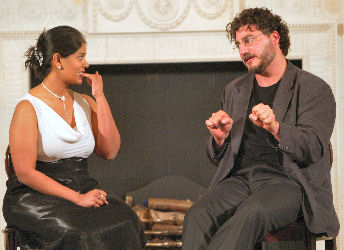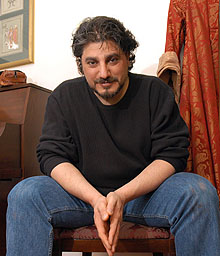Mama Mia! That's some
tenor
Shanghai Daily
Created: 2007-2-9
Argentine tenor Jose Cura sings
a superb Prince Calaf in "Turandot" and immodestly says his
"good shape, big and strong" is ideal for the role. But he calls
the greedy, kingdom-hunting character "disgusting" and hopes
Chinese audiences won't think ill of him, writes Michelle Qiao.
Opera singers often identify with, even love their roles, but
Argentine tenor Jose Cura loathes "Prince Calaf," his character
in the opera "Turandot" staging this weekend at the Shanghai
Grand Theater.
"'Turandot' is not a love tale, but a tale of interests and
greedy people trying to seize power," the tenor said during
a press conference this week.
"The character of Calaf is not romantic. Chinese Princess Turandot
loves Calaf but Calaf wants her for her kingdom, money and power.
He is superficially charming but behind the mask he's an idiot,
disgusting.
"The Prince has lost his own kingdom and searched in the world
for another kingdom," says Cura. "He put in danger the people
he loves to obtain something he wants."
"I'm sorry that for the first time in China, I must play an
idiot. Please don't think ill of me or link me with the character."
However, playing the black-hearted and designing prince, the
tenor still impressed his Shanghai audience with his charming
"surface" and superb voice last night.
This production of "Turandot" is a treat for the eyes because
both Cura and soprano Paoletta Marrocu, who sings Turandot,
are in good shape compared with other overweight Calafs and
Turandots in the opera world.
"My good shape, big and strong, is the result of many years
of physical training in my early days," says Cura, wearing a
pink sweater and a pair of comfortable white sneakers. "In the
past, a long time ago, I weighed 20 kilos less. Now I'm 44,
20 kilos more, and 20 years older."
But he can still pass for a prince.
"For roles in modern theater, if you look like the character
it's better for the theater fantasy. Old audiences gave the
greatest importance to good singing. But the younger generation
likes good spectacles."
Cura's charisma shone from the start of the production created
by the Shanghai Grand Theater and the Zurich Opera House, when
he showed up like a sexy secret agent in a black leather jacket,
a tight-fitting gray vest and shades.
In sharp contrast to the antique green copper hues of the set
and the icy demeanor of Princess Turandot, Prince Calaf casually
smoked a cigarette and searched his laptop for answers to Turandot'
love-or-death riddles.
He even stretched on the ground to sing his famous aria "Nessun
Dorma," perfectly striking high B. His melodious vocals with
beautifully held top notes were expertly controlled.
With the Bund as the backdrop, the prince ended his dangerous
love pursuit with a romantic candle-lit dinner with the cruel
princess who had actually fallen in love and changed her weighty
formal robes for a fitted scarlet evening gown.
"Cura was not only acting, but also creating," says Zhang Guoyong,
head of the Shanghai Opera House. "He demonstrated the talent
of a true master."
Unlike other opera stars who often give pleasant, bland comments
during interviews, Cura was bold and forthright. "Mama Mia,"
he occasionally exclaimed when occasionally targeted with surprising
questions.
"I didn't know I'm famous in China," he said. "I thought I was
completely unknown and so I could relax on stage. Now you will
expect so much from me and I must rise to the challenge."
No matter whether he likes it or not, Cura is widely known in
China as "the world's fourth tenor" (after Luciano Pavarotti,
Placido Domingo and Jose Carreras).
"You can say I'm the successor of the three tenors who are as
old as my father and you are also the successor of your own
parents, right?" he says. "We are the next generation and the
world was so different from their time around 30 years ago when
CDs and DVDs had just been invented. "Now we face a big crisis
of new media and the Internet and MP3s will be the future. If
Bach were alive today, he might use a computer to write music.
It's very complicated, not simply being a successor. It's difficult
to succeed in the opera world today."
Cura has been a rare artist who's not only a tenor, but also
a conductor and composer. In addition to the two "Turandot"
operas, he will conduct the Shanghai Symphony Orchestra for
a concert at the Shanghai Grand Theater on February 14.
"I will also try the role as an opera director," says Cura.
"In every role I have put all my love, so I cannot say which
role I'm best at. But what makes me happiest is conducting.
I meant to do some deep, profound music for the Shanghai audience.
But the organizers asked me to do some romantic music for Valentine's
Day, such as 'Romeo and Juliet'."
As a tenor of IT times, Cura has an iPod with him that is filled
with jazz, symphonic music, and his favorite singer Karen Carpenter
- but no operas.
"I don't like some untuned pop music," says the tenor. "I cannot
have music as a background. If music is there, I will have to
pay attention to it. So I only like music with dramatic objectives."
Despite its modern elements, this production of "Turandot" closely
follows the original Puccini plot. Princess of China, the dangerously
beautiful Turandot, refuses to marry anyone but the man who
can answer her three riddles. All suitors who fail will be put
to death.
Enchanted by her beauty - and kingdom - the unknown Prince Calaf
dares to try and at last succeeds, at the cost of the life of
his slave girl Liu, who is in love with him.
"Prince Calaf has a disgusting personality," repeats Cura. "He
can be a citizen of any country of any race, like the greedy
people of all times. They don't hesitate to kill their mother
to succeed."
Well, maybe Cura feels it's a pity to show up as a man with
disgusting personality for his China debut. But through his
on-stage acting and off-stage talking, the tenor has showed
Shanghai the unique personality behind "the fourth tenor."
The Two Loves of José Cura
Publico.pt
19 October 2007
Pedro Boléo
The voice of
Argentine José Cura can be heard today in Lisbon. And that
is only one part; after the interval he picks up the baton and takes
Beethoven by the horns. Rebelliousness or professionalism?
He has two loves: the baton and the voice.
Two forms of expression of the same personality. José Cura
says that he used to want to be a maestro, but had to sing to sustain
his family. Now it is not quite so true: the Maestro
José also sustains the family, and Cura did not stop being a tenor.
Today, in the Teatro San Carlos in Lisbon, he will sing some arias
from opera but the main course of the evening is the 9th
Symphony of Beethoven, conducted by this artist in search of joy.
The same work, the 9th, the most emblematic of the ‘genius,’
as the maestro without fear states.
How? Does he sing and direct the singers?
Is he behind and in front of the orchestra? José Cura explains:
“The artist prepares a show—it can be one part, the other part,
or both.” In 2003, in Hamburg, he directed an opera and after the
interval he jumped on stage to sing another. Of course:
“Nobody finds it strange that DeNira goes behind the camera.
Or that Woody Allen is the actor in his films. But in opera…”
José Cura fights against the established ideas
and prefers to consider himself a total artist. Or at least
an artist free to do as he wants. A rebel? “Not in an
unpleasant sense, but an artist has the right to create following
his own reality and instinct,” he says.
He has already
been told he does too many things: he responds that to be
an artist “is not only to be safe and avoid risk.” He has
already been criticized for singing and gesticulating, as if directing
the orchestra: he argues that an artist “must be true to their
own nature.” Before we even ask about the 9th Symphony
he is about to conduct, José Cura adjusts the chair in his dressing
room at the San Carlos and adds Beethoven to the discussion.
“If they had dictated to Beethoven what he should have done, he
would not have been able to do what he did to the art of the symphony.”
And remember: “About the symphony they said it was as unpleasant
as the sound of a bag of nails. That it was banal. That
there was 55 minutes more than what was needed. Today, we
know that it is the cornerstone of symphonic music.”
And will Cura launch
himself into the ‘cornerstone’ as if it were nothing? He has
the size, the physical strength, and the enthusiasm, certainly,
but does he have the right stuff? “Yes, I feel the responsibility,”
says the singing, slouching in his chair. “But on the other
hand, it is simple: simply respect what the genius wrote.
We must put ourselves into the hands of the composer.” It is then
that José Cura leans forward and starts offering a thousand ideas
about how the symphony could go. He puts himself in the hands
of Beethoven. “Many conductors today still think they can change
a symphony to the better. It is a fairly common arrogance.
Even if it was ‘to improve it’…. Does it need to be improved?” Asks
José Cura. We are, by the way, reminded of the version of
the 9th by Maestro Herbert von Karajan, and he said jokingly:
“It was you who said it, not me.” But he is now out of jokes:
“There were excesses of a pseudo-romantic kitsch for a while.
Maybe people needed it that in the post-war period- a mist, one
to hide the exaggerated, excessive mannerism, distilled, but it
has its time. We must put this in its historical context.”
Today things are different, he says. “Also because there are
better editions of the scores. And we arrive at impressive
conclusions. For example, Beethoven wanted certain passages
taken more quickly.” And just so there is no misunderstanding, the
Argentine maestro warns: “Many people will find my interpretation
strange and original. But it is only what is written.”
We then move to
José Cura, tenor—the same man but a star with different demands:
attitude on stage, physical appearance, theatrical capabilities.
Is this just a marketing of his image? “I do not know what
is marketing,” he says immediately. “It has to do with being
beautiful or not.” And he confesses that “many roles that I would
like to play are or stranger or ugly types, but they do not let
me do them. It is true that in spite of everything, we all
have a physical self that determines the type of character.”
José Cura is a
man of 45 years, an opera superstar but also a simple and direct
person, with a moving honesty in how he speaks. He is not
a man of poses, although he knows how to be an actor and give a
performance. The keyword that connects to success is “professionalism
– a word that is used often but is worth ever less.” But in music
it is a different case: “It is a problem that music is not
like medicine. If a surgeon doesn’t have the degree, then
he is not going to cut into your intestines. But in music
the title does not mean anything. Many people say that are
[professional] but they are not. They deceive the public.”
We could see in
him as a modern and multifaceted Pavarotti, one who goes to the
gym, takes photographs (another great passion) plays guitar, singes,
conducts, directs. But no—he is only José Cura, a rebel and
a respectful, popular artist in opera houses, a stage animal, a
man with an open mind and with ‘social commitments’ (Cura is a founding
partner of the Portuguese Association against the Leukemia).
Is this rebellion?
Yes and no. He recalls Beethoven, once again: “If it were
not for the rebels we would be in the stone age.”
The Gala Concert
Lisbon, Teatro
Nacional de São Carlos
Today at 21h Chelsey Schill (soprano), Maria Luisa de Freitas (soprano),
José Cura and José Manuel Araújo (tenor); Johannes von Duisburg
(bass). Musical Direction [Symphony No. 9]: Jose Cura; Musical direction:
Mario de Rose. Portuguese Symphony Orchestra. Choir of San Carlos.
Arias, Leoncavallo, Puccini, Giordano and Verdi. 9. St symphony
(Symphony Coral, op.125) from Beethoven
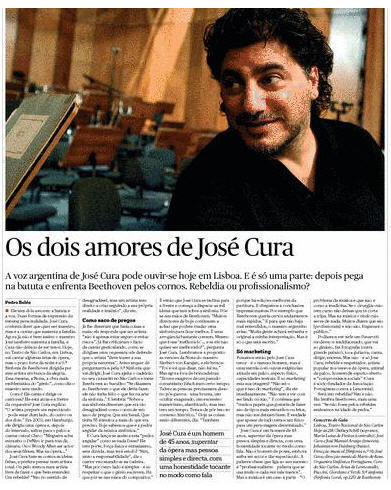
Andrea Chénier, a poet
at the Liceu
Opera Actual
Susana Gavina
[Excerpts /
gist]
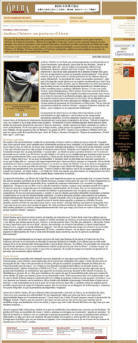 The
Liceu of Barcelona opens its opera season on September 25 with Umberto
Giordano’s Andrea Chénier, a title that returns to this stage
after an absence of two decades, with fourteen performances and
three different casts, the first headed by Deborah Voigt, José Cura
and Carlos Álvarez. The Argentine tenor … explains the points
of view he brings to this masterpiece of versimo. The
Liceu of Barcelona opens its opera season on September 25 with Umberto
Giordano’s Andrea Chénier, a title that returns to this stage
after an absence of two decades, with fourteen performances and
three different casts, the first headed by Deborah Voigt, José Cura
and Carlos Álvarez. The Argentine tenor … explains the points
of view he brings to this masterpiece of versimo.
Andrea Chénier
is a title that has been on the programmed often at the Liceu;
nevertheless, for more than two decades, “from the 1985-86 season,”
confirms Joan Matabosch, artistic director of the Gran Teatro,
it has not been staged. “It is a work in the repertoire and one
of the most popular in the recent history of the Liceu. Because
of that, programming it has become a small event.” One of the reasons
for its absence in the last few years, according to Matabosch, “is
the need to have great singers.” He has managed to bring together
a cast headed by José Cura, Deborah Voigt and Carlos Álvarez, alternating
with the voices of married couple Daniela Dessí and Fabio Armiliato
together with Anthony Michaels-Moore and another set with Carlo
Ventre, Anna Shafajinskaia and Silvio Zanon. In the pit will
be musical director Pinchas Steinberg. In staging the opera, the
Liceu is not treating itself to a new production this time, something
great theaters are usually expected to do at the beginning of the
season. Instead, they have hired a production from Tokyo designed
by Philippe Arlaud, who this year presented Tannhäuser in
Bayreuth. "It is not a question of this being a radical reading
of Andrea Chénier,” the art director of the Liceu assures,
“but it is not a traditional staging either.”
Jose Cura's presence in the Barcelona opera theater is turning
into something of a habit and is the only one in this Spanish opera
seasons. The Argentine tenor returns with a role he knows well,
that of a revolutionary poet executed by his own comrades in arms.
“I made my début in the role in 1997 in London, and I do not do
it as much as I would like to,” he says with regret during a telephone
interview from Buenos Aires, where he has returned after an absence
of almost nine years. “Since then, I have sung it in maybe four
or five productions. It is not an opera that has become common,
probably because the roles of the tenor and the soprano are very
difficult. Last year I did it in Bologna and it was recorded
on DVD,” he adds. Cura confessed to ÓPERA ACTUAL that he did not
know anything of the Japanese production and joked: “I hope not
to be alarmed. Do you know anything?” he asks.
For the tenor, a test
As far as the vocal characteristic of his role, the tenor underlines
again that it a matter of “a very hard role for a tenor, but also
very interesting because it is very complex. In the first
act, especially in the ‘Improvviso,’ the tenor is very present,
the aria is quite dramatic and written central enough that one must
try to be heard because the orchestra plays loudly. Later,
in the second act—and that is the most tremendous because there
is a great monologue and a great duet—that is where the tenor is
tested and discovers if the role fits your voice or not. The
third is simpler and the fourth is complicated because the first
aria is practically written for a lyric tenor, very dreamy, almost
with the scent of the aria ‘E lucevan le stelle’ from Tosca,”
according to Cura. “It is a bit of the farewell. And later
is the final duet, which is very badly written—and I don’t say this
only because it is super-orchestrated but it has that effect, though
it is tremendous. It is there where it really returns to test the
tenor to see if one is a tenor for Chénier or not. This is
an opera which time and time again puts the singer to the test.”
Singers such as Mario del Monaco, José Carreras, and Plácido Domingo
have interpreted this role. “Franco Corelli became famous
because of it. It is a role in which, much like Saint-Saëns’
Samson or Verdi’s Otello, even though it is a minor work when compared
with these titles, the tenor is greatly illuminated and it can even
mark your career.”
Giordano’s opera, with libretto by Luigi Illica, is inspired
in part by a real person, a French poet with the same name who was
a partisan in the French Revolution, although the execution of Luis
XVI caused him to redefine his support, finally being executed after
accusations of being a counterrevolutionary. “I have a book
at home about the life of the real Chénier, although as usual in
opera the history is exaggerated for the melodramatic requirements
of the plot. He was a revolutionary who died for speaking the truth.
He was an honest person and when he saw the ideals that he had originally
defend transformed into what he had been criticizing, he decided
to separate himself. The opera denounces the system in power,
independently of the party who holds it. In this sense, the
opera Andrea Chénier is both very durable and very current.” The
tenor emphasizes a phrase in the second act, “that is almost not
heard but which summarizes the opera: ‘The old courtesan inclines
her head to the new God.’ In the end they all pay homage to
the same thing, independent of its color. This phrase is turned
ultimately against Andrea Chénier,” the tenor says.
Other horizons
José Cura confirms that he does not have any other projects planned
in Spanish theaters, in particular the Teatro Real. “In February
2006, when I was performing at the Liceu, the directors of the Real
approached me and said they wanted me to return. That seemed
good to me and so I told them to go ahead, and that was it.
Perhaps there is no repertoire for me at the Real,” he said.
Nevertheless, he has agreements with the Barcelona theater through
2011, although he can not tell us what since “one of the agreements
I have with the theater is not to reveal anything until they announce
the season. The Liceu,” he continued, “is a very well organized
theater. Not even the Metropolitan in New York is signing
that date. In this, the Liceu is an international example.”
In respect to his participation in the macro project of José Moreno
to build the Theater of the Three Cultures, a project from which
soprano Montserrat Cabellé has removed herself, Cura affirms that
he does not know anything, although he has not disassociated himself.
He is waiting for that call from Moreno. “The last time we spoke
he told me all was moving ahead and that he would talk with us when
the project was more firm.” And he insists that “I have never withdrawn
but rather suspended [my involvement]. If when they finish
my calendar allows me, I would love to continue with it.”
José Cura Returns to the Colón
His voice
will be heard again
After eight
years without a role in a production at the theater, the tenor
will star in the main role in Samson et Dalila, which premiers
tomorrow. Tuesday he sang in Rosario, his city, at the
festival for the 50th anniversary to the Monument
to the Flag.
La
Razon
Geraldine Mitelman
[excerpts]
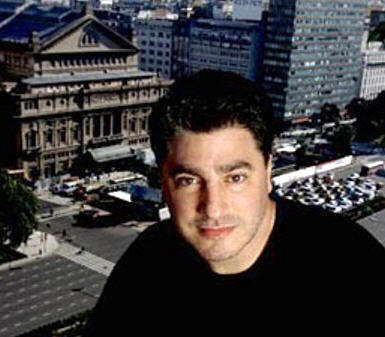 Dressed
in a black T-shirt and looking very casual, the Rosarino tenor José
Cura gave advanced details of Samson et Dalila, the opera
by Camille Saint-Saëns that he stars in, along with mezzo soprano
Cecilia Díaz. Dressed
in a black T-shirt and looking very casual, the Rosarino tenor José
Cura gave advanced details of Samson et Dalila, the opera
by Camille Saint-Saëns that he stars in, along with mezzo soprano
Cecilia Díaz.
The singer, who has not performed in the Colón
season for eight years, proved to be happy and very funny during
the press conference held at a central hotel. After recalling
“the old days when nobody knew him here” until now when he returns
successful (he is recognized everywhere and at present resides in
Europe, where he lives with his wife and children), Cura discussed
the make-up of the character he has interpreted so many times.
“There are two ways to read Samson, and one
of them is wrong. He can be interpreted as a Christ figure,
like a hippy of the 60s. No. He belongs to the book
of Judges, revolutionary leaders and not good boys. Samson
incites the town to raise weapons, which transforms him into a sort
of “Che Guevara” of the age,” he explained. Before that disconcerting
parallelism, Cura had been referred to as the heir apparent to the
artistic direction of the Teatro Colón. “I would not accept
a future offer for the position, but if they offered me the job
of principle guest director, I would say yes,” he affirmed amidst
laughter directed at the current artistic director,
Marcelo Lombardero, who was in the room.
Besides discussing his approach to the work
Samson et Dalila, Cura focused on his role as compose in
advance of the 8 July premier in Rosario of his work Sonetos.
Later, in response to the question of his possible return to his
country, he said: “You never know, life has many returns.”
José Cura
ParaTi
19 July 2007
Julieta Mortati
The renown Argentine tenor, currently living
in Madrid, is in Buenos Aires for the opera Samson et Dalila in
the Teatro Coliseo. In a chat with Para Ti, he related how
he studied music, martial arts, and even gave classes in body building
to survive. He began to sing at the age of 27 because “I
discovered that my voice could pay my bills.” He is considered
to have one of the best voices in the world for its interpretative
quality.
.jpg) José
Cura (44) traveled to Argentina to attend the golden anniversary
of his parents (the celebration is on Saturday 7 July in Rosario,
his hometown). He is accompanied by his wife, Silvia, and
their three children: José (19), Yazmín (14) and Nicolás (11).
The visit, at first a secret, was quickly divulged and the family
plan was subsequently interrupted by five performances of Samson
et Dalila (by Camille Saint-Saëns) in the Teatro Coliseo, with the
artistic support of the Teatro Colón, and in Rosario with the festival
of the 50 years of the Monument to the Flag and a chamber concert
in commemoration of the 25th anniversary of Mozarteum,
(8 July) where he will present the world premier of the
Sonetos cycle, seven pieces
composed for the poetry of Pablo Neruda. In his last week in this
country, he walks with bags under his eyes and runny nose.
“On the stage it is cold,” says Cura of the Teatro Coliseo,
“And it was not only cold but windy! Yesterday it was blowing
off my shirt and the boys in the chorus were wearing cravats and
scarves on stage. We endured, “but in the end the body just
says ‘enough!’. José
Cura (44) traveled to Argentina to attend the golden anniversary
of his parents (the celebration is on Saturday 7 July in Rosario,
his hometown). He is accompanied by his wife, Silvia, and
their three children: José (19), Yazmín (14) and Nicolás (11).
The visit, at first a secret, was quickly divulged and the family
plan was subsequently interrupted by five performances of Samson
et Dalila (by Camille Saint-Saëns) in the Teatro Coliseo, with the
artistic support of the Teatro Colón, and in Rosario with the festival
of the 50 years of the Monument to the Flag and a chamber concert
in commemoration of the 25th anniversary of Mozarteum,
(8 July) where he will present the world premier of the
Sonetos cycle, seven pieces
composed for the poetry of Pablo Neruda. In his last week in this
country, he walks with bags under his eyes and runny nose.
“On the stage it is cold,” says Cura of the Teatro Coliseo,
“And it was not only cold but windy! Yesterday it was blowing
off my shirt and the boys in the chorus were wearing cravats and
scarves on stage. We endured, “but in the end the body just
says ‘enough!’.
What does it mean for you to sing in Buenos
Aires?
Well, it is not the same thing to sing for
your people and your family as it is to sing for those who have
your respect because they are your fans but who do not know you,
do not know the man on the other side. When you sing in your
country, you know that in the audience are people who knew you as
a boy.
In his childhood, Cura learned to play the
piano by intuition, watching as his father interpreted Beethoven
and Chopin. Later he studied guitar, composition and piano,
and entered the School of Art at the University of Rosario.
By 12 he had already begun to direct choirs and orchestras.
Along the way, he specialized in martial arts and played rugby.
Then at 27 he began to sing. “Singing appears rather late
in my musical career. I discovered that I had a voice and
initially the investment seemed very logical: with this voice
I was going to be able to eat and to give food more easily to my
family than with composing. As crude as that sounds, I started
singing for purely economic reasons,” he admits and then explains:
“That which began as a blind date ended in a life-long relationship
but in the beginning I believed I was going to sing for only a few
years to relieve the situation, to pay the bills and pay for my
house. Finally, it turned into the full-time profession that
transformed me into what I am. There is a thing called destiny…I
cannot complain.”
And when things went badly for him, he didn’t
complain, either. In 1983 he wanted to enter the Teatro Colón
but a teacher at the audition told him, “You do not sing, you shout.”
The he gave classes in tae kwon do, body building, and worked in
a hardware store. In 1990 he took a second audition at the
Colón and finally they accepted him, but he decided to leave for
Europe. With his wife—whom he met at 16—and José, his first
son, Cura took a Pan Am flight toward Milan.
[NB: As most
of his fans are aware, Mr. Cura was accepted at the Colón in
1983 and rejected in 1990, after which he decided to move to
Europe. The reporter just got the dates mixed up but we
wanted to let you know the real story.]
A Stubborn Man
.jpg) -
I was always very stubborn. Like young children, each time
they get up in the morning it is not important to them what happened
the previous day, just that they are going to play again.
I believe I am like that. I was always convinced I had something
to say, I was prepared to say it, and was going to keep on saying
it until I finally found someone who would listen to what I had
to say and then this person would pass it on to others. It
is being eternally young beyond all mistakes and objections.
It causes one to want to continue forward with the same thing. -
I was always very stubborn. Like young children, each time
they get up in the morning it is not important to them what happened
the previous day, just that they are going to play again.
I believe I am like that. I was always convinced I had something
to say, I was prepared to say it, and was going to keep on saying
it until I finally found someone who would listen to what I had
to say and then this person would pass it on to others. It
is being eternally young beyond all mistakes and objections.
It causes one to want to continue forward with the same thing.
In 1995 [editor's note: he won in 1994],
Cura won the Operalia singing contest, presided over by Plácido
Domingo, and quickly became one of the most prestigious tenors in
the world, especially praised for his interpretive qualities.
A year later, he made his début in the role of Samson at the Royal
Opera House in London, a role that he continues to perform and for
which he received the Orphée d’Or and Echo Klassik
awards.
- What is important for you to interpreting
Samson et Dalila?
- One of the things in regards to this opera
is its use of force. Some fifteen hundred years before Christ
there was killing in the name of God, and 3500 years later, it is
the same thing. Humans still do not have the courage to take
responsibilities for their mistakes or their successes. If
we need to kill, the fault is with the other, and if we use God,
so much the better because no one can complain or say anything.
- And personally?
- This opera has a special aura because
it has been with me practically throughout my career. I have
it very well done, very well chewed, very studied, and very sung.
The character is the same in all works, the equation is different.
Every performance is like an act of love, a sexual act, and it is
the audience who is your partner at this moment. And you have
to ask yourself, “How much do I give to the artist?” The difference
between an audience who succumbs to the artist and one that does
not is enormous. It is like making love to a plastic doll.
- How do you prepare for your roles?
- The voice functions like the face of a
model. When you are going to do a photography shoot, you have
to treat yourself to more sleep so that you have the least ‘wrinkles’
possible. And on the day of a performance, if a singer tries
to rest everything so the voice can be as fresh as possible, that
is ideal.
- Why did you decide to live in Europe?
- I like Madrid, we have a most beautiful
house where I am able to have all the things I want in my life,
achieve all my whims.
- Do you have the tastes of a divo, eccentricities?
- Eccentricities, none. But, yes,
I give myself the things that I want. I have a wine cellar
in my home, with a pile of wine I have collected. I have a
pool, a gymnasium, the things that we have always wanted in the
way we like most.
Cura confesses that when he is alone in the
house he enjoys silence and he never sings in the shower.
He prefers to shop, to cook, and to taste wine.
- And you also like photography?
- Yes, I love it, and we are now negotiating
the release of my first book of photographs with a Swiss publisher.
I like news-photography, not posed photos, and take to the streets
with my camera to collect the testimony of the entire world.
I grab hold of my camera and get lost. I have ended up in
some screwed up neighborhoods and more than once have had to be
removed from complicated situations. I love to know the true
face of a town.
- Opera is often considered to be of the elite.
Is this something that bothers you?
- It is always spoken of as elite, but anywhere
in the world the ticket price to listen to an opera costs less that
the cost of tickets to the [sports] field. For many years
there was a tendency: people who liked classical music wanted
to feel exclusive, but that is stupid because the composers wrote
the music for everyone. They were simple people, but not easy
people. They were geniuses because they were simple, and this
trend to deify them became fashionable at the beginning of the twentieth
century, when these divisions were created for the purpose for with
which all divisions are created: “Divide and you will rule.’
When in fact there is only good music and bad music. There
is boring classical music and brilliant popular music.
He Can't
be the Same Man, Can He?
The Independent
Michael
Church
12 April 2007
In 1993,
José Carreras celebrated his triumph
over leukaemia by starring in Verdi's
Stiffelio at Covent Garden. Two years
later, an unknown singer named José
Cura replaced him.
That
was Cura's launch: overnight he was
awarded a big recording contract, and
hailed as the "fourth tenor" and as
a new operatic sex symbol, and his meteoric
career began. Now he is back in that
role: the production is physically the
same, but since both he and director
Elijah Moshinsky have changed in the
intervening time, it will also reflect
that.
"Then
I was a naive young kid trying to fit
into the shoes of a tormented and complicated
adult," says Cura. "Now I am
closer to that character." Is his
voice changing? "A lot. It's getting
darker and darker, to a point where
some people think it's moving beyond
the tenor range. Certain characters
I cannot do now, not because I can't
[sing the role], but because the colour
of the voice wouldn't portray the psychology."
And
although he still exudes the lazy pantherish
charm that made his first interviewers
go down like ninepins, he's taken drastic
steps to obliterate that original image.
"All that stuff about the sonny-boy
sex symbol, those stories about the
fourth tenor - it was sending out the
wrong signals, and I was getting shot
at with the wrong weapons. I grew very
unhappy with how I was being sold, so
I dismissed my agent and set up my own
company to organise my work.
"I'm
44, and I started my career when I was
14 - I've worked very hard to become
a serious musician and a finished artist,
and now we've cleaned away the garbage.
Now I am accepted as serious artist."
He globetrots
as a conductor as well as singer, he's
staging his own touring production of
Pagliacci in Croatia, and he has had
a new CD and two DVDs out in the past
three months: point made, point taken.
José Cura Writes of Love
La Nacion
The tenor premieres
his own songs based on poems of Pablo Neruda
Saturday July 7, 2007
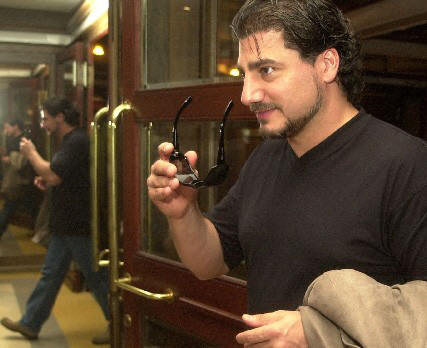 With
his performances in Samson et Dalila presented by
the Teatro Colón, José Cura gave ample evidence to the Argentine
public of why his name is where it is in the world of opera. Nevertheless,
and not to lose the habit of being pleasantly surprised, an important
moment still remains on his agenda before the tenor returns to Europe.
It is a question this time of the world premiere of his Sonnets,
based on the poems of Pablo Neruda, that take place tomorrow in
the program for the Mozarteum of Rosario, which is celebrating its
Silver Anniversary with a concert by José Cura and pianist Eduardo
Delgado in the Foundation Astengo. The two, acquainted through
the CD of Argentine music Anhelo, will offer a chamber
recital, including songs from the recording, works for solo piano,
and the pieces composed by Cura. With
his performances in Samson et Dalila presented by
the Teatro Colón, José Cura gave ample evidence to the Argentine
public of why his name is where it is in the world of opera. Nevertheless,
and not to lose the habit of being pleasantly surprised, an important
moment still remains on his agenda before the tenor returns to Europe.
It is a question this time of the world premiere of his Sonnets,
based on the poems of Pablo Neruda, that take place tomorrow in
the program for the Mozarteum of Rosario, which is celebrating its
Silver Anniversary with a concert by José Cura and pianist Eduardo
Delgado in the Foundation Astengo. The two, acquainted through
the CD of Argentine music Anhelo, will offer a chamber
recital, including songs from the recording, works for solo piano,
and the pieces composed by Cura.
The history of these Sonnets
was born in 1995, when José sang in Palermo (Sicily) in the Zandonai
opera Francesca di Rimini, based on the legendary
lover Romeo and Juliet. Someone—he never knew who—left a book
of Neruda poems in his dressing room with an anonymous dedication
that says, “For you, who sing of love, words of love.”
On opening the book, according to the tenor, the first thing he
read was the last sonnet that says “When I die, I want you hands
on my eyes” and he was so moved by emotion that the music was composed
almost at once in a single moment of inspiration. He continued
with “My love, if I should die and you should not” until the commitments
and the dizzying life of the singer on the rise forced him to put
all the beautiful ideas and sensation in a drawer not to be opened
for several years, until, in 2006, the composer firmly decided to
finish the project and to choose the sonnets that, he felt, still
remained to complete the cycle. The author of the dedication,
very romantically, has never been revealed.
In Buenos Aires, La Nacion met with
Cura and Delgado. The pianist referred to the work as personal
music whose harmonies declare a proper and elaborate language.
“They do not look like anything else. They are interesting
works and with their polyphonies and counterpoints, they are also
difficult. It gave me pleasure to work with them because they
demanded I study them and because I feel I can relate with José’s
musicality,” Delgado explained.
In turn, Cura added comments that
referred to the composition of the Sonnets.
-Are they composed for your own
voice?
They are written for a high baritone because
I consider the voice of a baritone the most beautiful one for chamber
music, as in that of the mezzo for a woman. The middle zone
is where the voice flows more sweet and less forced. This
reflects my own vocals: a dark voice with the ability to sing
high notes. It is not possible to sing them like normal songs.
They are intellectual, which means they cannot be learned by hearing
them, it is necessary to be able to read and to understand in depth
the music that, in reality, is a long duet of piano and song.
- How did you transfer the musicality
of the word to that of the singing voice?
-The poetry of Neruda awaken the
senses, is theatrical in an old-fashioned way. Each word is
loaded with theater and drama. The options were to write melody
accompany the words or to write music, but with the sensory wealth
that opens us up to Neruda’s fascinating world. The complexity of
the music is related to that of the text, so that it is not necessary
to listen to distill pure melody. One must concentrate in
the poems, leaving the melody to present itself alone.

NDO is privileged to have as its
Patron, internationally renowned tenor and conductor
José Cura. Maestro Cura, originally from Argentina
and now based in Madrid, has a deep interest in finding ways
to help younger singers gain experience and so help further
their careers.
This is a unique
opportunity for music lovers from Devon and the UK, to enjoy
the passion, commitment and artistry that Maestro Cura brings
to everything he does. In addition to the Masterclass, there
will be a garden party Concert performance
of opera arias and ensembles given by all twelve singers in
the afternoon of May 7th; Maestro Cura will then present the
prize. On the morning of May 6th, Anthony Legge
(Director of Opera at the Royal Academy of Music) and
Alex Ingram, conductor and music coach, will
be bringing their expertise in working with opera accompanists
to a Repetiteurs' Seminar. Devon singers will have an opportunity
to take part in this seminar.
The performances will be held in
the charming Jubilee Hall of Stover– an independent school set
in its own 60 acres of beautiful grounds in the glorious Devon
countryside. Stover is situated on the edge of the Dartmoor
National Park, just a few miles west of the market town of Newton
Abbot and a mile from the main A38 carriageway between Exeter
and Plymouth.
“I truly
hope that New Devon Opera enjoys economic success
which will allow the company to develop in a strong
and confident way.
" José Cura
Opportunities in
the UK to see or hear international opera singer and conductor,
José Cura, are rare but on 6 May 2007,
Maestro Cura will come to Devon to give a public Masterclass
with twelve talented singers he has chosen – and who
will represent some of the best of today's young opera singers.
A compelling actor
and charismatic stage performer, Cura has been featured in numerous
telecasts of opera productions and concerts from venues around
the world. Blessed with a rich burnished tenor voice, mesmerizing
stage presence and abundant charm, José Cura has been thrilling
audiences since he first burst onto the international music
scene. His intelligent, insightful – sometimes controversial,
but always intense and unforgettable performances - have made
him a household name to opera lovers the world over.
But this success
did not come easily. As Cura himself puts it:
“I moved from Argentina
to Europe in 1991. I worked for two or three years in restaurants
– my wife worked with me, washing dishes – and we did many things
a lot of people wouldn't think about doing. We had a very hard
life. We lived in a garage for one year because we couldn't
pay the rent and we heated the garage with a small fire, with
me gathering wood in the middle of the night!”
It is this
memory that drives his desire to help promising singers to gain
the skills and experience needed to succeed in the notoriously
tough and challenging world of international opera. Working
together with New Devon Opera – the south west's
resident professional opera company, of which he is Patron –
the aim is to build this project to become a regular national
event in Devon.
This is a unique
opportunity for music lovers from Devon and the UK, to enjoy
the passion, commitment and artistry that Maestro Cura brings
to everything he does. In addition to the Masterclass, the re
will be a garden party Concert performance
of opera arias and ensembles given by all twelve singers in
the afternoon of May 7th; and, Maestro Cura will present a prize.
On the morning of May 6th, Anthony Legge (Director
of Opera at the Royal Academy of Music) and Alex Ingram,
conductor and music coach, will be bringing their expertise
in working with opera accompanists to a Repetiteurs' Seminar.
Devon singers will have an opportunity to take part in this
seminar.
The performances
will be held in the charming Jubilee Hall of Stover– an independent
school set in its own 60 acres of beautiful grounds in the glorious
Devon countryside. Stover is situated on the edge of the Dartmoor
National Park, just a few miles west of the market town of Newton
Abbot and a mile from the main A38 carriageway between Exeter
and Plymouth

An international star, José Cura has received many awards
and prizes for artistic excellence. In 1994, he was awarded
first place at the International Singers Competition (Operalia)
as well as the Prize of the Public; in 1997 he was awarded the
Abbiati Award (Italian critics' prize) for his performances
in two Mascagni operas - “Iris” in Rome and “Cavalleria Rusticana”
with the Ravenna Festival- and in “Il Corsaro” in Turin. A year
later, he earned the Orphée d'Or from Académie du Disque Lyrique.
In 1999, the Buenos Aires ' CAECE University awarded him the
distinction of “Professor Honoris Causae” and the city of Rosario
the one of “Citizen of Honour.” He received the ECHO award for
Sänger des Jahres from the Deutscher Schallplattenpreis in 2000.
In 2000, Cura was knighted “Chevalier de l'Ordre du Cedre”
by the Lebanese Government.
Cura was honored as the Best Artist of the Year from Grup
de Liceistes in Barcelona in 2001, received the Ewa Czeszejko
- Sochacka Foundation Award (Poland) in 2002, and the Sirmione
Catullus Prize honoring him as one of the great singers of opera
in 2003. In recognition of his artistry and in acknowledgement
of the great affection and high esteem in which he is held in
the country, José Cura was awarded “Citizen of Honour” by the
City of Vesprem, Hungary, in August, 2004.
Year 2005 proved a banner year for José Cura. In November,
The British Youth Opera (BYO) announced that he had accepted
the position of honorary Vice President of the company.
This appointment, made in recognition of Cura's dedication to
teaching, mentoring, and supporting young talent, adds his name
to a distinguished list of benefactors including such luminaries
as Dame Janet Baker, Dame Felicity Lott, and Bryn Terfel.
Cura also became Patron of New Devon Opera. The company,
established to promote and tour opera within Devon and the South
West of England, is a non-profit organization that promotes
charitable and educational productions and concerts.
In
December 2005, Cura became the second recipient of the City
of Piacenza-Giuseppi Verdi award in recognition of his contribution
to classical music as both singer and conductor. The award,
individually designed to honor the winner, is given annually
to an artist of international significance who has inspired
critical approval and audience affection. That Cura receives
the recognition so soon after its establishment is tribute to
his reputation as one of the greatest tenors of the age, his
artistry on the podium, his warm relationship with fans, his
personal support of young musicians and his on-going involvement
in charitable organizations.
Learning from a Maestro
By Laura Joint
World famous tenor José Cura comes to Devon to hold
a masterclass with 12 lucky singers.
Internationally renowned opera star José Cura will be in Devon
in May, to hold a masterclass with 12 singers.
The Argentinian-born tenor, now based in Madrid, agreed to
take the classes after becoming patron of professional touring
company, New Devon Opera. The opera company, based in
South Devon, publicised the project in 2006 - and more than
100 singers from all over the world have applied to be selected.
That number will be whittled down to around 25 for auditions
in London on 24-26 April. José Cura will then choose the final
12 who will be in the masterclass in Devon on 6-7 May.
It's hoped the José Cura Opera Project will unearth a new
generation of opera stars.
The public will be able to watch the classes at Jubilee Hall,
Stover School, near Newton Abbot on 6 May. Then, on 7 May, the
12 will perform mainly ensemble pieces at Stover School - in
front of an audience including the Maestro himself.
The tenor will present the singer who impresses him the most
with a special prize.
José Cura is in England in April and May, as he is performing
in the Verdi opera, Stiffelio, at the Royal Opera House in London.
Linda Hughes, chair of New Devon Opera, says it's a real
coup to bring José Cura to the county.
"This really puts Devon on the map," Linda told BBC Devon.
"People from all over the world have taken an interest in this."
Linda hopes that the event can be repeated in the future
- but on an even bigger scale. New Devon Opera was formed in
2004 and auditions for performers locally and nationally. It
is a not-for-profit charity.
In a classic case of 'if you don't ask, you don't get,' Linda
approached José Cura about the role of patron.
"I was speaking to him at the Royal Opera House and I asked
him. And he said yes!".
Debut of José Cura as Stage Director
EFE
El Universal
Berlin
Thursday December 27, 2007
(gist)
The Argentine tenor will direct Verdi’s Masked Ball next 17 May in
the German city of Cologne
Argentine tenor
and conductor José Cura has decided to explore new artistic horizons
and will try his luck as a stage director—but without abandoning
singing for the simple reason that “singing pays my bills.”
"As a director
I am a novice and therefore not paid well. In fact, my actual pay
as director for the entire production is more or less what I earn
as a tenor in a single evening," revealed Cura in an interview with
the magazine "Opernglas."
Cura, living for
years in Spain, makes his debut as director on 17 May in Cologne
(western German), and the production chosen for this initial effort
is the opera Un ballo in maschera (A masked ball) by Giuseppe
Verdi.
“Germany is an
ideal place for any producer, because the public here is more open-minded
than almost anywhere else,” maintains Cura, who nevertheless feels
comforted that “my big challenge as director is to achieve a balance
between modernity and tradition.”
The musician considers
this experience as “one more step in my career, just as many actors,
after years of experience, decide they want to be on the other side
of the camera,” but he insists that not only will he not abandon
his role of singer but he will also expand his repertoire.
Among Cura’s future
plans is Parsifal by Richard Wagner, an opera he will sing
in concert version in 2010 at the Deutsche Oper Berlin that offers
a major new challenge for the tenor--and not just because, in this
case, he must sing in German.
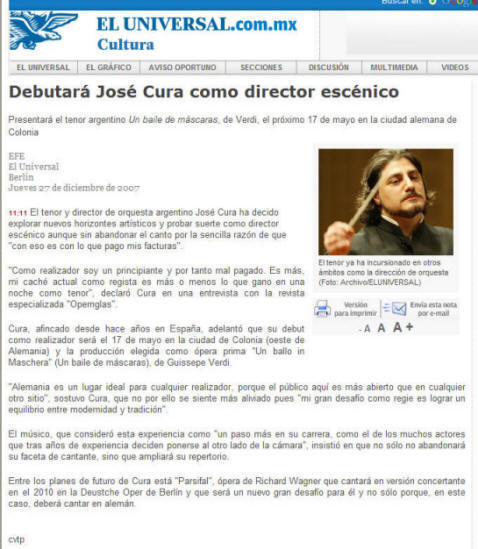
José Cura’s Debut as a Director
Der Standard
27
December 2007
(gist)
Hamburg - The Argentine star tenor and conductor José Cura now
tries being an opera director. On 17 May 2008, the 45-year-old will
make his directorial debut at the Cologne Opera with Verdi's "Masked
Ball."
"Of course, Germany is a wonderful place for
directors, as the audience here is really much more open than elsewhere,"
said Cura in an interview with the magazine "Das Opernglas." However,
this also serves as an excuse for the director who ignores the balance
between modernity and tradition: "That is for me the big challenge."
Acting Interests
Acting is of special interest to him, said the world-renowned singer.
"Directing is just the next step - similar to the famous movie actors
who, after years of experience with good directors, change sides.
In cinema it seems much more common and accepted than in musical
theater."
His main focus will continue on the singing,
assures Cura. "For a very simple reason: With the singing I pay
my bills." As a director he is a novice and is paid accordingly.
"My current job as a director - for the entire production - corresponds
more or less to what I earn as a tenor in one evening."
In the future the
singer will challenge himself with Wagner roles. In 2010, he will
sing “Parsifal” in concert at the Deutsche Opera. "This is my first
step to see how it goes." Wagner excites him on the one hand, but
frightens him on the other because of the language. (APA / dpa)
“The flag is
our identity: It is not the DNI* but the DNA of each
one of us.”
La
Capital
June 2007
José Cura says
that singing at the Anniversary Celebration of the Monument
was something very special. The tenor from Rosario,
who now lives in Europe, admitted that he felt flattered
by the call.
Rosario opera
singer José Cura joined in the festivities marking the
50th anniversary of the National Monument
to the Flag with a rendition of the “Canción a la bandera”,
which is an aria from Héctor Panizza’s opera “Aurora”.
Visibly moved, the tenor, who lives in Europe where
he has forged a solid career for himself, talked with
La Capital, confirming the saying that your homeland
is in essence your dialog with the land of your childhood:
“When I close my eyes, the first thing I see is my childhood
home, the neighborhood of those early years”, the artist
confessed.
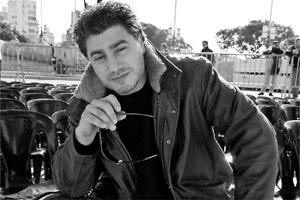 Applauded
by the critics for his interpretations of Giuseppe Verdi’s
“Otello” and Saint-Saens’ “Samson”, Cura is also recognized
for being the first artist to have sung and conducted
the same work simultaneously as well as being the first
to combine vocal with symphonic performances in the
same concert. Applauded
by the critics for his interpretations of Giuseppe Verdi’s
“Otello” and Saint-Saens’ “Samson”, Cura is also recognized
for being the first artist to have sung and conducted
the same work simultaneously as well as being the first
to combine vocal with symphonic performances in the
same concert.
Emphatic, commanding
and loquacious, Cura steps for a moment out of his role
of operatic artist with international stature and enters
onto the path of confession admitting that to sing under
the circumstance that brought him here is somewhat different.
--What does
it mean to you to sing at the Flag Monument?
--To sing the
“Canción a la bandera” at the Monument is a bit overwhelming.
It’s not an ordinary concert; it’s about this place,
this particular spot and the song of it. There can be
nothing any more intense than that.
--Does this
place bring back memories for you?
--It’s not only
about memories but also about a sense of identity. The
Flag Monument is number one in what one identifies with
as a Rosarino. Perhaps number two is Newell’s and Central….After
having sung “Canción a la Bandera” in England, in Japan
and in Australia, it is something else altogether to
sing it here.
--What does
the flag mean to an exile?
--No, not an exile
because that implies a person who leaves with a kick
in the backside, so to speak. This man is not an exile
but an emigrant. Just as our grandparents came here
from far away in search of good fortune, many of us
left from here to go far off in search of ours. And
the flag is a means of identification, it’s our identity,
and it isn’t even just the DNI—it’s the DNA of each
one of us.
--Eight years
ago, you sang in this very spot before a crowd, and
we were not able to find out what kind of aftertaste
that experience left. What happened on that occasion?
--We were expecting
5,000 people and 40,000 came. It was an extraordinary
event, full of warmth and affection. It’s a tremendous
memory.
--When you
close your eyes and think of Rosario, what do you see?
--The first thing
I’m likely to see when I close my eyes is my childhood
home and the neighborhood of those early years. It’s
a place that has changed very much. Clearly, thirty
years have passed….
--The reason
for this visit to Argentina is the presentation of other
programs, like those you are going to give with the
cast from the Colón at the Coliseo of Buenos Aires Theater.…
--No. The initial
reason for this visit was the celebration of my parents’
fifty years of marriage, an anniversary that coincides
with that of the Monument. Later, it became known that
I was coming since it is practically out of a question
that no one is going to find out when one moves about,
and from there, the invitations began to arrive. In
this case, they are especially appreciated because taking
part in this celebration is something special. Afterwards
the one from the Colón came up and the concert in the
Mozarteum here. In the end, I’m working more during
this vacation than I do when I’m at home.
--What has
been going on with your “Aurora” CD?
--That was a disc
dedicated to my country which, to be precise, does begin
with the “Canción a la Bandera”. I recorded that CD
in 2001 and dedicated it to Argentina, but it was never
sold in the country. We are not managing to set up agreements
with any distributor. It was a CD dedicated to this
country and sold throughout the world, but here, it’s
sad to say, no one knows about it. To mark the occasion
of the 50th anniversary of the Monument,
the City of Rosario has entered into an agreement with
my company to buy 5,000 discs at cost. We are not making
anything, but at least, in a symbolic way, it will be
found at this commemoration, when it should have been
here all along and should have sold thousands of copies
simply because it is dedicated to Argentina, regardless
of whether the artist, who made it, is liked or not.
When a disc is dedicated to a country, it is (really)
dedicated to its people. Dedicated to my fellow Argentineans,
it is a CD to which they have no access. Market considerations
take precedence over sentimental ones. Let’s hope that
5,000 copies are not enough.
*DNI-Documento
Nacional de Identidad
Translation: Monica B.
|
A Conversation with José Cura
Entre Notas
María Josefina Bertossi
When José Cura came down punctually to the
lobby to give us his final interview before returning to Europe,
I thought it was gracious of him not to have canceled after the
effort of the previous night’s concert when he sang while suffering
from an untimely cold (for a singer, a cold is always untimely).
Besides, it was a very cold 9 July (Rosarinos hardly remember when
it was really cold) and many expected snow. I will never forget
when it snowed in Rosario a few days before my entire family was
involved in a car accident and we saw the snow on the windows of
the hospital, recalled the Rosarino musician (singer, director,
composer) who now lives in Madrid but works in capital cities around
the world.
“Have you ever tried to pick a flower
with a glove?” was the first thing we heard from José Cura
from the stage. The opening question was an attempt to explain
how it feels for a musician to sing with a cold and, in addition,
to share the recital and the respiratory affliction with the pianist,
Rosarino Eduardo Delgado, also ill with a cold.
The audience filled the auditorium of the Teatro
Fundación for the concert on 8 July, the main event of the 25th
anniversary of the Mozarteum of Rosario, which had been announced
as a program of chamber music, a difficult assignment considering
the health (of the artists) since this repertoire needs vocal subtleties,
but we can attest that the artist carried it off with experience
that comes from the position, interspersed with enjoyable and sincere
comments.
“Last night I took a beating and this morning
I rose voiceless. Anyone who isn’t in this career has no idea
of the significance of singing with bronchitis. I did well
and believe those who saw it liked it,” Cura said with satisfaction.
There were those who hoped you would sing opera
even though chamber music had been announced.
The program said chamber music. I
would love to do all of my concerts this way. I do not enjoy singing
arias in concerts because opera in concert is monastic and the audience
always expects me to sing the same thing. Besides, opera cannot
be done with just a piano and for a concert as important as this
anniversary it had to be a chamber concert with piano.
The auditorium of a theater can be a good thermometer
to measure the relationship between an artist and the public, and
it is there that we listened as some talked about this singer.
José Cura is the full name of an international artist, but those
who knew him in Rosario, in Fisherton, and from childhood they have
called him what they always called him: José Luis.
José was designated by the exigencies of
the program space because José Luis is too long. Only in Rosario
do they call my José Luis.
The concert represented the world-wide release
of Sonetos, a work based on the verses of Pablo Neruda with
music by José Cura. The composer explained that once
in a dressing room somebody left him a book of poems by Neruda,
which he fortuitously opened to the page of the sonnet that begins
“When I die, I want your hands on my eyes.”
The premiere was not assured, however, since
authorization from the heirs of the Chilean poet arrived only four
days earlier.
Here in Rosario we saw you and we listened
to a singer, composer and director. How difficult is it on
the international level to impose the role of director and composer
on the figure known as a singer?
I never impose it. I propose.
Those who like the proposal accept it, those who do not, don’t.
I conduct a lot and in very important locales such as the Vienna
Opera and when you direct the Wiener, you conduct one of the significant
orchestras in the world, the same is true in London with the London
Symphony. There is never this sort of question because
when one stands in front of the orchestra for the first three minutes
the musicians see the tenor but then no longer, because to move
forward without a professional musician [standing on the podium]
would not be possible. The preconception comes from the press,
which does not understand and uses tenor as a bad word. To
say someone is a tenor is like saying that she is a woman rather
than a feminist, like referring to a stupid individual with no rights.
The buzz surrounding the concert was the announcement
of the ‘music’ of José Cura.
Because of it, the highest points in the
entire night were the sonnets, twenty minutes of music of very strong
intensity and that says a lot. When you write something people
have not felt, makes no sense to them, they start fidgeting and
begin coughing. Therefore, it was very emotional, and one
must not forget this was a premier, that while the audience was
listening, and it is complicated [music], they were already analyzing
it and enjoying it. There was a lot of work (in composing),
hard work with theatrical awareness. Every harmony and every
melodic turn tried to continue the poetry of Neruda.
In our city, there is a lot of music and many
musicians who feel dissatisfied with what they can and cannot do.
There is something everyone needs to know:
nobody comes to seek you out, and this is true not only in Rosario
or in Argentina: it is that way in the world. Youth
has a tendency to say ‘I am the best in the world but no one knows
it.’ I know many cases like that, both colleagues and students,
who come to me and say ‘Maestro, what do I have to do?’ and I tell
them they must go out and bang on doors, and they say to me ‘But
what happened that made you so lucky?’ Luck? I
have spent more than thirty years doing this and only in the last
ten or fifteen years have I begun to see the fruit. Recently,
in the last five years of my life, I have been transformed by an
event that is very easy to obtain—the event of maturing.
Sometimes, someone will ask me how it feels
to be famous and I say nothing at all, because it is so easy to
become famous. Nowadays, with the mass media, being a celebrity
is almost free. The difference is to achieve the sort of fame
that is transformed into greatness.
Sometimes the decision to leave or to stay
can be very difficult.
Emigration is always difficult. Even
though now it is easier for us than for our grandparents, that does
not stop it from being traumatic. When you move to a country
where nobody greets you, nobody knows you, and when you present
your work visa they look at you badly simply because you are Argentine
or because you are a foreigner, and there is nothing you do to avoid
it, and that it what happened to my wife and me. There were
many people who told me not to leave but if I had a contract I would
not have gone. For example, in Buenos Aires some singers
asked me how they were singing and I said good. “Well, then,
if you have a contract you can send it to me.” No, it doesn’t work
like that.
The concert ended with “Aurora” by Hector Panizza,
the same aria that was sung together with the audience at the Monument
to the Flag, the same one which he also occasionally surprises the
English audiences. Despite the respiratory problem that appeared
in the last note of the aria, when the audience asked one more from
him, Cura , with humility, agreed to one last one.
You have a work dedicated to the Malvinas.
What has happened to it has not be produce?
I knocked on two or three doors and they were
not opened, nobody seemed interested in it. Perhaps it was
not the moment. When I wrote it in 1984, I was 22 years old
and we were entering a democracy. It is a work for two choirs,
with the dream being there would be an Argentine choir and an English
choir, quartet soloist, a children’s choir, an orchestra—a very
big, very expensive work. I wrote it in ’84 and there it remains,
and if some day I decide to do it perhaps I will have to revise
it, because many years have passed and with them a lot of experience
has been gained, or maybe not, because perhaps it would be nice
to show what a boy of 21 wrote at that age.
Interval Drink with José Cura
Classic FM
Sarah Kirkup
May 2007
What are you drinking?
A Spanish red wine from my beautiful cellar!
You're the patron of New Devon Opera...
The point of the project is to create an operatic activity in
Devon. We have auditions this April and, depending on the quality
of the singers we get, we'll see how far we can go.
Why do you want to help?
I believe in the continuation of the human species! Also, I
am known for being a rebel, and it would be ridiculous to have fought
all your life to transmit your opinions and then to die without
leaving your legacy.
You're in Stiffelio at Covent Garden from
20th April...
With Stiffelio, I am allowed to be a dark character, and I like
that. The one-dimensional thinking of most tenor roles is exhausting
- it's so limiting having to behave like the beautiful lover all
the time!
Acting's important to you...
You have to be believable. The best compliment I had was at
the end of Otello, when an epileptic came up to me and said: "I
saw myself in you". I had studied for a long time the reactions
of epileptics; the ability to observe has to be the main quality
of any actor, I think.
You conduct as well...
Singers respond well to me as a conductor because if there's
anyone who knows what the hell they're going through, it's me. I
conduct and sing at the same time, but only encores; a whole concert
would be a killer!
What's your next ambition?
I'd love to sing under the baton of Simon Rattle. I like his
fresh approach to music.
José Cura:
Titan of the Opera
Le Nueva
He has just arrived in
the country to dazzle us with his talent. This Argentine
tenor, who has already triumphed in Europe, will sing today
in Rosario.
[gist translation]
José Cura is one of the tenors in greatest
demand on the international stage and also one of the most popular
figures in classical music, but he does not agree with such high
praise. His is a multifaceted talent (singer, conductor, composer,
guitarist, régisseur and businessman), impelled by a spirit always
eager for creativity and challenges, leading him on a journey toward
artistic satisfaction. Always on the edge of frenzy from this
fascinating life, Cura’s temperament seems to have been forged to
enjoy facing risks, as a real titan, and not in vain has it been
written that his is one of the greatest voices of the century.
For all that, and in spite of his youth, José Cura has already joined
Olympus as one of the mythical singers [sacred monsters] of the
21st century.
An anticipated return home
He returned to Argentina, like one of our more
prodigal sons, for a concert production of the opera Samson et
Dalila by Teatro Colon, but most of all to his audience, to
their affection, and to his family. “After 16 years in Europe,
my house, in a physical sense, is no longer in Argentina.
But my feelings, my memories and my most intimate experiences, these
will always continue to remain in my country. I am happy to
return and meet again with the people with whom I grew up in an
artistic sense. I want to see the countrymen with whom I was
lucky enough to share the ‘kindergarten’ of the stage,” recounted
José in a talk in Berlin, Germany, not long before he returned home.
And then, as it could not otherwise be, speaking of reunions inevitably
means speaking of memories and the conversation, with Cura showing
a less familiar side, could not help but begin with his beloved
hometown, Rosario.
Memories of Rosario
“The oldest images I retain of Rosario,” he
recalls, “are the first two or three days of primary school.
I do not know if that was in the LaSalle or San José School, because
after three days my parents withdrew me to enroll me into a new
school, one that had just opened by the brothers of Saint Patrick
of Ireland. We were the first class. There were barely
two rooms and a patio. My class was also the first class to
graduate. Today it is a great school, one of the biggest in
Rosario. The last time I was in Argentina, in 1999, I visited the
school, I met with the students and I encountered a couple of my
former companions. So there is where I begin my memories of
Rosario, in the little school of St Patrick. In reality so many
years have passed…and it is only now when I return that I perceive
this passing of time.” The imaginary route soon pass by his
old house near the river and the second one in the first residential
district of Rosario. Almost immediately, and understanding
the strong connection that joins them, music arrived and, of course,
with it the beginning of the history whose future chapters would
cause him to do nothing less than conquer the world. “Music
always formed part of my family. My father played piano well
enough. I have a very clear image of when, as a boy, I watched
him, seated at the piano, playing Chopin and Liszt. Then he
tried to imprint on me his own story as a boy, sending me to study
piano with a teacher in the neighborhood. But the initiative
did not work.” After a few months, the teacher dismissed his
young student with a brief note sent to his parents, in which he
explained, sadly, that it would be best to wait for a time when
an interest [in music] developed in José that had, to that moment,
not been demonstrated, and at the same time he recommended looking
for a hobby that appealed to the young man, because musical sensitivity
did not seem strong in him. “It was probably true at that
time, and the best example was that, from that moment, I began to
devote myself to rugby.”
Musical Beginnings
But when did he discover his extraordinary
vocation in music and what was that cause that permanently awoke
his sensibilities? Oddly and without warning, that event was
the result of an examination to enter secondary school. “I
was there with one of my best friends. He played his guitar,
the Beatles were fashionable, and he created a lot of interest.
I learned to play immediately and the experience awoke the calling
that had been sleeping within me.” This was the friend who
gave him his first set of tools. Soon, his father contacted
Ernesto Bitteti (an old family friend), and Bitteti recommended
a professor with whom to study seriously. That began the history
with the guitar. “With my exuberant and extroverted personality,
I was like a time bomb. I learned to play well enough, although
always somewhat hampered by my very large hands…the things were
causing me quite a lot of work but I managed to have good results.
The guitar, though, very quickly made me feel small, not in a technical
sense but in the fact of it being a very introverted instrument.
For that reason, I entered the Conservatory in Rosario to study
conducting and composition.”
One of his teachers—who at the time was the
director of the conservatory—gave him the advice that changed his
life forever: “His comment determined who I am today.
He said to me: To become a better conductor and composer, you will
have to study singing.’ Indeed, following his advice I began
singing opera and ended up becoming a singer.” Everything
that happened after that is more or less well-known history; in
1983 he auditioned for the Teatro Colon, in 1991 he left for Europe,
where success and fame waited for him with open arms and rewarded
him for years of sacrifice in pursuit of his dream.
Today, and for some time, José Cura has been
one of the biggest names on the international music scene.
He is an exceptional professional who believes art is a profound
path in life.
“One of the characteristics of classical music
is that it is one of the few forms of art that remains, between
one person and another, a single thing: to the work of art
itself. We interpret that work live, without networks and without
lies. That artisan concept is probably the most important
aspect of music and, in my opinion, why it continues to work, although
as a spectacle it may be a little anachronistic. It is an
art of skin and bone, fact with flood, sweat and tears, and for
that reason it is an expression that stays alive. It is my hope
that all people, at least once in their lives, are touched by this
sensation, so powerful and so extraordinary.”
Love of Cerulean Blue and White
In one of his latest disks, called Aurora,
José Cura included a special dedication to ‘his country’ and printed
the Argentine flag on the cover. After launch of that record
(2002) Cura said, “I want my people to know that, for the entire
world and with much pride, José Cura is an Argentine tenor.”

Interview with José Cura
LaPorta Clássica
Ofèlia Roca
GIST TRANSLATION
Ofèlia Roca:
What is the daily life of an opera singer like?
José Cura:
Pretty much that of any other
person, I imagine. However, since I am a very atypical case,
I cannot offer a very reliable opinion. Perhaps a singer who dedicates
himself only to opera has a more orderly life, more aseptic in the
sense that he can take better care of himself. Personally,
since I devote myself to many things such as conducting orchestras,
composing, and running my company, my life is quite complicated.
Last night there was a late performance so today I could have slept
until noon, but now I am on my way to Madrid because I have to check
a few contracts and I have a few work meetings to discuss projects
that we will be doing soon. If the day had 29 hours it would
not be enough for me. This is a question you have to ask of
an opera singer. . . (laughs)
OR: But you
are an opera singer! Is there any negative part of your work?
José Cura:
All work has its negative
aspects. In mine, for example, the daring of wanting to be
yourself, to create, to give your own reading to a character is
little tolerated. For the peace of mind of many…you have to
be like this or that earlier artist whom the audience liked.
It is quite a strange thing to handle objectively. One of
the critics of Andrea Chénier said that Cura’s Andrea Chénier
is very his, very Cura, and I said to myself: Can I imagine
this is positive? No?
OR: Yes,
it is!
José Cura:
Although I do not know if
it were written in a positive spirit, it is for me, and very much
so. If they wrote that Cura’s Andrea Chénier was very
Domingo or very Carrerras, it would be bad for me because I would
not have created anything new and bad for Plácido and José because
to avoid risks I would have been copying them. I believe that there
is a big part of the opera theater that still needs to make settlement
with the respect to the passage of time. The ordinary public
does not want to go to the theater to see acts of 40 years ago.
Vebal actors who do that would seem like terrible professionals.
If we asked singers to sing like Caruso, it would be like asking
actors to act like Sara Bernhardt. We would surely laugh since
they were of other times and what was then brilliant is today comical.
[…] To answer the question, I make a living from a beautiful
profession. This makes it almost ‘forgettable’ that negative forces
always exist.
OR: They
call you the singing conductor. Which passion began earlier?
José Cura:
It is not a question of passion,
but of profession. Being passionate is very nice but it often
makes you lose objectivity: hot heart and cold mind, that
is the key to survival. Conducting the orchestra is the profession
I have lived with the longest.
OR: Before
singing?
José Cura:
I trained as a conductor
and a composer. The first time I stepped on the podium I was
15 years old. On the other hand, the first time I sang as
a profession, with a seriously paid contract, I was 28 or 29 years
old.
OR: So you
began to study singing as a result of being a conductor.
José Cura:
Yes, as a complement to a
conducting career, as well as studying other instruments.
I began to sing in semi-professional choirs without a defined vocal
technique. When I finally began to practice and discovered
I had a good voice (laughs) I said to myself: walk,
look where!
OR: When
you sing, do you think as a conductor and do you conduct as if you
were singing?
José Cura:
When I conduct, I phrase
as a singer. I believe a singer is lucky to be both the instrument
and the instrumentalist. Great ‘phrasing’ by an instrumentalist
does not stop because an instrument is outside the body. The singer,
however, expresses with his body and it is a privilege and if you
manage to pass it on to the musicians in front of you it does make
a big difference in the final result.
OR: Talk to us about the character of
Andrea Chénier that you have been performing since the beginning
of your career and the difficulties that the tenor who sings this
role must endure.
José Cura: It has enormous vocal
difficulties, because it is a role that is quite badly written.
Giordano was a great melodist; in fact, what is surprising in
Andrea Chénier is that it is exactly that: to pick through these
incredible melodies, unfortunately, for moments of great inspiration.
When the melody is not the main thing, Giordano fell down a little
on compositional structure. Perhaps for that reason he is not considered
at the genius level of Verdi or Puccini. His melodies are
sometimes so surprising that they can make more of an impression
than Verdi or Puccini, but just a little bit gets into it and this
makes interpretation very difficult. There are moments when the
work works by itself and others when it has to be elevated by the
stage work and through interpretation. Sometimes I have the
impression that Giordano reasoned more like an instrumentalist than
a singer; for that reason some of his lines are ‘very instrumental’
in his tessituras and extensions with the difficulties that the
singer must endure. They say that when Giordano went to see
the premier, he said when leaving: My God, what I have written.
But it cannot be sung! As a result, I will go so far as to
annotate the score to cut some piece or to lower a tone if necessary.
But if this happens in a work from the repertoire like Andrea
Chénier, you cannot even imagine what is like to sing a rare
opera of Giordano like Siberia. The main scene for
the tenor (I can assure you of this because I have recorded it)
is a killer. I do not even want to think of what it must be
to sing the entire opera. For a while, Fedora was done
often because Domingo and Carreras sang it a lot, and I even did
many performances of Fedora but I stopped doing it.
Almost exclusively, any Giordano that is done is Andrea Chenier.
OR: The Liceu
has not done it since season 1985-1986
José Cura:
It is not done often, as
we were saying it is vocally very difficult and not many singers
have it in their repertoire. The part of the baritone is the best
of the work, the most interesting dramatically speaking, because
is has various colors and evolves with the character throughout
the opera. Maddalena, however, is a more ordinary lírico-spinto
soprano role, in the sense that it does not have big vocal stumbling
blocks—no more than other operas of the genre, I mean—with a big
aria that is very famous for being music in the movie Philadelphia.
The tenor is tremendous from the vocal point of view and perhaps
for that reason this work is performed so rarely. Although
the Liceu has a number of performances there are three different
casts, all three are excellent. Well, speaking about the tenor,
my contribution is a little less good than the others….
OR: It does
not seem that way to me! All the roles that you interpret
must contribute something to your person, since you put yourself
into its skin and psychology. Is there some you appreciate
more for some reason?
José Cura:
Most of the characters I
portray are horrific human beings: if one is not a traitor (like
Otello), then he is a degenerate (like Pinkerton) or one who sells
out (like Radamés) or is a violent drunk (like Canio); these
I do not identify with….Perhaps the two roles that I do identify
with, from the point of view of personality, are Andrea Chénier
and Mario Cavaradossi: two similar characters who stand up
to defend [what he believes in] and die because of it. The
histories look alike, the formal structures of the two operas (Chénier
and Tosca) are very similar as well: the location of
the arias, the context of the duets, are practically identical.
The arias E lucevan le stelle
and Come un bel dì di maggio
are siblings…but although Come un bel dì di maggio
is the ‘older’ one because
Andrea Chénier precedes
Tosca by four years,
Tosca is the seamless masterpiece
that Andrea Chénier is
not. Chénier and Cavaradossi are two positive characters in
the human sense because they die for what they believe. Perhaps
for this reason I identify with them. Although without any
desire to die in a literal sense, you die every time you go on stage
to do what you must do, asserting your right to be ‘yourself.’
And just as in Chénier the guillotine seals the death of the poet,
at the end of a performance the sound of approval by the audience
is, by analogy, the guillotine that could make the difference…this
sword of Damocles is perhaps one of the most critical moments for
an artist. The theater is not a football pitch to release
frustrations but a meeting place for the exchange of cultural messages.
If you do not like it, it is not necessary to whistle at the end,
it is enough to be silent or, if you know beforehand how it goes
(because you know-and do not like—the artists or because the production
was promoted properly) simply don’t come. So many of the people
who whistle then come to ask for autographs…there is a lot of sickness!
OR: Do you
have any new roles in your repertoire?
José Cura:
I am already studying
Le Cid
by Massenet. Yesterday I started to get into the libretto and was
going out to look for material, taking advantage of the fact that
Spain is where most of the documents about this legendary person
abound.
OR: Do you
study the time and history of the operas in which you sing?
José Cura:
Yes, when they are
operas with storylines and personnel whose historical connotation
can influence interpretation.
OR: Have you ever tackled a musical project
that was a true challenge?
José Cura:
All, because the moment you
come on the stage is always a challenge, you are always being tested.
Young singers say it is very hard to begin auditioning for a role.
Compare that to the pressure of having to ‘audition’ every time
you walk on stage, not only for a single person but rather for a
thousand or more, that one ends up being a walk….
OR: How do
you see the present opera world and what do you think will be its
future?
José Cura:
Opera is currently in a great
crisis. But it is not a crisis of voices. It is evident
that there are no voices like before, there are voices of those
now: better for a thousand reasons and worse for many others, as
it has always been. The future of opera will happen, I believe,
when the artists and the public decide once and for all to put opera
in that revolution which has already taken place in the spoken theater
years ago. You have to break the pose, the mannerism. To take
the opera house into a new interpretive dimension. To analyze
the characters and make them live, no only from a historical point
of view, but also in light of the current social conflict:
one example that I often give is that whether we like it or not,
we can not interpret Otello any longer as we did 50 years
ago. Not even as we did ten years ago. The interpretation
of the emblematic character changed since 11 September 2001, a day
that marks the beginning of the current crisis of fundamentalism,
not just for Muslims, but also for the West. We need to reread
operas in the light of the context in which we are living.
The new generations are changing and struggling with risk—before
leaving the stage you never know if this is the night someone will
whistle—because any change involves risk and that means not everyone
will be pleased. Nevertheless, if we do not start to change,
once this current generation of audience passes we will have to
close the theaters. The new generation of young audience reason
with a different mentality: these are the children of film, of computer
technologies so that when they approach an opera they find it such
an artistic anachronism that they are no longer enticed to return.
A theater without an audience is a theater closed.
La Commedia e' Finita
Novi List
Svjetlana Hribar
4
June 2007
Why opera and ballet together?
Pagliacci is a short opera and, to avoid doing
it with another short piece, we decided to go for something different,
to try a new experiment. From the beginning the idea was to have
a sort of Hamlet-like situation where first the toys (puppets) perform
the comedy and then the real actors perform the comedy.
First I wanted to do the pantomime on Pagliacci’s
music, making a special arrangement for the pantomime, but it was
too serious and the toys were not appropriate for this kind of music.
Then, we decided to use Respighi and Rossini because the music is
very light and, in that sense, the moment where the toys are dancing
the pantomime is more innocent: toys are really dancing and then
they discover the human feelings of love and hate, become real human
beings and the music becomes realistic and dramatic.
Why Pagliacci? Was there any special reason
to do that?
The organizers of “The Rijeka Summer Nights"
offered it to me. They asked me if I wanted to do it and I immediately
starting to develop the dramaturgy. Instead of only one hour and
ten minutes of music this version has two hours of music with the
same leitmotiv as Pagliacci.
Why did you decide to perform in Rijeka
again?
Last year's concert was a great success. I
came in, did the rehearsal and the concert and left. This year I
have the opportunity to stay a bit longer and meet the people and
the city they live in as well as the ensemble I am going to work
with again.
What do you think about the orchestra?
The company, the orchestra and the choir are
very professional, all the technicians are always doing their best,
and sometimes they stay late or come early. We are functioning as
real company, because we are all together working to accomplish
a common goal. All of that you can see and feel in Pagliacci, it
is a company of clowns working together.
Is this yours first time as director?
I have already done some little pieces but
this is the first time I am directing a complete opera, a complete
show that, on top, is not only an opera but a whole concept which
I have created from the start. At the beginning there is a monologue,
as in fairy tales, where you find out what happened to these toys
when they discover that they have feelings and become real human
beings. When this happens, kids stop playing with them, they are
not treated like toys but, all of a sudden, they are treated like
real people. So they need to find the way of earning their living
to survive. That is why they decide to create a company of "pagliacci"
to go around working as "pagliacci" for living.
When did you get this kind of idea, earlier
or just thinking of Pagliacci for this project in Rijeka?
I never thought about it until I was invited
to do this in Rijeka. In the first meeting I had with Mani Gotovac
and Nada Matoševic, I told them my concept. Together we went through
my ideas, they told me what was possible to do and what was not,
but they both agreed with the idea of having all three parts of
this theatre drama, opera and ballet together in this project.
Nice, but you are also working on the set
design for this show and we know that you are familiar with graphic
design, photography. Is this your first set design?
No, it is not the first. Soon I am going to
do Ballo in Cologne as a director and set designer. I already did
scenes for that production.
When I decided to do the set design in Rijeka,
I didn't want a real set. I just wanted the whole theatre open,
like in a hall. The play starts in a school, the war has just finished
(it could be any war that happened anywhere). People were poor.
They had no money to buy pencils, books, toys, all the people in
this town brought to the school what they had at home. That's why
I don't need a set, we just need a room and the stage is a room.
Yesterday I told the electricians not to worry
about covering the lights because I want to be able to see everything.
Mentioning war, I read that in early days
when you were young you also composed operas for children and some
requiems for the Falklands. From whom did you inherit all those
talents?
I was educated as composer and conductor. I
began to sing at the age of 29 and since then I haven't had time
to compose. When I was young I also started to act. When I started
to sign I connected all these elements and developed the complete
picture of myself. Later, I started to study design, set design.
You started to conduct at the age of 15,
was it before the training?
I started to train when I was 12. That is not
an unusual thing to do at that age - you have famous conductor Daniel
Barenboim who started to conduct at the age of 11! In the art there
are no rules: you just get there when you get there. Of course when
I was 15 I didn't conduct Mahler, but some baroque music like Handel,
small pieces. Little by little I started to conduct larger ones.
You recorded Rachmaninov with the Varsovia
Orchestra. But there is also an interesting and sad story that is
behind your decision to that piece…
Yes, it is really sweet and sad story. When
I was appointed as conductor of the Sinfonia Varsovia, I had a friend
who lived in Madrid. His name was Gacia-Navarro. He also was
a conductor and was like a brother to me. I was going to tell him
the news of my engagement but instead I got the message that he
had died 3 days before. I never got the chance to tell him the good
news, never got the chance to ask him for some advice or ask him
for some training...Because I already had engagements I wasn't able
to be at his funeral. So, when I returned to the Orchestra, they
asked me what I wanted to conduct in the first concert. I answered
them that I wanted to do something that they had never played before.
In the meanwhile I went back to Madrid and visited Navarro's family.
There, I asked his wife if I could look through his library. Everything
looked neatly placed except one score: Rachmaninov second symphony.
I figured out what message my friend was sending me. The performance
of that symphony was a great success not only in Poland, Vienna,
Sweden and Portugal, we also recorded it and it was very well received
by the international reviews because we had very fresh tempo and
Slavic approach, not simply romantic.
You own a record company, Cuibar Phono Video,
which recorded your performance with Sinfonia Varsovia…
This is the story that is connected with Rachmaninov.
We wanted to record the concert but not as commercial one but as
a souvenir. We wanted to have a recording of our first work together.
When we heard the recording we liked it, it
was a very good performance. We decided to publish it-it would be
a pity not to publish it! So we started to ask information on how
to publish a new recording. We got to know that we had to have a
legal label. So, in the beginning, we created the label only to
be able to publish Rachmaninov. Later we changed the label a bit
and we recorded Aurora, which was also a great success, then
Dvorak's symphony and his Love songs, and now we are negotiating
with one big international record company to do joint venture for
future recordings.
What do you have in mind for future recording?
I don't know. Right now I have a special project:
I am recording chamber music; just piano and voice of everywhere
in the world, different style, different languages and only my voice.
That's a dream I have and I would like to make it work! I have to
start recording now and maybe keep recording for 6 or 7 years because
it's a lots of repertoire.
When you learn new parts, how do you study
them?
When I learn new piece I normally study alone.
And when I have learned it thoroughly, only then, I start to work
with the conductor who is going to conduct it directly. We start
to discuss it together, finding colours and creating the roles together,
I normally don't work with a repetiteur because I know to play the
piano.
And now something different: you said that
you are feeling wonderful in the Theatre. Are you staying in the
hotel or in the apartment?
Unfortunately in a hotel. Not because I don't
like hotels, we are in the very nice and beautiful hotel here, but
because we are working at any time of the day, from early morning
till late evening, so it is very difficult to find a restaurant
to eat at that time. When you live in apartment you can easily prepare
something to eat.
Do you like to cook?
Yes, I like cooking. I think every artist likes
to cook.
Where do you go on your holidays?
My holidays are very complicated to negotiate
with my family; because I am always traveling I want to spend my
holidays at home but my wife and kids, that always stay at home,
want to travel. So it is really difficult to negotiate this, but
we find a compromise: we travel 15 days and spend 15 days at home.
How many children do you have?
Three, 2 boys and 1 girl - 19, 14, 11. We live
in Madrid because it is great city, the weather is wonderful, the
people are very nice, it is a very sunny country in central Europe
where I am very comfortable and where they speak my language.
Do you work in Madrid or not?
No, never. I have the theory that it's better
not to work too much in the city that you live, because in the city
you are living you can be anonymous. You can walk and feel free
to do whatever you want to do.
Is your wife your manager?
We have a company and she is the chief accountant:
it's her profession.
What do you do in your free time? Do you
practice any sport?
Well I try to practice as much as I can. It's
difficult to practice any sport when you are moving all the time,
but I do some gym, paddle tennis or even kung-fu.
How you keep your voice in good condition?
Well in this period, while I am working here,
I am speaking a lot and you can hear that my voice is a bit tired.
What do you think is easier to keep: a male
or a female voice rested?
I really don't know. Baritone and bass sing
in the normal position, tenor is artificial. The first part of the
voice of the tenor is normal and the second part is artificial.
It is a very delicate voice to work with.
Have you seen any place apart from Rijeka?
I visited Opatija last year when I came for
the concert. And now I am looking forward tomorrow, since I have
the first free day in this long period and maybe we'll go to Opatija
or somewhere else.
Last summer you were awarded the prize from
Novi List. Did you get it and where did you put it?
The sculpture is in our office on top of
the bookcase, overseeing it. I have to say very sincerely:
it's not a thing you usually get. When I received it I put it there
and said I DON'T UNDERSTAND IT.
Then because I see it every day I am beginning
to see the movement of the wires, I am starting to understand this
sculpture. And this is what always happens in art: you come to see
a performance of a new piece and you don't like it at first. Then
you hear it again and again and little by little you start to discover
things. At the end you realize that it wasn't bad at all.
The Latest Challenge for José Cura is called "Un ballo in maschera”
Heraldo / La Nacion / Terra
Directing
a production of Giuseppe Verdi’s opera "Un ballo in maschera" is
the latest challenge José Cura, the Argentine tenor now residing
in Spain, has set for himself. "I was invited to do it next year
by the Cologne Opera, Germany," he tells us in his dressing room
at the Royal Opera House in London’s Covent Garden where he is currently
starring in "Stiffelio," also by Verdi.
Cura says he is not bothered that some people
think adding the role of stage director will short-change his singing
and explains that he is simply interested in expanding his field
of activities. "Un ballo in maschera is an opera I know well since
I have both sung and conducted it. It is an interesting work
to experiment with,” points out the musician. “The fact that
the tenor (in Cologne) is a man of color will force me to rethink
the whole drama,” he adds, referring to North American singer Ray
M. Wade.
This year Cura will also direct a spectacle
called "La Commedia e finita" in Rijeka (Croatia), based, he says,
on the opera “I Pagliacci” by Leoncavallo.
Reviews
Regarding the opera that he has come here to
sing, “Stiffelio”—the same one in which he made his London debut
in 1995—Cura feels obliged to defend himself against some
of the reviews of the production that have recently been published.
The critics have made note of the extraordinary vocal power of the
principal singers, Cura (the Protestant pastor Stiffelio), the North
American soprano Sondra Radvanovsky (Lina, his adulterous wife)
and the Italian baritone Roberto Frontali (her father).
The vocal power is so great that it often seems
to overwhelm the Royal Opera’s orchestra, conducted by Mark Elder,
and prevent a more nuanced interpretation. What actually happens,
says Cura, is that in the first act, which takes place inside the
house where the pastor’s family live, the set acts like a big sound
box, amplifying the voices.
“We are completely aware of it. It is like
singing in the shower of your home. Sometimes we even lack contact
with the orchestra. We cannot hear [the orchestra] well,” adds Cura
to explain, on the other hand, why it seems that the singers are
sometimes out of tune. “In Vienna, where we have done the opera
before, since it is a co-production, the fact that the orchestra
pit was higher helped balance the whole ensemble,” says the tenor.
In the second act, which takes place in the
cemetery near the church--that is to say not situated in the “closed
box” of the first act--both orchestral and vocal sound seem
to find an even better balance in London [than in Vienna], so that
the phrasing becomes clearer and it is easier to understand the
original Italian.
More experience
Cura, who made his debut with the same role
at ROH in 1995, admits that from the vocal point of view he was
singing at that time “with great
spontaneity" whereas today he sings with “great prudence.”
With the experience he has gained over the years (he is currently
forty-five) he says he now understands Stiffelio better. And
he considers him a “tremendous character.”
The opera is about a Protestant minister who
returns home to find his wife has been unfaithful to him with another:
Raffaele de Leuthold (sung by the Cuban Reinaldo Macías).
For Cura, although the opera may insinuate
that the deceived husband offers pardons after the murder of the
seducer by Lina’s father, the pastor has lost his faith and does
not excuse the adulteress as do the parishioners (the choir). “I
believe that the relationship between Stiffelio and Lina is irreparably
broken,” says the tenor, for whom the protagonist is “a tortured,
very confused character.” “That's why,” he adds, “I have darkened
my voice, to make this person even more forebidding.”
Learning
from a Maestro
World famous tenor José Cura has been
in Devon for a masterclass with 12 lucky opera singers culminating
in a gala concert at Stover School.

Internationally renowned opera star José Cura spent two days in
Devon over the May Bank Holiday, holding a masterclass with 12 talented
young singers.
The Argentinian-born tenor, now based in Madrid, agreed to take
the classes after becoming patron of professional touring company,
New Devon Opera.
The opera company, based in South Devon, publicised the project
in 2006 - and more than 100 singers from all over the world applied
to be selected.
That number was whittled down to 38, who attended auditions in
London on 24-26 April.
Of those, 12 lucky singers were selected for a José Cura masterclass
in Devon on 6-7 May - and two of them are from the South West. They
are Tyrone Piper from Bere Alston and Suzanne Manuell from Cornwall.
It's hoped the José Cura Opera Project will unearth a new generation
of opera stars.
The public were able to eavesdrop on the classes at Jubilee Hall,
Stover School, near Newton Abbot on 6 May. Then, on 7 May, the 12
singers performed mainly ensemble pieces in front of an audience
including the Maestro himself.
José Cura took time out from performing in the Verdi opera, Stiffelio,
at the Royal Opera House in London.
Linda Hughes, chair of New Devon Opera, says it was a real coup
to bring José Cura to the county.
"This really puts Devon on the map," Linda told BBC Devon. "People
from all over the world have taken an interest in this. It's
been a truly marvellous and unforgettable experience."
Linda attended the auditions in London and said all the singers
felt inspired by José Cura: "The feedback from the singers was fantastic,"
said Linda.
"Their feet aren't touching the ground. José listened to them
all and gave them feedback.
"He is so charismatic - he's probably the top singer in the romantic
repertoire at the moment. And I think he is enjoying this fantastically
- I don't know where he gets his energy from."
Linda hopes that the event can be repeated in the future - but
on an even bigger scale. New Devon Opera was formed in 2004
and auditions for performers locally and nationally. It is a not-for-profit
charity.
In a classic case of 'if you don't ask, you don't get,' Linda
approached José Cura about the role of patron.
"I was speaking to him at the Royal Opera House and I asked him.
And he said yes!".

SIG
Published: October 19, 2007 5:20 p.m.
Jose Cura, tenor
and maestro— the two jobs are combined in a single spectacular.
José Cura won fame as a tenor and now wants to become known as a
conductor. Proof is in the concert this Friday, The proof
is in concert this Friday, Teatro San Carlos, in Lisbon.
José Cura has not
turned his back on music, but during the performance at San Carlos
the voice given will not be that of the Argentine tenor but that
of the Portuguese Symphony Orchestra.
Cura says that
when he was a young musician he wanted to be an orchestra conductor
and not a singer—and states that if he had to choose, he would be
maestro.
However, it was as a tenor that he became world famous and won the
right to do whatever he likes without having to worry about financial
matters.
According to José Cura, the two professions are very different:
“The director has a more intellectual work, he has to coordinate
many people, while the singer is only responsible for himself.”
In Teatro San Carlos,
José Cura will direct one of the major works of Beethoven with the
intensity and the drama that characterizes him as an opera singer.
He says that addressing
the 9th Symphony of Beethoven as a conductor is much
like it is for a tenor to sing Verdi’s Otello. “It is the
very top of what you can dream. And I will lead it [the symphony]
as I believe Beethoven would like it to be conducted,” Cura says.
José Cura will also sing some opera arias during the first part
of the concert as part of the half and half format invented by the
tenor and conductor.
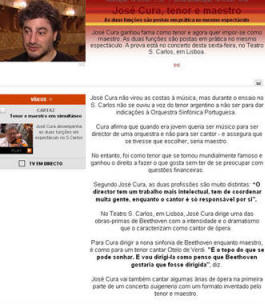
NANCY Master Class
Forum Opéra
Concert lyrique
final des master classes de José Cura
Prélude, ouverture, airs et duos d’opéras
de :
Gaetano Donizetti (1797-1848)
Giuseppe Verdi (1813-1901)
Camille Saint-Saëns 1835-1921
Jules Massenet 1842-1912
Ruggero Leoncavallo (1857-1919)
Giacomo Puccini (1858-1924)
José Cura, ténor, Artistes lyriques
Orchestre symphonique et lyrique de Nancy
Directions musicales : José Cura; Mario De Rose
Nancy, Opéra national de Nancy et de Lorraine,
Dimanche 2 septembre 2007
The operatic tradition of the City of Dukes
de Lorraine has been well established for years and many natives
of Nancy remember - and have carefully preserve the programs - the
fabulous lyric seasons of the [19]50s, when a new spectacle would
be presented every week! It was not rare to attend, to list
only two titles, Postillon de Longjumeau by Adolphe Adams
or La Poupée by Edmond Audran. Over the years the city
has not been able to preserve such recurrences of opera magic but
has continued to treat the public with high quality entertainment
presented by artists of national and international fame.
Indeed, it was a frequent occurrence to hear
those to whom we added, after their names, “from the opera” to indicate
they were glorious residents of the Paris Opera--Mado
Robin, Jacqueline Brumaire, Régine Crespin, Guy Chauvet, Henri Legay,
Michel Dens, Gabriel Baquier, Alain Vanzo. The Opera
of Nancy also welcomed great international stars and we regularly
found Piero Cappuccilli, Rolando Panerai, Nicola Rossi Lemeni, Sesto
Bruscantini, Paolo Montarsolo, Ruggero Raimondi, and Fedora Barbieri
alongside other artists from Europe and even from Asia. Sometimes
the biggest of the big pass through Nancy, such as Lucia Valentini
Terrani and, before unrolling the red carpet for José Cura, a great
singer of today, his illustrious predecessor-tenors: Giacomo Lauri
Volpi, Luis Mariano and Carlo Bergonzi.
It was a time when
the people supported this opera and in the late 60s the first association
promoting lectures and brochures to represent the works on the opera’s
season, as well as hosting open receptions with the artists, was
born. Today, the city has four (!) [of these associations] and one
of them, Nancy Opéra Passion, had a surprise for the public that
reflected the splendours of the not-so-distant past. …..We can see
what creates the ‘passion’ in the title of the association:
bring an artist of the calibre of José Cura, who returns to France
after an absence of six years, and allow us, a fabulous once-in-a-lifetime
chance, to “draw near this immense artist,” according to the President
[of the association, Jacques Delfosse].
[...]
Now it is time
to exclaim, much as Tonio from Pagliacci comes in front of
the curtain to explain in Leoncavallo's brilliant conceived Prologue:
"Andiam, incominciate!” (Let us go, begin!).
It is precisely
the Prelude from Pagliacci that the orchestra attacks, spread
out widely and in an impressive way for the public most familiar
with it jammed into its “Golfo mistico,”
to use once more the attractive Italian
expression for the orchestra pit. Curiously, it is not José
Cura who directs…we know, however, of the double talent of this
artist, the one who becomes a conductor to be more still, if one
can say so, to listen to the singers.
We notice the energy and heat with which
Mario De Rose (José Cura’s assistant) attacks and drives the tormented
music of Leoncavallo, but what are they going to do as the prelude
breaks off so that the baritone can appear in front of the curtain?
We get the answer and a surprise: it is no less than José
Cura, the great tenor, who sings the part of the baritone!
In doing so he takes up the practice of outstanding tenors such
as the incomparable Mario Del Monaco, tenors whose span of vocal
registers allows them this performance.
We discover just like that the measure
of this Artist: the exceptional cream and quality of the timbre,
combined with perfect control of vocal emission and a warmly Latin
vibration and an interpreter who obviously ‘lives’ what he sings.
One does not need more to conquer this curious public, even if he
is already known, and it did not end the evening's surprises. .
. . .
With surprising ease, José Cura addresses
the public, jokes with them and then introduces the first artist,
Stéphanie Vernerin, from France, who sings with attractive fruity
tones Musetta’s waltz from La Bohéme (G. Puccini).
One hardly recovers from the quality of the timbre and the singing
of this young soprano, who began in 2004, when José Cura underlines
the peculiarity of the bass which he introduces. Jan St’ Ava
come from the Czech Republic and is only nineteen years old but
nevertheless has a voice with a cavernous low register enhanced
by a brilliant middle and with the capability of bringing to life
"Vecchia zimarra", the famous, if brief, intense aria of the philosopher
Colline from La Bohéme.
It was again Puccini whom we hear next
and Marie Karall (France), having only begun studying last year,
astonishes us with a big voice, full in all the registers and giving
again grace and passion to "O Mio babbino caro" from Gianni Schicchi.
For the public who did not attend the master class the day before,
no one could have suspected the miracle wrought by the “Maestro.”
This soprano had arrived with a narrow, badly placed and poorly
controlled voice. José Cura, in trying to remedy this disaster,
eventually said to her: “Imagine you sing Tosca!” And
the artist, finally breaking free of herself and releasing her voice,
succeeded in reaching the magnificent notes.
The tenor Avi Klemberg (France) has
been working for four years but it is not only he who sings.
It is José Cura, who not only conducts the orchestra with love but
also assumes the part of the baritone (!) at the beginning of the
aria. It is the brief but warm “Addio fiorito asil,” from
the always charming Puccini (Madama Butterfly), which Klemberg
sings in a beautiful lyric tenor with delicate high notes,
reliably and with confidence.
Maria Bisso, though Spanish, is a fellow
countryman of José Cura since she was born in Buenos Aires.
She took a training course at that city’s famous “Teatro Colón,”
a real bastion of Italian opera in Latin America, and won the 2001
International Competition Maria de São Paulo in Brazil. She sang
nothing less than "Regnava nel silenzio,” the opening soprano aria
in Lucia di Lammermoor by Donizetti.
The means of expression explains more
than anything the particular difficulty in this aria, taken straight
from the Italian romantic spirit: a dreamy and delicate song but
at the same time passionate, a prisoner of the era, so to speak,
of vocal exercises and very shrill sections in musical expression.
Thus we are astonished that this substantial, firm, almost hard,
voice was capable of such well-driven vocalism and assured high
notes and ‘density.’ The contrast is most striking when compared
with the next artist, a French mezzo-soprano of Italian origin,
Alexia Ercolani, who began study in 2003. The aria “Mon
cœur s’ouvre à ta voix” from Samson et Dalila (C. Saint-Saëns)
places emphasis on the lower register and she is endowed with an
impressive vibrato which blurs in the well-projected higher notes…and
what a Samson responds to her! The conductor, José Cura, who
in jest, replaces the lover’s final response “Dalila! I love
you!” with an ecstatic but well good balance: “Alexia!
I love you!”
From South Korea comes baritone Changhan
Lim who has worked in France since 2003 with such artists as Elisabeth
Vidal, André Cognet and Michèle Command and who has already sung
on stage in La Bohéme, Carmen, Cavalleria rusticana
and in the title role in Don Giovanni.
A beautiful lower register and a luxurious middle as well as [vocal]
suppleness, all the attributes of a valued baritone, are here put
into service in the aria “Vision fugitive” from
Hérodiade by Massenet, and leads
us to predict a beautiful career.
A duet rarely performed in concert finishes
the first half. Drawn from Pagliacci, the duet between
Nedda and Silvio allows us to hear again soprano Maria Bisso, impeccable
in the old-fashioned coloratura of Nedda, and to discover a young,
local baritone, since Benjamin Colin was born in Nancy. Also
a student of Michèle Command, he began in both opera and operetta;
one feels in his performance brave work, effort and concentration
in spite of his difficulties in pronouncing Italian, a curious yet
perceptible defect, considering the mother tongues are “cousins,”
noticeable in French singers. He is now part—just consecrated—of
the Chœurs de l’Opéra national de Nancy and Lorraine.
After the break a beautiful surprised
awaited the public when José Cura announced a favorite opening of
opera concerts: I Vespri Siciliani (or rather
Les Vêpres siciliennes, because the original French version
is being given more and more often) of Giuseppe Verdi.
We had been, up to now, able to appreciate
the art of conducting by José Cura, who does not enslave the singers
as we could accuse some conductors of doing but rather serves the
singers as the composer [would]. With this masterly opening, we
now had the measure of this chef-d’orchestre in opera, renewing
an ever more distant tradition, as well as the fashion of today,
to conduct quickly, believing that speed ‘equals’ dramatic. One
result is that we often end up with a dry interpretation, empty
of poetry and burnt wings of Musique. José Cura, however,
let the orchestra breathe (and God knows how much Verdi needs to
breathe: we speak of the sight of panting Verdiens).
Of course, the poignant motive for the father-son duet played here
by cellos is already opera par excellence, but it is still necessary
to know how to let them sing. As for the martial crescendo, more
usually solid or booming, we heard it amazingly produced, in the
style of Franco Capuana, supple and warm like Gianandrea Gavazzeni.
In brief, much like Fernando Previtali,
José Cura made the entire overture vibrate with a theatrical sense…
At the end of the burst of amply deserved
applause, it was touching to hear José Cura, as if speaking to himself,
as a dreamer still under the spell (nevertheless obtained by him!),
murmur, ‘What an orchestra, my God!”, and then still pensive
and in a hushed voice, to the first rows, “This belongs to you!
It must be preserved!”
But why does he not turn around completely
to receive the applause? It is because an even more beautiful
picture awaits us: Cura eventually steps down from the podium, joins
the first instrumentalists and then faces the public, one with the
orchestra.
The second part of the concert opened
with more Verdi, the great baritone aria from Don Rodrigo di Posa
in Don Carlo. Although the piece is usually called “Mort
de Posa” because the character is shot during this scene in the
drama, we could enjoy José Cura’s joke in which he introduces it
as follows: “The death of Rodrigo, but without the death!” Such
perhaps was his intention, but it could also mean that the baritone
was going to sing only the first of two arias, which make up what
we would call a double ‘aria.’ Andrej Benes, who come from
the Czech Republic, had the luck to meet in 2004 (the year of his
debut) one of the greatest baritones of the 20th century,
Giuseppe Taddei. We were struck to discover the ‘purified’
tone of D. Fischer Dieskau, with the German singer's characteristic
clarity of emission, and at the same time,with an astonishingly
assured high notes. As for the counterpart envisioned by Verdi
for Don Carlo, also present at this moment in the opera,
we heard them coming from another mouth and, once we recovered from
the surprising effect which they produced when seeming to come our
of nowhere, we said to ourselves: “But of course! José
Cura does Don Carlo—and what a Don Carlo!”
The captivating
Verdi was always honored for the following piece, the dazzling Finale
to the first Act of La Traviata.
Aude Priya Engel (France), who left
the Academy of Toulouse in 2002, has already sung this work, as
well as in La Bohéme and Mozart’s Don Giovanni. Her
blazing timbre “leaves” in the high notes in a surprising way but
the astonishing mastery she has is also there. She also surmounted
the difficulties of the final cabaletta “Sempre libera,” of which
it is absolutely necessary for us to underline the quietly mischievous
tempo (of another era!) which José Cura imprints with his orchestra.
We know that in this piece Alfred intervenes, off-stage under Violetta’s
window, a detail that often makes us smile in fascination according
to how near or far the theater relegates the poor tenor, sometimes
almost in the cellar, as someone once commented in humor. Well,
this time it starts straightforwardly and especially since Alfredo
is present on stage, a brilliant Alfredo, high notes blazing, José
Cura putting into practice as well the words which he sings:
“Amore è palpito…” while by his side, his Violetta, all the
more stimulated, one must say, vocally ignites.
Next is the first
part of Alfredo’s aria “De’ miei bollenti spiriti” sung by tenor
Thomas Blondelle from Belgium.
A young graduate of the Conservatory of Bruges, he has received
numerous prizes since 2006. His tone is clear and he is endowed
with such confidence that we were amazed at the strength in which
he ‘lives’ his singing and, though this is not always the case with
this aria, vibrates literally with the words he sings: “De’miei
bollenti spiriti / Il giovanil ardore : De mon esprit bouillant,
/ La juvénile ardeur.”
Very deserving, a young soprano moves
onstage gracefully but without affectation and José Cura explains
that Gabrijela Ubavic, from Serbia, is ill but, in the absence of
being able to really perform, she is still anxious to take part.
She will sing only half of the aria “Addio del passato” (La Traviata),
which means she had the praiseworthy intention to interpret the
da capo which is very often cut. José Cura consequently requested
the indulgence of the audience for her. Gabrijela Ubavic began
in 2002 at the National Opera of Belgrade and has performed in Europe
since then. We are stuck at once by the consistency of her
tone, luxuriously copper-colored, so to speak, rich and full but
very docile, effortless. We learn with astonishment from the
program that she also sings roles requiring great vocal agility,
like Gilda (Rigoletto) and Norina (Don Pasquale).
Faced with such a quality of tone and song, we think with shivers
of what must be the level of performance from this opera singer
when she is in top form.
Finally, Julija Samsonova from Lithuania
comes to sing us the last piece from the participants in the master
class. Leaving the Academy Rossini de Pesaro, she began in
2005 with the role of Corinna in Il Viaggio a Reims
by Rossini at the prestigious Rossini Opera Festival, which
the city has dedicated to this composer. Here she sang Desdemona’s
aria from Verdi’s Otello, the curious “Air du Saule.” Samsonova
displays a velvet timbre in brilliant complexions, a beautiful sound
with melodious low register, superb piani and control of tone.
An exemplary legato makes the ‘passages’ unperceivable and leaves
the listener breathless. It must also be said that the orchestra
formed a single body in its exceptional interpretation, José Cura
chiseling marvelous subtleties from the “old man’ Verdi, like the
violins in their highest notes concluding “Ave Maria.”
José Cura, so invested and so touched
by what he heard that tears come to his eyes, wonders how he is
going to sing now that it is his turn, at the conclusion of the
concert!
He concentrates and forgets the fatigue
and heat while Maestro Rose makes his entrance. The piece
is nothing less than the finale of Otello, in which the hero
contemplates his Desdemona, whom he has just straggled in unjustified
jealousy before killing himself. José Cura’s Otello roars
at first, with a warm strength that is always phenomenally harmonious,
filling the entire auditorium of the Opera, which is held silent
and continues to hold its breath…Almost as much as the great tenor,
whose astonishing emission in mezza-voce captivates the audience.
He continues the aria, always balanced between beautiful delicacy
and painful intensity lived every inch…Then when Verdi greets his
public—in the last dramatic flight of the orchestra, typical of
its style, Otello-José Cura still cries out again: “Un
bacio… un bacio ancora… ah !… un altro bacio…” and then his voice
dies out gently, and the orchestra with it.
Under
his spell, the audience of the Opera of Nancy waits while the impalpable
magic of the opera hangs over it before bursting into applause and
then into an ovation during which José Cura invites all the artist
to rejoin him joyfully on the stage. Shortly after, the ‘Maestro’
stops the ovation with a raised arm and the public expects the announcement
of an encore…perhaps the famous Brindisi from La Traviata, often
selected at the end of a concert,
or at least some words of greeting,
of wishes, but
no, José Cura declares simply with the ‘little bit direct’ carelessness
which characterizes him: “Now, we will all eat!” Then they
really step off the stage, leaving the once more public astonished
(this time having too little to celebrate to suit its taste) but
profoundly moved. [Yonel
BULDRINI]
The Lessons of the Master
L'Est Republicain
Sept
2007
To be guided by Jose Cura,
internationally known tenor and conductor: for fourteen young singers
it’s a dream come true.
“There is no one way of
singing, and there’s not one person who sings like another. Everyone
must find his own approach.” Helping young people find their
own style of singing, that’s how the Argentine tenor and conductor
José Cura sees his role as teacher. During public Master classes
presented by the Nancy Opera this week-end, he expressed his
“tender feelings for those who do their best, for all those who
make sacrifices in order to improve their performance.” With
humor and patience he guided his students, took them up again, corrected
them, and then congratulated them when they finally integrated his
advice.
Great Generosity
For Marie Karall, a young
singer who has followed his Master classes, “it is a chance for
young people like us to rub elbows with a true artist. He knows
and has experienced all that’s problematic and can provide us with
all the keys for anticipating problems and improving. José Cura
is someone who has the ability to see errors very quickly and consequently
to correct us swiftly.” What was a pleasant surprise to the young
woman was his “great generosity and his incredible ear for others.”
“He is as rigorous and meticulous as he is passionate, and he has
a great love for music but also for young people. He is capable
of putting himself on our level,” she remarked. Besides the good
advice from the Maestro, what Marie particularly appreciated was
to be able to perform for the first time in her life with an orchestra
in a big opera house. “Many young people, who debut in this profession,
must begin on small stages. For me, singing under these conditions
was a real pleasure.”
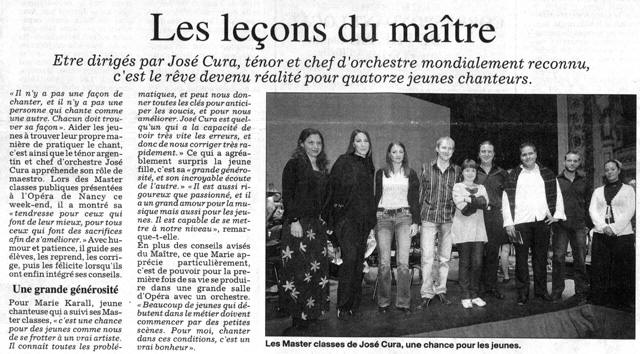
José Cura Show at the
Opera
L'Est Republicain
The teacher and his
students gave a concert late yesterday afternoon. Discovering
new voices.
José Cura in the role
of singing professor, conductor, and ‘Monsieur Loyal’ late yesterday
afternoon on the stage of the l'Opéra de Nancy at the invitation
of the ‘Nancy Opéra Passion’ Association: The great Argentine
tenor, who had not performed in France in several years, initiated
his return to the country with a master-class for thirteen young
singers. Yesterday’s concert was the result of the previous
day’s work sessions.
Chatting with the audience,
the tenor called out to a small child to ask him for his name,
then asked his students to refuse to reveal their identity,
address, and phone number, undoubtedly to put them at ease.
Remembered from the first half, begun about thirty minutes late
due to the rush at the ticket counters: The Prologue from
Pagliacci with the maestro, the performance of the young
19-year-old Czech who offered an aria from La Bohéme
in a powerful, clear, and well positioned bass voice, also the
aria of Hérode from Massenet’s Hérodiade, sung by Korean
baritone Changham Lim with great presence and excellent diction—a
lesson for the Frenchwoman who preceded him on stage and from
whom we had difficulty understanding the words in the duet from
Samson et Dalila by Saint-Saëns. With a booming "Hello,
colleague", the maestro then welcomed the French tenor Avi Klemberg,
who bravely managed the Pinkerton aria from Puccini’s Madam
Butterfly. It is regrettable that Argentine Maria
Biso chose to perform Lucia di Lammermoor since the timbre of
her voice did not correspond well at all with the hallucinatory
nature of the character. The baritone from Nancy, Benjamin
Colin, a former student of
Arcadi Volodos at the Conservatory
of Nancy, sang a duet from Pagliacci
with little power but with a well-placed voice.
The second half of the concert was
far more interesting, with the overture from Verdi’s
I Vêpres siciliennes,
played superbly by the Orchestre de Nancy under the baton of
José Cura: atmosphere, changes in color, breathing—it
was all there. Although unwell, the Serb Gabriela Ubavic managed
a convincing Traviata, and the Belgian Thomas Blondelle a very
respectable Alfredo. Real emotion came, however, only
with Lithuanian Julija
Samsonova who splendidly carried off the role of Desdemona.
As for the maestro, he
stirred every soul in the room with an Otello whose death he
experienced with his entire being. As a singer but also as an
actor. True art, indeed!
An evening that had begun like something out of "Dimanche
Martin" thus came to an end with profoundness and dramatic
intensity.
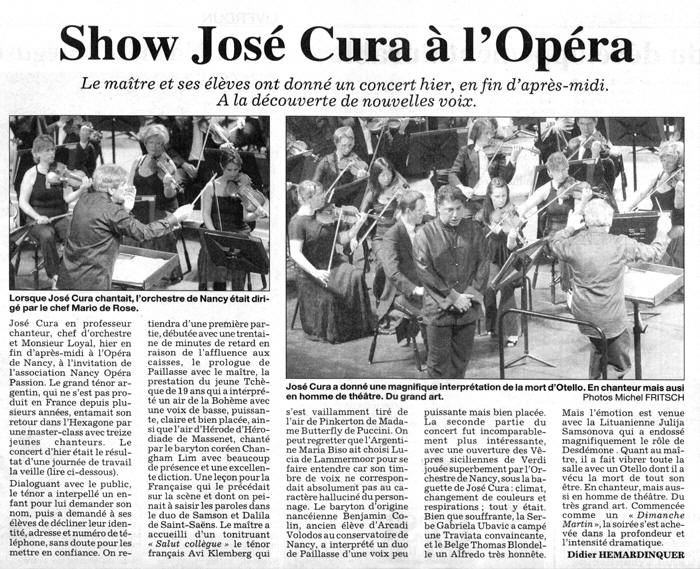
José Cura, Instinctive and Ardent Argentine Tenor
A red-hot master
class with José Cura yesterday at the Opéra de Nancy.
The Argentine tenor demands maximum emotional risks of young
artists. Today, the singer will offer a special recital.
After a six-year absence from
France, the Argentine tenor José Cura chose the stage of the Opéra
de Nancy to offer a recital of some of the most beautiful arias
in the repertoire. He will be accompanied by some of the most
promising young talents of the international operatic stage.
Yesterday, a handful of privileged
people attended the rehearsals/coaching sessions of the artist,
thanks to the initiative of the Nancy Opéra Passion--a master
class which takes your breath away and bowls you over all at the
same time.
Jeans, a black T-shirt, small
spectacles perched on the tip of his nose, Latin and even a bit
macho: that’s José Cura conducting the orchestra as he concentrates
on a frail 23-year-old. Alexia Ercolani is a magnificent mezzo-soprano.
Her task is to sing Mon coeur, the sublime duet from Camille
Saint-Saëns’ Samson et Dalila, with him. It is not
[vocal] technique that José Cura is interested in; it is the expression
of an emotion. He will never stop until he reaches his goals.
The singing lesson . . . passion!
First of all, he reassures
the singer, relaxes her, whispering lines in her ear. The
orchestra of the Nancy opera is attentive. José Cura makes
them understand the music must be fluid, moving from one group of
instruments to another like a warm feeling. Then, suddenly,
he looks at Alexia, urging her to look deep into his eyes.
This is a love duet. It must be ardent, it must be deeply moving.
Everything is in the breath. The singer is still reserved.
He stops; breaks the spell.
It’s just the carnality, only
the ‘perversion’, that you lack
The next moment, he takes
her by the shoulder. He is massive, powerful; she is tiny.
Little by little she relaxes; her voice fills the auditorium.
One can feel that she’s gaining confidence, taking some pleasure
while he hums and locks eyes with her. “Put some heat into
it, heat it up," he tells her bluntly, "Come on!” Again, he
stops. “Listen, understand: This is not a woman talking
to a guy, no. This here is not a woman, this is a female…
you get the nuance? It is not easy being Dalila. I know.
You have the voice, the look….” He puts his hand on Alexia’s
forehead. “You lack only the ‘perversion’.” The young
woman has gotten it; she surrenders herself, lets herself go.
José Cura applauds.
A little later, biting with
relish into a very juicy fig, he explains his approach. “I
do not have the time to go into the musical detail and teach an
academic course. I have only one day to awaken their curiosity,
to activate that sixth sense which the performer has in him.”
The sensuality of art
In search of passion, of emotion
on the stage, he gives his all shamelessly. Endowed with an
animal magnetism that he does not attempt to curb, he even demands
“the sensuality of art. Art is nothing but that. It
is necessary to put technique at the service of the senses.
What happens too often is the opposite. I am saying that the
artist must strip, must bare his soul.”
His –hot– Latin temperament,
his vocal ease allow him to find maximum expressivity, something
that turns a room upside down – and women in the audience in particular.
“Right now, Alexia, I wanted to get all this sensuality of hers
gone; rather, I wanted to go into the sexuality of the character.
Sometimes people have difficulty doing this in public. It
is a question of upbringing. But when you are on stage, you are
at the service of a character. Totally, body and soul.
Otherwise, nothing will happen.”
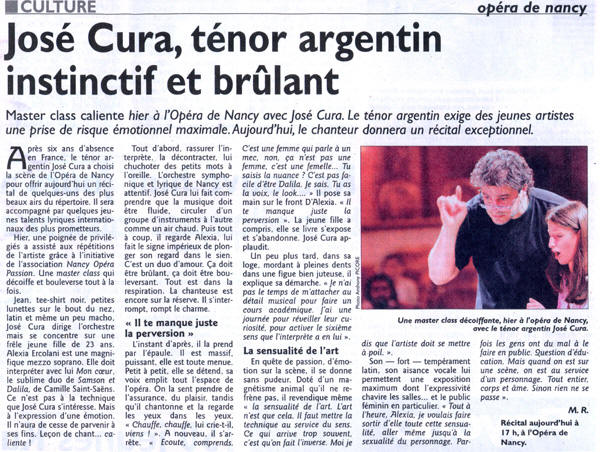
Nancy Master Class
Terra Actualidad - EFE
22 August 2007
Soprano Maria Bisso will study with José Cura
in Nancy
The Spanish-Argentine soprano is one of fourteen
singers from different countries who will take part in the master
class that Argentine tenor José Cura offers on 1 and 2 September
in Nancy, in the east of France, according to reports from the event’s
promoter.
The other thirteen who have been selected are
Julija Samsonova from Lithuania, Gabrijela
Ubavic from Serbia,
Jan St'Ava and Andrej
Benes from the Czech Republic,
Thomas Blondelle from Belgium, Changahn
Lim from South Korean, and
Eva Gazinate, Benjamin
Colin, Aude Priya Engel, Alexia Ercolani, Eva Gazinate, Marie Karall,
Avi Klemberg and Stephanie Varnerin from France.
Together with José Cura,
they will work on the interpretation and the construction of roles.
The master class will be open to the public
and will conclude with a concert provided by the Maestro and his
pupils at the Opera Nacional de Lorena,
accompanied by Orchestra Sinfónica and Lírica de Nancy.
After an absence from the French stage of six
years, this will be ‘an exceptional occasion,’ according to the
organizers, to hear José Cura, who will present his interpretation
of the ‘Prologue’ from I Pagliacci by Leoncavallo and
‘Niun
mi tema' from Verdi’s Otello.
The tenor will also sing more Verdi, but this
time the duet
'Son Io mio Carlo...per
me giunto’ from Don Carlo with Czech baritone
Andrej Benes, and then sing ‘Mon coeur’ from Samson et Dalila by
Saint-Saëns with French mezzo-soprano Alexia Ercolani.
Maria Bisso is expected to sing
'Regnava
nel silenzio', a fragment from ‘Lucia di Lammermoor' by Donizetti.
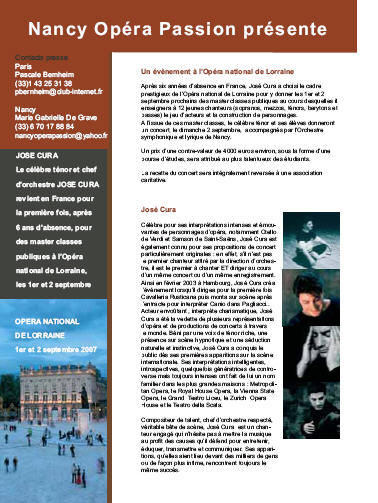
Acclaimed Argentine Tenor to offer Two Masterclasses in Nancy
La Prensa / Terra
5-13-2007
José Cura as teacher
Although he has not sung in France for over
six years—for reasons he can’t explain—he is driven to share his
knowledge with the next generation.
The Argentine tenor José Cura, who in September
will offer two masterclasses in the French location of Nancy, says
he feels a need to teach the younger interpreters.
“All artists, after achieving a certain level
of experience, have an obligation to give something back to the
future generations. On the one hand because we owe much to those
who came before and on the other in an effort to help avoid the
Calvary through which I passed,” said Cura during a press conference
in Paris.
The singer made reference to his difficult
beginnings, when bad advice forced him into the wrong repertoire
and nearly ended his career.
Cura, who has not performed in France since
2001, will return to the country in which he lived for five years
to offer masterclasses on 1 and 2 September, followed by a concert
whose profits will be targeted to benefit charities.
The Argentine tenor and conductor says he will
not try to “teach how to sing” but instead will convey to his students
his experiences and the importance of bringing passion to the profession.
Transmitting Passion
“I am not the Pope, I do not teach dogma, I
merely transmit my experiences. The beauty and the success
of a voice is somewhat subjective but there is nothing subjective
about a human’s commitment, both artistically and professionally.
It is something I take very seriously and it has become my cause,"
he commented.
Cura will focus on “the importance of feeling
the character being interpreted,” because, he says, “in the theatre
it is necessary to offer something special in the interpretation,
otherwise people will put on a CD, stay home and save the money
a ticket would cost.”
The tenor does not deny the importance of good
vocal technique but insists that technique should be transparent.
“One of the best compliments I receive is when
they say I do not have technique. What that means is that
my technique is not obvious and I am one of those who thinks that
if you notice [technique] while the singer is performing then he
is interpreting badly," he said.
Stubborn Artist
Cura believes that current opera productions
require tenors to sing too forcefully because scores originally
designed for 50 instruments are now being played by 90. “It
is the heritage of a few people who destroyed it 50 years ago to
stay in favor with the press,” he says.
He feels there is an advantage to students
with him being both singer and conductor.
Cura did not dwell on the reasons for his absence
from France for six years, though he does remember that the critics
of his final performance were ferocious. “The last time I was here
they said I was finished. Six years later I am back and ready
to continue the battle.”
The singer confesses he does not know why no
one has called him to return to France, a country in which he lived
for five year and where his youngest child was born. “I have
no bad memories of France but if she has bad memories of me, then
there is nothing I can do about it. If I return to perform,
it will be the same as before, because with age I have become even
more stubborn. I am not going to force anyone to hire me.
I have more work now than I can do,” he says.
Opera Needs to Connect to the Present
El Pais
Javier Pérez Senz
10 December 2007
José Cura (Rosario, Argentina, 1962), tenor. He is also
a conductor, stage director and has his own record label.
Cura does not conceive of opera as a simple musical exhibition and
claims the right to seek his own interpretation of a character without
yielding to tradition. The Argentine tenor, now living in Spain,
stars in Giordano’s Andrea Chénier at the Liceu of Barcelona
until 17 October; although he lives in Madrid, it has been over
seven years since he last worked at the Teatro Real, following a
controversial clash with the public after a performance of Il
Trovatore. “It is not enough to sing. We must get into
the skin of the character, look for nuances and vocal colors that
define his state of mind,” he says.
Question: In opera it continues to
be rare to see singers who, as well as sing, take the risk and give
their all in a theatrical interpretation of a character. Is
the cult of the voice still prevalent in the seats?
José Cura: Resistance to embracing the
theatrical dimension of opera does not come from the younger generation
but from that of my father’s, those who now fill the theaters.
It is a public blind to theatrical innovations because of how they
learned to love opera, and they live in the past with strong emotional
nostalgia. I respect that, but I also claim the right, as
a singer, not to do that, not to live anchored in the past, not
to always do the same thing. Opera must connect to the present.
Question: How do you prepare for a
role?
José Cura: With a conductor’s mentality
and also with that of a stage director. I am a composer and
I like to analyze the score to find the key to every scene, using
every nuance to shape the feelings of the character. I like
researching, reflecting on the personality of the role that I sing,
and sharing my ideas and findings with the directors and the other
singers. If I have confidence in them, I will suggest they
try new things to deepen the relationship of the characters on stage.
Question: Maria Callas fought for
change the theatrical expression of singing and today, thirty years
after her death, there is no similar reference in the opera world.
José Cura: But many continue to follow
her example. Sometimes it is necessary to sacrifice pure vocal
beauty to achieve theatrical truth. You cannot die as Otello,
with a dagger nailed to your stomach, singing as if it were nothing
at all. In singing, this agony has to be reflected, with a
darker voice, suffocated. The opera is theater, governed by
a musical thought but a theater that requires the singer to also
be an actor. Of course, today nobody questioned the interpretive
revolution created by Maria Callas but it worth recalling that she
died alone, bitter and forgotten. And the public who today
venerates her is the child of the public who denigrated her.
Question: How can opera in the 21st
century compete against macroconcerts, cinema, or the new technologies
to attract an audience?
José Cura: The opera, the ballet, and
the pure theater are the only spectacles in which the artist sits
alone and without network. The audience can connect to what
human beings can do on their own, without gadgets. That is
why it is so cruel for a viewer who is ready to judge an artist
by comparison with what he has heard on a CD. There are many
voices that impress on disk, and then later, in the theater, not
listening to them.
Question: Since you are a famous tenor,
may people do not take your conducting career seriously.
José Cura: I was born a musician and
was a guitarist and conductor before I was a singer. I discovered
the possibilities of my voice at the age of 28 and then started
my career as a soloist, conductor, and composer. I know there
are singers who make a career with minimal music training, some
have even triumphed without knowing how to read a score, and they
sing very well without any more knowledge. In my case, however,
music is my passion and everything I do when singing on stage, as
strange or bizarre as it may seem, is justified in the music, because
it responds to nuances and indications in the score. As a
conductor, I have the respect of the orchestras with which I work
and would not be hired if the musical results were bad. On
19 October I will lead the inaugural concert of the season at the
Teatro San Carlos de Lisboa with an opera gala in the first half
and then Beethoven’s Ninth in the second.
Question: And you are also fortunate
in stage direction.
José Cura: My fundamental job is as a
tenor, because I am in the prime of my career. But I enjoy
doing more things, not by whim but rather by artistic necessity.
I am passionate about conducting orchestras and each time I direct
it tempts me more and more. I have already had several experiences
and now I am preparing the scenery and staging of
Un ballo in maschera
which I will direct for the Cologne Opera in 2008.
Question: Since your controversial
clash with the audience in the Teatro Real in 2000 you have not
sung again in that venue. It must be difficult to perform
in major theaters around the world and not step on stage at the
one in the city where you live.
José Cura: Yes, it is a strange situation.
For my part, the controversy is closed and forgotten. Honestly,
I long for the sensation of singing in the theater of the city in
which I live and being able to sleep in my house after a performance.
I hope to return some day to the Teatro Real. Its artistic
director, Antonio Moral, came to see me during the Otello
performances in the Liceu in 2006 and said he would send me a proposal
but I have never received it. With the Liceu, I have signed
a new contract to do Cavalleria rusticana and Pagliacci
in 2011. The truth is that I do not have many contracts in
Spain and my calendar for 2008 lists only a performance of Samson
et Dalila in Santander.
Opera Rara
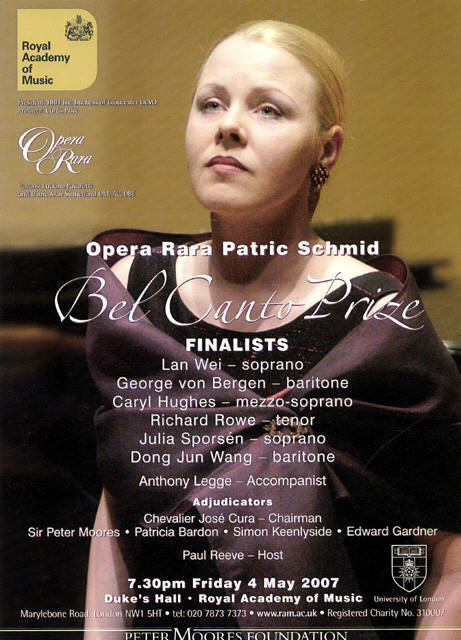
Opera Rara Patric Schmid Bel Canto Prize
Duke's Hall, Royal Academy of Music
4 May 2007
Serena
Fenwick
[Excerpt]
In complete contrast to my previous evening at the joyous Guildhall
Gold Medal concert, I now joined the aesthetically rarefied realm
of the Opera Rara Bel Canto competition. The participants, all students
of RAM, had taken part in a preparatory training course. Each offered
two arias, which included some real gems of obscurity, and were
then required to take part in an ensemble piece. None of the singers
seemed particularly comfortable with the style, and it probably
did not bring out the best in them.
The winner was soprano Julia Sporsen the most
experienced singer in the competition and a finalist last year.
She offered a very showy aria from Il Pirata which Callas
was notoriously fond of performing and an interesting rarity from
Mayr's Medea in Corinto . She held her ensemble trio together
very effectively.
Second prize went to Welsh mezzo Caryl Hughes,
looking cheerful in a bright red dress and singing with her usual
accuracy and attention to detail. She had Una voce poco fa
comfortably sung in and showed off some commendably good French
in an aria from Donizetti's Dom Sebastien.
Opera Rara had been meticulous in supplying full texts and translations,
and the repertoire certainly provided food for thought.
1st Prize – Julia Sporsen - soprano
2nd Prize – Caryl Hughes – mezzo soprano
Other Finalists – Lan Wei – soprano; George von Bergen – baritone;
Richard Rowe – tenor; Dong Jun Wang – baritone
Jury: Chevalier José Cura; Sir Peter Moores; Patricia Bardon; Simon
Keenlyside; Edward Gardner
Samson Was a Terrorist
Clarin
June 2007
Sandra de la Fuente
The last time
he gave a performance during the Teatro Colón’s season
was in 1999. Tomorrow, José Cura will star in “Samson
and Dalila” at the Coliseo. Today, he reflects on the
work…
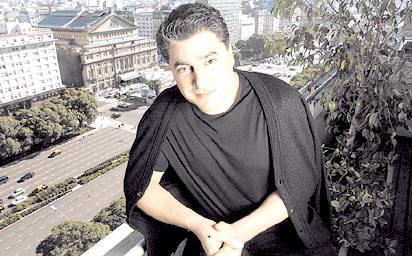 After
an eight year absence, the Rosarino tenor José Cura returns
to Buenos Aires in a concert version of Camille Saint-Saens’
opera Samson and Dalila, which will be presented
tomorrow at the Coliseo as part of the Colón’s season. Recognized
as one of the great voices of today on the international
scene, José Cura is a very unusual artist who, besides singing,
conducts orchestras, composes, and also has recently started
to make incursions into stage management/directing. After
an eight year absence, the Rosarino tenor José Cura returns
to Buenos Aires in a concert version of Camille Saint-Saens’
opera Samson and Dalila, which will be presented
tomorrow at the Coliseo as part of the Colón’s season. Recognized
as one of the great voices of today on the international
scene, José Cura is a very unusual artist who, besides singing,
conducts orchestras, composes, and also has recently started
to make incursions into stage management/directing.
In spite of
his established reputation as singer in the leading theaters
of the world, the Colón has been elusive for him. Apart
from Otello in 1999, there has been virtually no
performance of his at the Teatro. “My absence coincides
with a turbulent time in this country. During that period,
the Colón did not have consistency in its scheduling which
complicated the hiring of artists who book their calendars
five or six years in advance. The question they always asked
me was: ‘Can you be here the day after tomorrow?’” explains
Cura in an exclusive interview with Clarin. “Eventually,
after Marcelo Lombardero took over, the Colón became more
stable, particularly concerning its image abroad. During
the great crisis, the Colón was spoken of as a theater to
which it was better not to come. Now, European musicians
are beginning to say it is worth the trouble of going back
to the Colón.”
What is gained and
what is lost in this concert version of Samson?
Any opera loses in
a concert version; when there is no dramatization, the opera
can lose its impact. But Samson and Dalila borrows
much from oratorio, so one doesn’t miss the theatrical aspect
as much as in a work of verismo. But in this production,
we will not be standing like sticks behind a music stand;
neither will we wear tuxedos. Though there is no set, we
will enter and exit according to when we have to sing. It
will be dynamic, with gestures and even lighting that will
produce a certain atmosphere.
What is your idea
of Samson?
I believe there are
two ways to interpret the role. One where Samson is prophetic,
good, Christian. To me, this view seems erroneous. Samson
was a judge and in his day, judges were military leaders;
they defended one people and subjected another; they were
men that were essentially violent, revolutionaries. Samson
was killing as if he were breaking off a piece of bread.
He killed a lion with his bare hands and pulled down a temple,
sacrificing himself. That act turned him into history’s
foremost terrorist. He was killing in the name of God—some
contradiction in terms!—and sacrificed himself so as to
kill in the name of God. His legend is about 3,500 years
old and has a modern ring to it that is as sad as it is
shocking. My view of Samson has been criticized many times
for lack of spirituality. That’s right, it does lack the
spirituality of today, but it has the spirituality of 1,500
BC when the lex talionis (the law of retaliation,
of an eye for an eye) was the rule.
It is very hard to
think that an aggressive personality like that can be in
accord with the music of this opera.
That’s where the danger
is. One needs to interpret the text, not the music. The
music adorns the text, but that embellishment needs to be
used to advantage; good use can be very interesting, because
beautiful music which contains a tremendous, i.e. a dreadful
text may take a turn toward the ironic.
Translation: Monica B.
Something to sing about!
By
Laura Joint
BBC Devon
Aug 2006
Internationally renowned tenor
José Cura has agreed to be Patron of New Devon Opera
- and he's coming to the county to lead an opera
masterclass.


A Devon opera company has something to sing out loud about, after
internationally famous tenor José Cura agreed to become its new
patron.
New Devon Opera, currently enjoying its second full season, approached
the Argentinian-born singer about the role - and he said 'yes' straight
away.
And he will also be leading a masterclass with around a dozen
singers. That will take place in Devon in the spring of 2007, with
the singers then performing in a special concert.
Ivybridge-based New Devon Opera is a professional touring company
but is a not-for-profit charity. So it uses professional performers,
but financially is reliant on ticket sales and donations - although
there are plans to apply for Arts Council funding.
In 2005 - its first season - the company performed The Magic
Flute at venues across Devon.
This summer, the chosen opera is Rossini's The Barber of Seville,
with venues at Kingsbridge, Dartmouth, Exmouth and Chudleigh.
The company auditions for the roles and this year, three of the
principal singers are from Devon. Other performers are from elsewhere
in the South West and London, while the community chorus is selected
from local groups.
Chair of New Devon Opera, Linda Hughes, explains how she managed
to sign up José Cura as Patron: "I was speaking to him at the Royal
Opera House and I asked him. And he said yes!
"We're thrilled. He's a mega international star."
The singer, now based in Madrid, was only too happy to oblige
when asked to become Patron. He said: "I truly hope that New Devon
Opera enjoys economic success which will allow the company to develop
in a strong and confident way."
And it gets better, because the tenor is coming to Devon to lead
a masterclass with a group of singers who successfully audition
for places.
Applications must be submitted by 30th November 2006 and is open
to singers nationally. Anthony Legge, Director of Opera at the Royal
Academy, will head a team which will draw up a short-list of some
25 singers.
Auditions will be held in London on 24-26 April 2007, and the
25 or so selected singers will be heard by José Cura. He will choose
10-12 singers and work with them in late April and early May 2007.
Then, on 6th May, the public will be able to watch him hold a
masterclass with the singers at a venue in South Devon which has
yet to be named.
Finally, on 7th May, the singers will give a public concert of
their work and José Cura will select a winner.
Over the same weekend, 5-6 May, Anthony Legge is running a repetiteur
course in Devon.
Cura himself will not be singing at the events in South Devon.
"He's giving us seven days of his time, which is fantastic,"
said Linda. "We're advertising nationally and locally and I've contacted
major agents and opera companies, so I've had some names from them.
"If we can make this successful, we think we can get him here
to do it as an even bigger national event."
Starting from scratch has been hard work for New Devon Opera,
and Linda is hoping the company can build on the start it has made.
"So far things have gone well. We are developing an audience
base - we have a mailing list of around 400 people - and the reception
we have received at shows is fantastic.
"Next year, we are doing Tosca and we've been invited to perform
in Buckinghamshire for that.
"We need to be able to show what we can do in order to get grants
- what we're doing is a risk and it's an expensive business.
"We're taking it step by step. But we are building on the start
we've made."
José Cura, the Return
of the Prodigal Son
LaNacion
June 2007
He will star in the opera
Samson and Dalila
One of the main items
of interest in the current classical music schedule of the city
of Buenos Aires is without a doubt the return of one of its
prodigal sons, the Rosarino tenor José Cura, after an eight
year absence from the country. Living in Europe for the past
16 years (currently in Spain), Cura’s name is synonymous with
success in portraying the dramatic characters of the operatic
repertoire, something which naturally turns him into one of
the most sought-after tenors in the world and one of the most
popular figures in his field. It also doesn’t hurt that on top
of a phenomenal voice, José Cura has an excellent physique for
his type of role as well as an exceptional professional foundation,
which is both complete and multi-faceted. The arrival in Buenos
Aires of one of opera’s most dazzling international opera stars
puts the seal of the best in the world of opera on the Teatro
Colón’s season with a role that is custom-made for him: the
character of Samson in the Romantic-era opera “Samson and Dalila”.
Together with Cecilia Díaz and the cast, chorus and orchestra
of the Teatro Colón, the tenor will appear tomorrow evening
at 8:30 in a concert version at the Coliseo.
The Titan of Opera
In the fifteen years of
his successful international career, José Cura has frequented
not only the most prestigious halls and theaters in the classical
music world (Met, Covent Garden, LaScala, Opera National in
Paris, Staatsoper in Vienna, Hamburg and Zurich, and the Deutsche
Oper in Berlin among others) but has also been present on remote
stages, has visited countries far removed from the traditional
circuit, has conquered exotic audiences as to opera and untiringly
carried the art of music and theater to inconceivable corners
of the world. At his side sing the most glamorous divas and
direct the most celebrated conductors. Parallel to his intense
activity in the theater (as conductor, singer and régisseur),
he exploits his ample qualities as communicator and showman
with surprising ease, offering recitals and shows—some of them
on outdoor stages in front of thousands of people—in which he
combines singing with orchestral conducting (in an original
format he himself calls ‘half and half’), something that has
earned him both the criticism from the most conservative sectors
of the music media and the admiration of his fans, as well as
an unusual popularity for an artist in the classical genre.
When José Cura began to
be mentioned on the front pages of the music media of the world,
the legendary figure of Samson was among the first roles to
be associated with the name and image of the Argentine tenor.
Not only the qualities of the timbre and the character of his
voice, but also the exuberance of his personality, his charisma
and imposing stage presence permitted him to be proclaimed—along
with other great characters that he portrays with equal empathy
such as Otello, Canio, Don Carlo and Turridu—the ideal interpreter
of the biblical hero for several generations.
Some years have elapsed
since then; quite to the contrary of what often happens with
a career that takes off too quickly and with excessive fanfare
only to become exhausted by the media frenzy, all the predictions
that accompanied José Cura’s spectacular international rise
have come to fruition in a career beyond measure. In the following
interview, the tenor refers to different interpretative aspects
of the role of Samson.
---What does one do about
the voice with respect to the traditional classification for
Samson?
---If one would like to
interpret Samson in the spirit which is strictly understood
as stylized French music, in a historic sense, we would have
to start with a voice that I would not say is light but one
with much less attack. It is very different to do the role as
it was conceived in around 1890. If we want to, on the other
hand, perform a modern Samson in light of the acoustic problems
and issues that we live with, the difference in the conception
as to the vocal aspect is enormous. More than relegating the
role to a classification based on the number of decibels produced,
I prefer to think of it on the basis of psychological coloring
which is (to be sure) a determining factor in the profile
of the character.
---What are those acoustic
problems?
---The size of the theater
today is enormous. Then, there is the fact that the orchestra
sounds very loud due to the harmonic density of the modern instruments.
A third point, (and) a more dramatic one, is the rise of the
diapason. The majority of the operas which we perform
today were written between 1800 and 1900. During that period,
the diapason oscillated between 432 and 435 cycles, which
means that, when we compare it with the diapason that
we use today, which is almost at 445, even up to 450 cycles,
we have an increase in the tone by a third, even up to a half
tone. In short, this has caused an important modification in
how we sing as compared to the past. The logic of these conditions
causes the vocalizing (singing) of certain dramatic characters
to be awarded to voices which are much stronger and more robust.
---With respect to the
tessitura in which Samson is written, it is for a dark
and baritonal tenor who sings most of the opera in the middle
register (medio-grave). How do you decide the delivery
of the high notes over the orchestra and chorus?
---With
a high note that has much density (spessore), that is
broad and large. We are talking about a mythological hero who
bases his entire legend on his physical power; therefore, it
would be ridiculous for the character to sing these notes with
the same sound value as, for example, a high note of the tenor
in “La bohème”. The more beautiful and correct the sound is,
the more it lacks dramatic intensity. This is the great vocal
challenge of Samson and of all the roles of the dramatic tenor
in general.
---What is your perception
of the character with respect to vocal brilliance?
---Samson has clearly
defined moments in which he is able to shine for very different
reasons. In the first act, he is aggressive, a warrior of the
Old Testament. In the second act, the aggression changes to
sensuality and extreme insecurity in relation with himself,
with God and with the feminine. In the third act, which is spiritually
the most interesting, is where Samson redefines himself.
In the entire first part of this act, Samson ought to sing
media voce. In the second part this changes on the other
hand, and we have again another type of singing. It is the moment
of redemption understood within the framework of a culture that
existed 1500 years before Christ. The possibilities to shine
are extensive and manifold.
---Does this role give
you a feeling of satisfaction?
---Very much so! Samson
is one of the roles that I am indebted to the most for really
making me shine on stage. He is one of the characters that have
given me the greatest satisfaction throughout of my career.
Translation: Monica B.
Two Rosario Musicians
La Capital
Marcelo Menichetti
Tenor
José Cura and pianist Eduardo Delgado will offer a concert today
at 2100, at Auditorio Fundación Astengo, Mitre 754. The Rosarinos
artists will be commemorating the 25th anniversary of
the Mozarteum Argentino Filial Rosario.
On
this occasion they will present a program that includes the spiritual
“Were You There”, “Cantata” by John Carter, “For a dead infant”
as a piano solo, “Soneto IV” by Carlo Guastavino and the works of
Gabriel Fauré “Prison” and “Chason dámour”. After ‘Balada
en sol menor Op. 23” by Maurice Ravel for solo piano, “Sonetos”,
seven musical works composed by José Cura based on the poems of
Pablo Neruda, will be presented.
In
the second part of the concert the artists will perform “Nocturno”
by Alberto Muzzio and “Canción del árbol del olvido” by Alberto
Ginastera, with more selections from the works of Carlos Guastavino
including “Se equivocó la paloma”, “La rosa y el sauce”, “Campanilla”,
“Canción de perico”, “El único camino”, Elegía para un gorrión”
and “Canción del carretero”. Finally there will be the “Canción
a la bandera” by Héctor Panizza and, for solo piano, “Sonatina”
by Carlos Guastavino and “Adiós Nonino” by Astor Piazzolla.
During
rehearsal prior to the presentation, the artists talked with
La Capital about their pleasure at the opportunity to celebrate
the anniversary of the Mozarteum Argentino Filial Rosario and at
the same time to perform together in front of their hometown.
“This recital is the first time we have worked together,” declared
Delgado. “Before this, we did the CD Anhelo (1999), in which
the guitarist Ernesto Bitetti also participated,” he explained.
Cura performed
a series of “Samsons” in concert version at the Teatro Coliseo in
Buenos Aires that received very good reviews. “There is great
payback in the spectacle and more than anything else the emotions
of singing with all my companions from the Colón after an absence
of eight years,” explains the singer, “created an emotional charge
of such great energy that it shocked the audience.”
Delgado is happy to share the celebration:
"I feel very honored to do this with José, because he is an international
figure who performs in all the great theaters in the world and the
chosen schedule is of our music, which is so beautiful,” he said.
The pianist, who has recorded all the work
of Alberto Ginastera and is now preparing for a concert he will
give in London next November, emphasized that next to Cura, the
star of the performance will be "a concert of chamber music, not
of song and piano. The piano and the voice become two instruments
in dialogue and with José I have a very special musical understanding".
Both musicians reveal a state of mind with
a degree of anxiety they do not try to hide. “We artists are
like football players because when we enter the field, it doesn’t
matter to the people that we have played well and scored ten goals
before: it is what you do for them now,” Cura explains.
Carmen pursinge
(review)
Cotidianul
Cristiana Visan
10 Septembrie 2007
Melomanii care au mers simbata seara la Opera
au avut parte de un spectacol de zile mari.
Opera Nationala din Bucuresti
a oferit simbata, in cadrul Festivalului ,,Enescu’’, un spectacol
din repertoriul propriu, insa cu patru invitati din strainatate,
iar numele lui José Cura a umplut cele aproape o mie de locuri din
sala.
Daca multi se asteptau sa vada
o “Carmen” mai romantica, reprezentatia de simbata i-a luat prin
surprindere. Viziunea lui Cura, in absolut acord cu cea a sopranei
israeliene Hadar Halevy, a facut din opera lui Bizet un spectacol
pasional si pasionant, punind un accent particular asupra personajului
Don José. Din punctul lui de vedere, ilustrat cu brio la Bucuresti,
“Carmen”, desi e o opera franceza, surprinde tocmai prin violenta
personajelor sale din lumea colorata a Sevillei.
Don José al lui Cura este un
barbat arogant, insa in acord cu tipologia fireasca a acelor vremuri,
in care atitudinile machiste nu puteau tolera cu usurinta un comportament
atit de liber si de puternic precum cel al lui Carmen, care il umileste,
il seduce, il fascineaza si il mai umileste o data pe soldatul spaniol:
pentru Cura, crima din finalul operei nu este un act de gelozie,
ci raspunsul firesc al unui barbat puternic in fata umilintei la
care a fost supus. Doua scene in particular le-au taiat rasuflarea
spectatorilor: cea din actul al treilea, cind Don José este chemat
de Micaela la capatiiul mamei sale suferinde - violenta cu care
Cura o trage dupa el pe Halevy aproape ca se citea pe chipul sopranei
- si scena finala a crimei, cind intensitatea interpretarii sale
a sters orice urma de teatralitate, de parca nervul si singele clocotitor
ale lui Don José ar fi adus pe scena, cumva, singele acelei Carmen
pe care a ucis-o.
Carmen insasi nu e un personaj
romantic, iar Hadar Halevy a facut o demonstratie de forta la Opera
din Bucuresti: Carmen e nu atit senzuala, cit sexuala, e carnala
la limita obscenitatii, eliminind posibilitatea unui rafinament
care nu si-ar avea locul la o tiganca lucratoare intr-o manufactura
de tutun. Una dintre revelatiile serii pentru publicul bucurestean
- sau poate chiar una dintre revelatiile festivalului - a fost soprana
Nicoleta Ardelean, care a cistigat aplauze atit la Gala de deschidere
de pe 1 septembrie, cit si in rolul Micaelei din “Carmen”.
Callas in varianta masculina canta la
Opera Nationala
8 Septembrie 2007
Mihaela Soare, Radio Romania Muzical
Unul dintre cei mai bine cotati
tenori ai momentului, Jose Cura, va evolua in aceasta seara,
de la ora 18.00, in „Carmen” de Bizet, la Opera Nationala.
Cu un fizic de veritabil gladiator, in
varsta de 45 de ani, argentinianul Jose Cura a fost numit de
presa internationala „o creatie a teatrului, o versiune masculina
a Mariei Callas”.
Cariera sa a inceput odata cu parasirea locului natal, Rosario,
din Argentina, si stabilirea la Verona, unde a debutat la aproape
30 de ani. Treptat, vocea sa puternica, cu accente dramatice
si temperamentul exploziv l-au impus intr-un vast repertoriu.
I-a interpretat pe Othello, Turandot, Stiffelio, Samson si,
acum, il intruchipeaza pe „Don Jose”, in „Carmen”.
Cure a tinut joi seara un moment de reculegere in memoria tenorului
Luciano Pavarotti, in deschiderea concertului sustinut de Orchestra
din Paris la Sala Palatului. Spectacolul din aceasta seara se
anunta a fi unul dintre marile evenimente ale actualei editii
a Festivalului „George Enescu”.
Reporter: Cativa dintre partenerii
cu care cantati la Bucuresti sunt romani si inca nu ii cunoasteti.
Cat de confortabil este acest lucru?
Jose Cura: Poate fi dificil, intr-adevar, dar suntem
norocosi intr-o privinta: avem o limba comuna, si aceasta este
Muzica. Asa ca putem comunica foarte usor chiar daca nu vorbim
aceeasi limba, nu avem aceleasi obiceiuri, aceleasi gusturi,
chiar daca suntem personalitati diferite; dar stam pe scena,
facem aceeasi muzica, devenim acelasi grup. Asta e minunat in
a face muzica.
Nu va place sa fiti comparat cu alti tenori. „Versiunea
masculina a lui Callas” va satisface insa mai mult?
Bineinteles, este un alt mod de a compara. Nu se compara
vocile, ceea ce este ceva... stupid, ci accesibilitatea pentru
scena. Asta este ceva foarte diferit si ma face fericit.
Ce le spuneti tinerilor la cursurile de masterclass
pe care le sustineti? Care sunt lucrurile cele mai importante,
in sens bun sau rau, la care sa se astepte?
In primul rand, sa respecte adevarul, in acest sens
sa evolueze. Nu este nimic urat pentru un artist decat sa joace
prefacandu-se. Daca nu ai o prestatie in sensul realitatii sentimentelor,
nimeni nu te vede. Poti sa ai cea mai buna tehnica, cea mai
frumoasa voce, dar nimic nu se va intampla.
Publicul isi doreste ca un mare artist sa fie mereu
perfect. Cat de dificil este sa rezisti unei asemenea cereri?
Este imposibil sa rezisti, asta face parte din joc.
Un lucru bun, in cazul meu, este ca nu am fost niciodata perfect,
dar ca sunt mereu profund implicat. Este adevarat ca oamenii
asteapta mult de la tine pentru ca esti faimos si, de fiecare
data cand esti in scena, ei doresc sa fii... in top, cel mai
bun. Dar asta nu este mereu posibil, pentru ca esti.. o fiinta
umana!
José
Cura: “Piata muzicala e ca un supermarket, iar noi sintem ca
o pasta de dinti”
Cotidianul
Christiana Visan
8 Septembrie 2007
Intr-o intilnire cu presa dinaintea
spectacolului “Carmen” de simbata seara, Jose Cura (foto) a
declarat ca mare lucru nu stia despre Festivalul “Enescu” si
i-a invitat pe romani sa-si promoveze mai bine valorile.
E considerat cel mai electrizant
tenor al momentului. A escaladat destul de repede ierarhia cintaretilor
in voga prin anii nouazeci si marketingul teatrelor din metropolele
culturale n-a intirziat sa-l promoveze drept noul sex-simbol al
scenei de opera. E unul dintre putinii cintareti de opera ai caror
admiratori sint de ordinul milioanelor – in cazul particular al
lui Cura, vorbim despre o galerie cu o majoritate covarsitoare de
admiratoare. In prima sa zi de repetitii la Bucuresti, tenorul a
acceptat sa participe la o intilnire cu presa, ferindu-se pe cit
posibil (asemeni multor alte staruri cu program calculat la singe)
de posibilele obositoare interviuri. Cu toata faima lui Cura, organizatorii
nu se asteptau ca jurnalistii sa ia cu asalt Foaierul galben al
Operei Nationale, unde era programata intilnirea cu tenorul. Dar
cum socoteala facuta bine din timp nu se potriveste intotdeauna
cu mersul stirilor, s-a intimplat ca joi sa nu fie o zi ca oricare
alta, ci tocmai ziua in care intra in fabrica mondiala de stiri
disparitia celui mai popular tenor al ultimilor 15 ani. Asadar,
un public de media ceva mai numeros pentru discutia pregatita la
Opera.
Tenorul le-a facut insa o surpriza,
atit organizatorilor, cit si jurnalistilor, anuntind in ultimul
moment ca vine insotit de soprana Hadar Halevy, interpreta rolului
Carmen, si de dirijorul Mario di Rossi. “Are cineva biografiile
lor, cum facem?”, se aud vreo doua voci mai tinere, pregatite sa
dea ochii cu un singur star. “Si cu traducerea cum ramane?”, vor
sa stie niste voci mai putin tinere, care tocmai au aflat ca engleza
a fost declarata limba de referinta a discutiei. Nu mai e mult timp
oricum, Jose Cura isi face aparitia pe holul Operei, de-abia iesit
dintr-un interviu cu televiziunea nationala.
Dupa unii e mai inalt decat s-ar fi zis din poze,
iar altii insista ca-i mai scund. In orice caz, nimeni n-a putut
sa-i faca vreodata o descriere etnica lui Cura: matematic, e 25%
italian, 25% spaniol si 50% libanez, dar pentru el, ce conteaza
e tara in care s-a nascut, adica Argentina. Incepe in sfirsit si
conferinta, lumea isi ocupa locul in sala, cu ochii pe cei trei
artisti straini si pe Catalin Ionescu-Arbore, directorul Operei
din Bucuresti. Cuvintul de inceput ii apartine
Valentinei Sandu-Dediu, sefa Biroului de Presa al festivalului,
care cere un moment de reculegere in memoria lui Pavarotti: o tacere
de onoare, acompaniata de scartiiturile podelei pe care se strecoara
citiva fotografi, grabiti sa prinda expresiile care mai de care
mai solemne de pe chipurile celor prezenti.
Dupa cum era de asteptat, prima
intrebare vine cu o mica intirziere de invitare reciproca la luarea
cuvintului, si nu e deloc una surpriza: cum e cu Pavarotti. Intrebarea
in sine nu-i ia pe neasteptate nici pe restul jurnalistilor din
sala, nici pe tenorul care trebuie sa raspunda, dar faptul ca e
primul subiect al intilnirii nu pare sa-l faca prea fericit: da,
e o zi trista pentru comunitatea artistica, dar trebuie sa fim atenti
sa nu ne folosim de Luciano doar ca sa facem stiri. “Ca om, sint
fericit ca suferinta lui a luat sfirsit, de aceasta boala necrutatoare
a murit si mama sotiei mele si un bun prieten”. Cum o declaratie
mai metaforica e inca asteptata, Cura isi joaca bine rolul: “Daca
Dumnezeu voia un inger, acum are una dintre cele mai bune voci cintind
pentru el”. Punct. Gata cu Pavarotti. Urmeaza o mica schimbare de
limba: se trece la spaniola, spre nemultumirea multora dintre cei
prezenti. Cura raspunde linistit: daca vorbeste limba sa materna,
are faima de a raspunde la intrebari cu accentul folosit de interlocutor.
In cazul de fata, unul cit se poate de spaniol: da, e pentru prima
data in Romania si spera ca nu va fi si ultima si nu, nu a apucat
sa vada Bucurestiul – la urma urmei, e prima zi de repetitii si
pe deasupra, si ziua mortii lui Pavarotti, deci nici pe departe
o zi de bun augur pentru “umblat hai-hui prin oras”. Nu, nu-i cunoaste
pe artistii alaturi de care va evolua: il stia pe dirijor, conational
de-ai lui, dar pe minunata soprana a intilnit-o aici pentru prima
oara.
Urmatorul interlocutor mai
face o schimbare de limba, adresindu-i-se in italiana (alte oftaturi
din sala). Cura ii raspunde imediat cum stau lucrurile cu artistii
care se incumeta sa plece in turnee: sint putini, ca nu toata lumea
poate, si oricum o fac pentru ca e vorba de opere cunoscute, altfel
nici el n-ar incerca sa porneasca la drum cu un rol nou. “Carmen”
ii e familiara de peste douazeci de ani, de cind a debutat ca dirijor,
in Argentina, cu aceasta opera, pina in ’96, cind si-a facut debutul
european ca Don Jose. “O stiu deja pe toate partile, pot ajunge
cu cinci minute inainte de spectacol, intru si ma apuc imediat de
Don Jose”. Cura crede in forta personajului si mai putin in necesitatea
de a te adapta la sali si la distributii noi: “Pe o scena normala,
doar n-o sa dai peste vreo farfurie zburatoare sau nu stiu ce chestii
nebunesti, asa ca tu nu trebuie sa faci altceva decit sa-ti intri
in rol, sa fii personajul”. Nu crede nici in nevoia de a pune lucrurile
la punct prin repetitii de sincronizare: “Daca in cariera mea de
30 de ani as fi facut totul la fel, as fi deja un dezastru”.
Cura e un tenor de show si
se vede: de data aceasta, scena e o conferinta de presa si si-a
intrat imediat in rol. Arta, la urma urmei, e tot o afacere, dupa
cum bine spune: “Piata muzicala e ca un supermarket, iar noi sintem
ca o pasta de dinti. Unii dintre noi sint mai ceruti decit altii
pentru ca unele paste de dinti sint mai bune decit altele”. Despre
Enescu nu stia mai nimic inainte sa fie invitat la aceasta editie:
desigur, nu vorbim despre compozitor, ci despre festival. Holender
ii e prieten si a acceptat cu drag sa vina la Bucuresti, dar nu
lasa mingea la fileu si da replica de onoare jurnalistilor romani:
“Asta inseamna ca trebuie sa va faceti festivalul mai international;
aveti muzicieni buni, faceti-i cunoscuti”.
E greu sa nu-l placi: are carisma,
o dezinvoltura latina uluitoare si e in stare sa vorbeasca despre
orice. Nu crede in prieteniile dintre tenori: ele exista, fireste,
ca doar e si el prieten la catarama cu Marcelo Alvarez, argentinian
de-ai lui, si cu Roberto Alagna. “Cu Marcelo iesim uneori, mancam
ca doi porci si bem, desi el ma intrece, dar asta e, sintem argentinieni
si cind vine vorba despre carne si vin bun...” Asadar, exista prieteni
precum Pavarotti-Domingo-Carreras si intre tinerii tenori? Prieteniile
sint ceva personal, muzica e insa o profesie: “Sintem toti colegi.
Nu poti fi dusmanul soldatilor din tabara ta, dar presa creeaza
uneori un antagonism teoretic pentru a vinde mai mult. Se vinde
mai bine daca spui ca Jose Cura il uraste pe Alvarez, Alvarez il
uraste pe Alagna, decit sa spui ca sint buni colegi”.
Se considera mai mult dirijor
si compozitor decit cintaret. A studiat ani buni asa ceva inainte
sa-si dea seama ca are o voce buna si ca-i va fi mult mai usor sa-si
cistige un loc de cinste ca tenor. Il intreb ce a facut cu Recviemul
Pacii, compus acum vreo douazeci de ani, dupa incheierea Razboiului
Malvinelor, in care a fost cit pe-aici sa fie inrolat. “Ar fi trebuit
sa am premiera in 2007, ca se implinesc 24 de ani de la terminarea
razboiului, insa n-am gasit nici o institutie argentiniana dispusa
sa ma sprijine”. Romanii ar spune: “tipic”. Nici o problema, si
argentinienii spun la fel, iar autocritica lor patriotica e depasita
numai de orgoliul pierderii unui conflict absurd: Cura vrea sa puna
pe scena o opera cu doua coruri, unul britanic si unul argentinian.
Usor de zis, greu de facut: ranile razboiului s-au inchis de mult,
dar inca supureaza - la urma urmei, Malvinele britanice (Falklands)
nu sint nici acum recunoscute ca teritoriu englezesc de numeroase
state ONU. In orice caz, Cura nu-si pierde speranta pentru compozitia
lui de suflet: “N-o s-o pun in scena altundeva daca nu pot in Argentina,
dar sper macar sa apuc s-o fac inainte sa mor”.
Revine la limba engleza si
revine la “Carmen”. Isi descrie personajul cu aceeasi pasiune cu
care il interpreteaza. Nu crede intr-o “Carmen” romantata: “Opera
a fost revolutionara la vremea aceea, iar Carmen a fost prima feminista.
Ginditi-va, vorbim despre personaje colorate, din Sevilla acelei
vremi: femeile acelea nu umbla dezbracate pentru ca sint curve,
ci pentru ca acolo sint 50 de grade la umbra, au hainele umezite
de transpiratie, iar asta se traduce printr-o mare confruntare sexuala”.
Face un discurs feminist cu atit mai aprins cu cit el insusi e,
dupa cum se declara in gluma acum citiva ani, un “mascul impunator”.
Da, “Carmen” are un mesaj pe care lumea nu vrea sa-l vada astfel:
ca femeia “poate fi libera, iar barbatul, un idiot”. Si, ca sa lamurim
putin ce vrea si ce nu vrea lumea, declara opera lui Bizet drept
“o mare opera, problema e ca-i prea cunoscuta”. Adica nu putini
se ridica sa se proclame specialisti si cunoscatori.
Vine si momentul pentru ultima
intrebare. In afara de Cura, ceilalti doi n-au mai colaborat cu
artisti romani. Tenorul a cintat in “Traviata”, alaturi de Angela
Gheorghiu, si a ramas impresionat de Leontina Vaduva, cu care a
facut un documentar in ’96 despre viata lui Puccini. Si pentru ca
trebuie sa incheie cu o gluma, prezinta povestea astfel: “In scena
cind ea murea in “Boema”, ma misca pina la lacrimi. Regizorul a
venit sa-mi spuna ca ar da mai bine daca as plinge, dar i-am zis:
nu trebuie sa-mi ceri asa ceva, ca fata asta ma face sa pling tot
timpul”.
Asadar, carismatic, vibrant,
cuceritor. Pentru cine si-a luat deja bilet la reprezentatia cu
“Carmen” de miine seara, satisfactia e pe jumatate garantata: Jose
Cura a fost, pina acum, un Don Jose aproape perfect pe multe scene
metropolitane, asa ca ropotele de aplauze la Opera din Bucuresti
vor fi, probabil, prelungite.
|


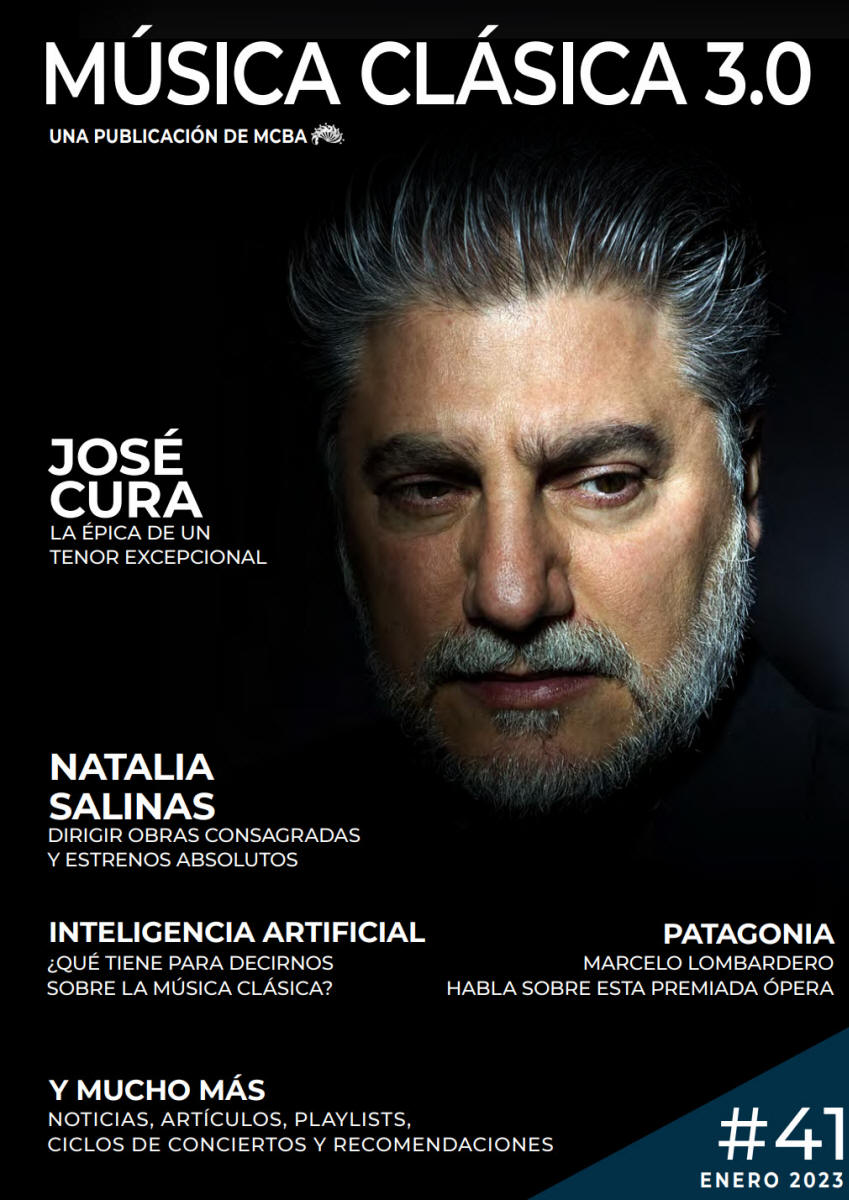
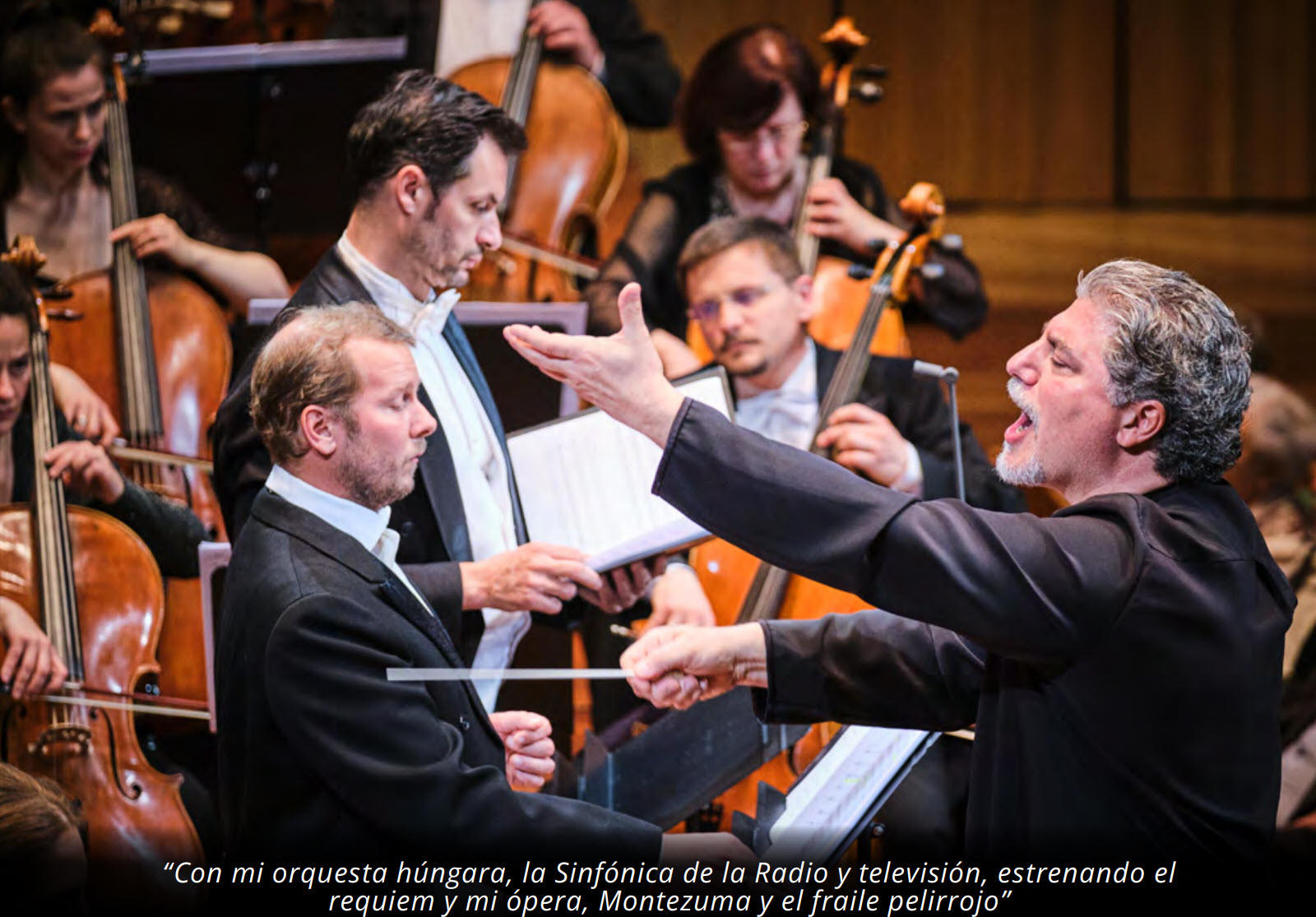
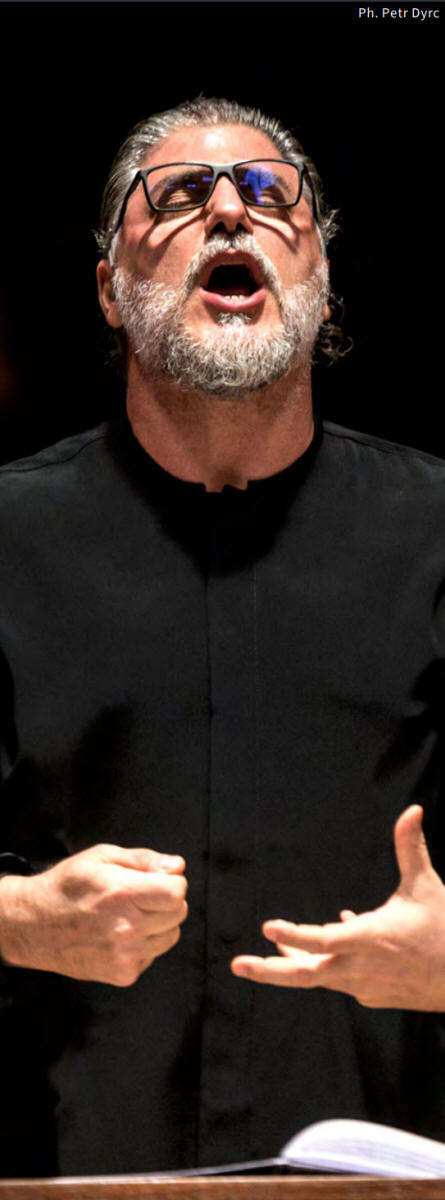
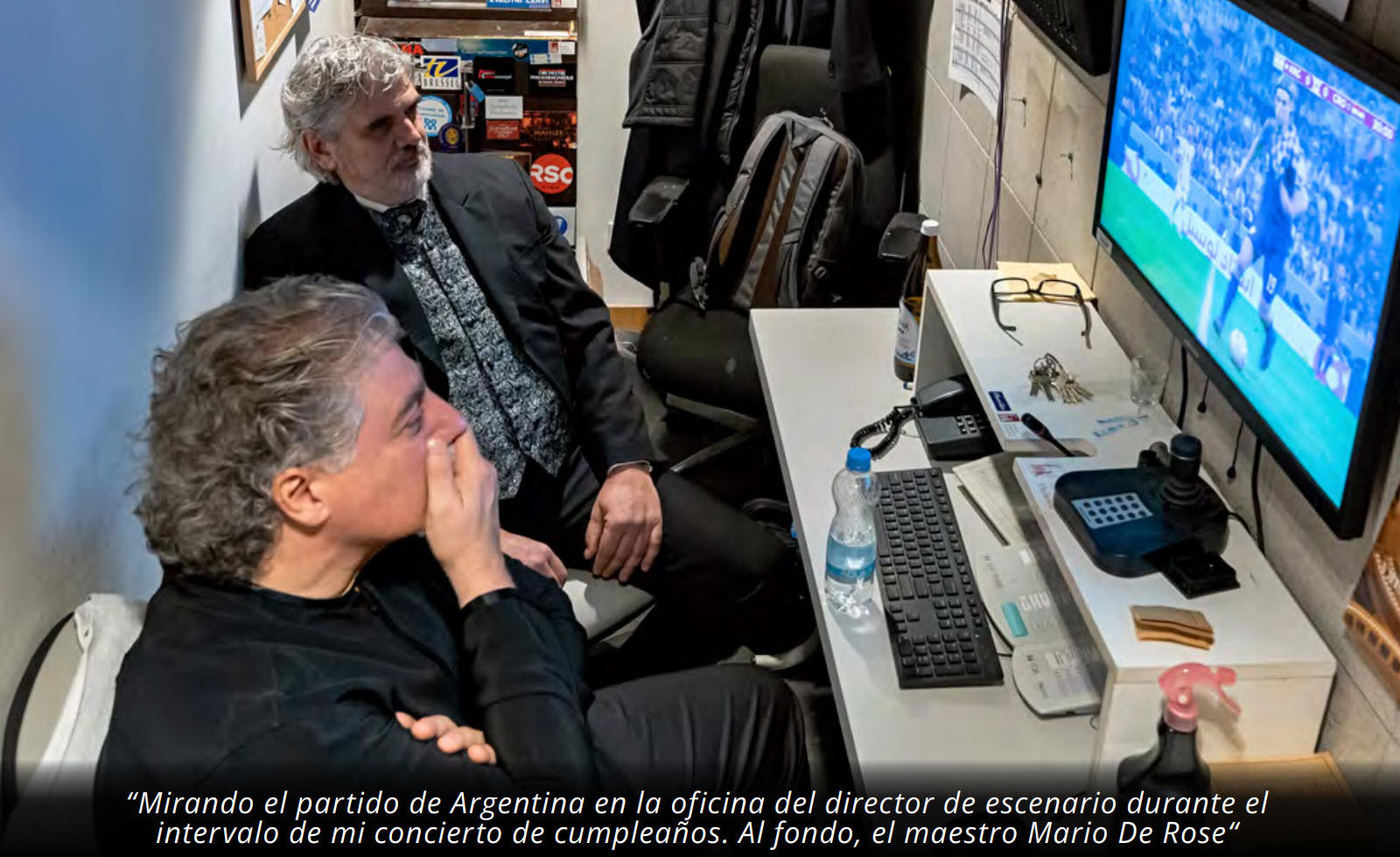
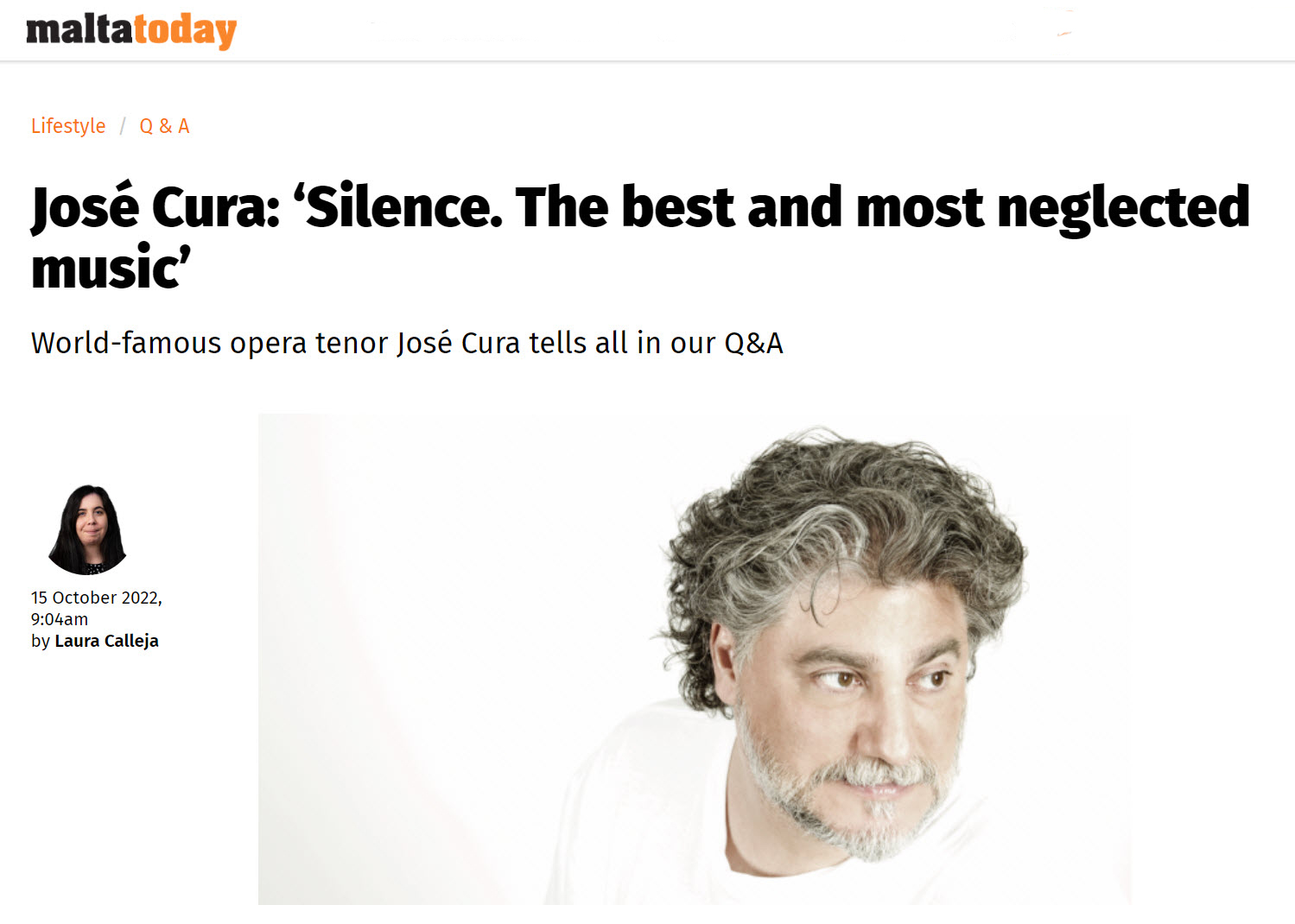
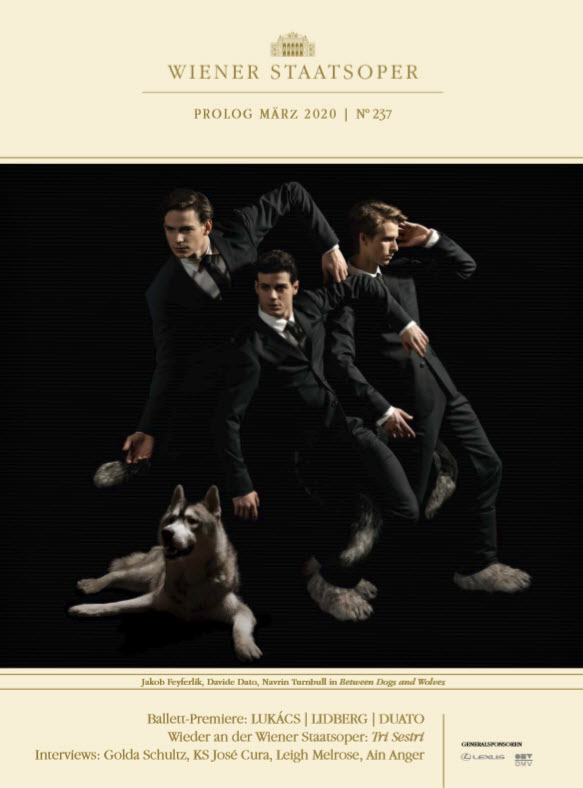
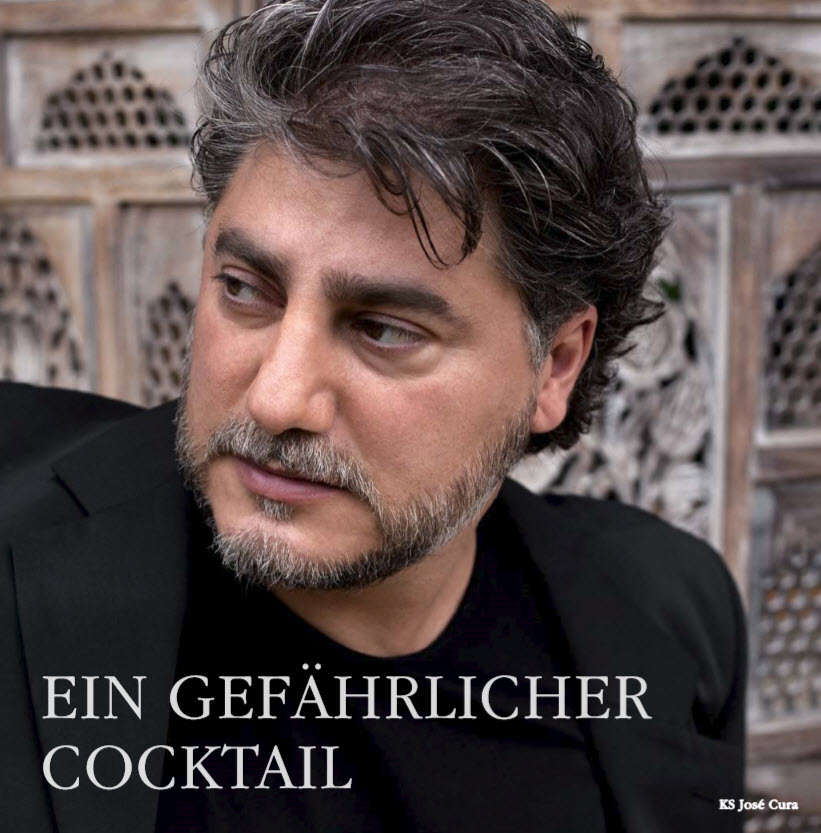
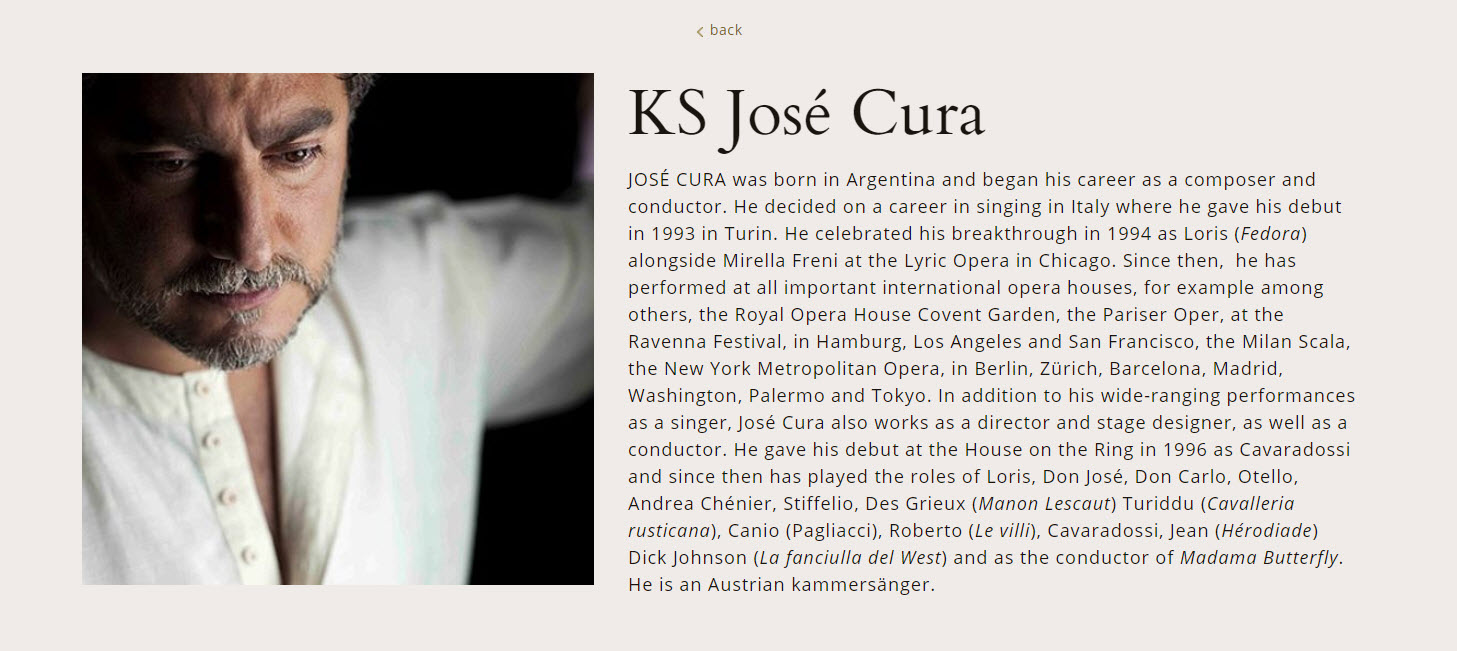
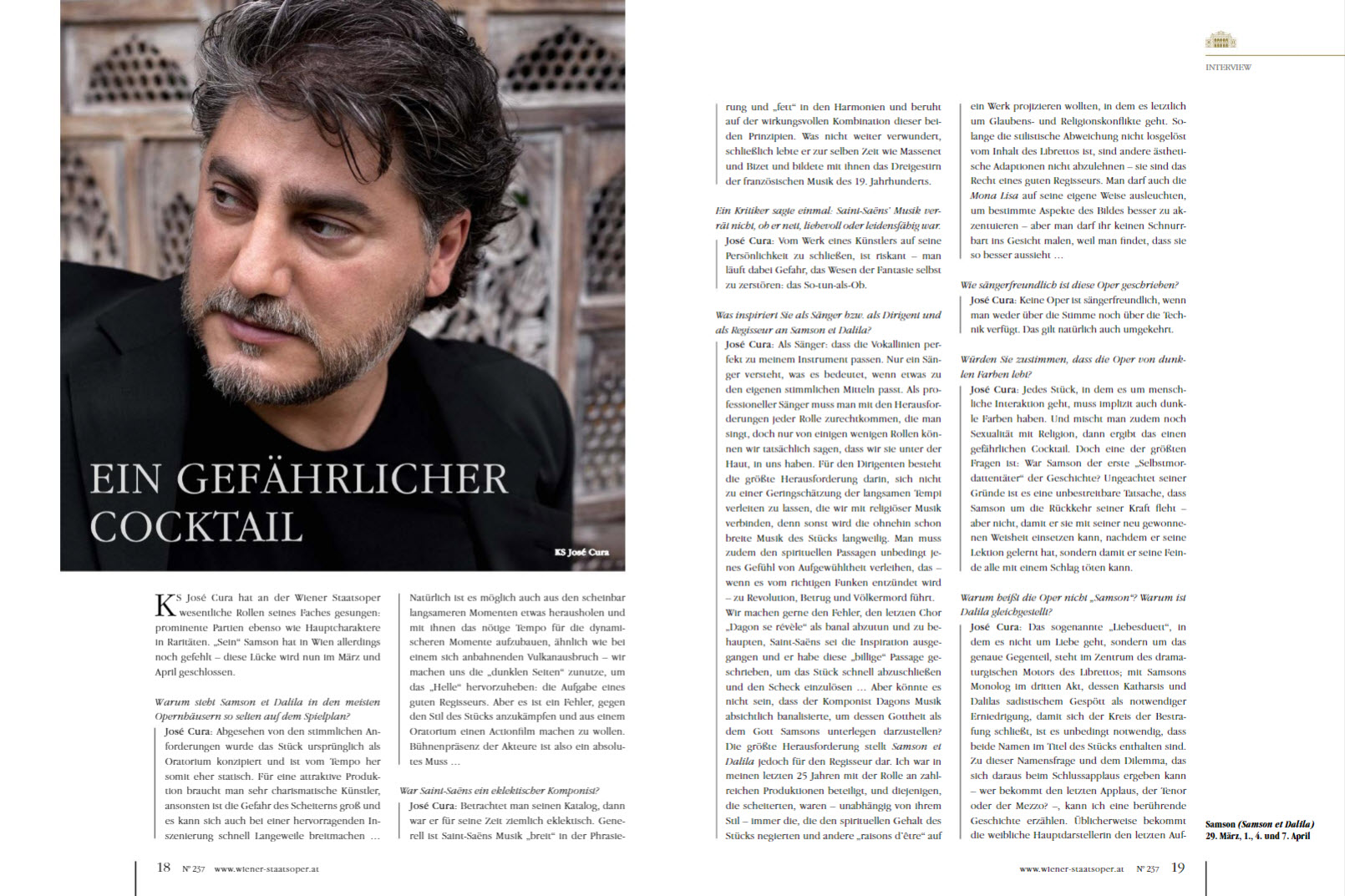
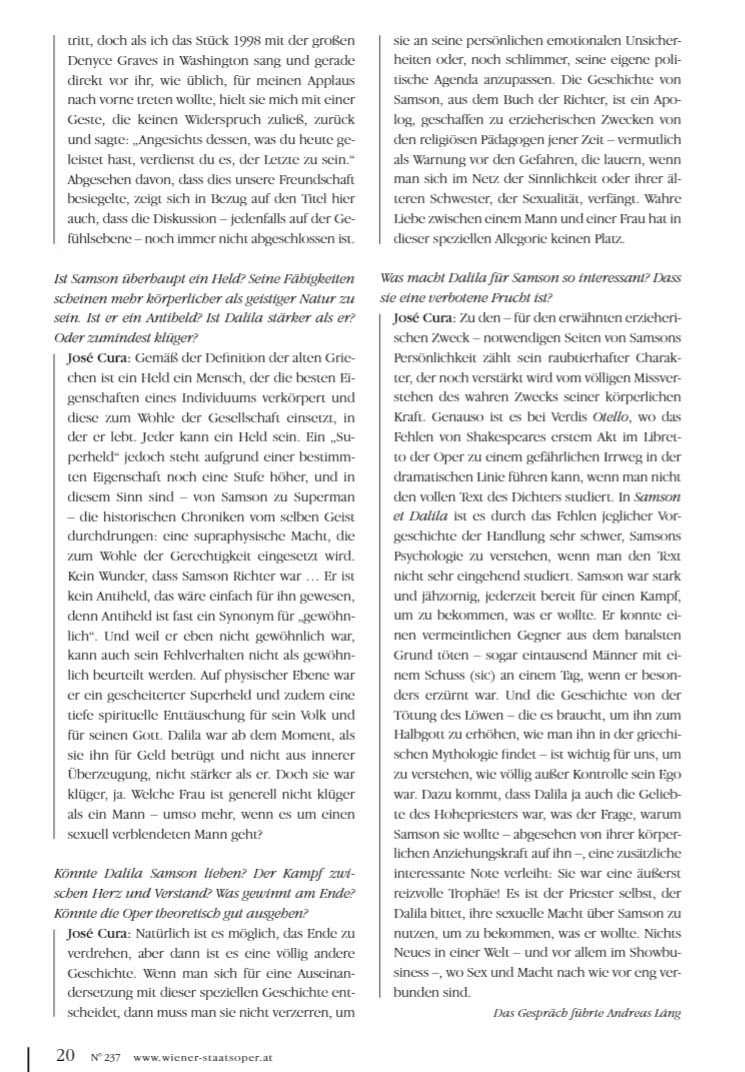
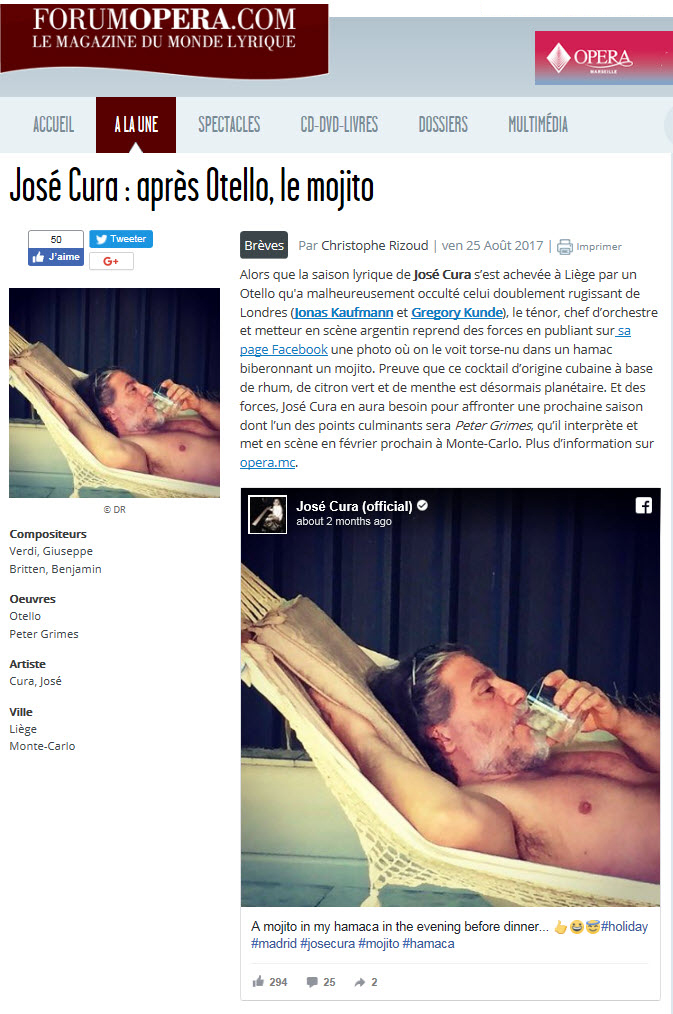

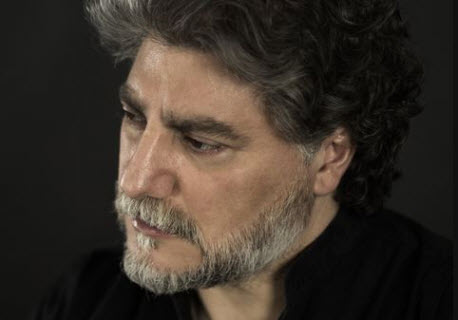
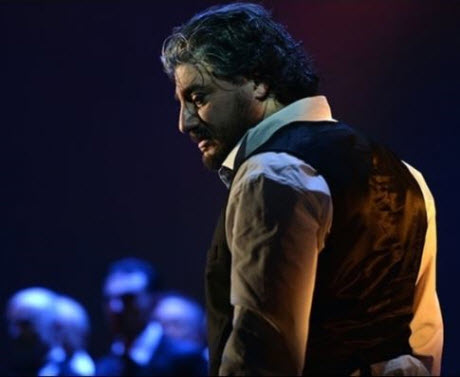
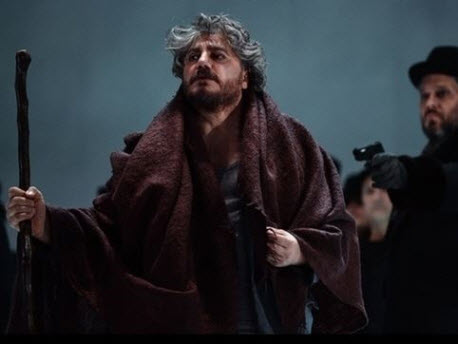
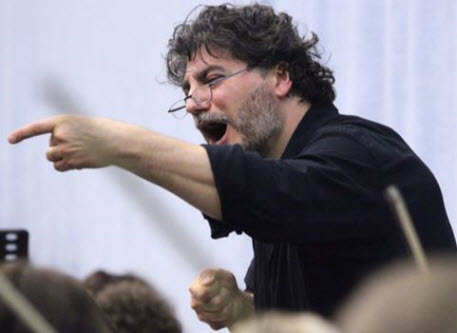
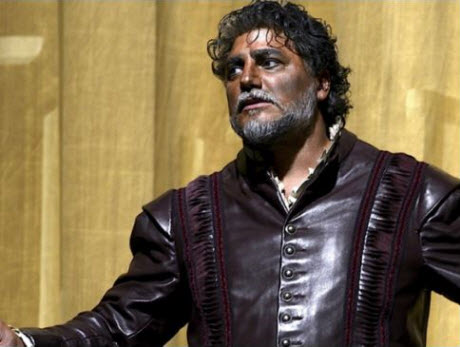
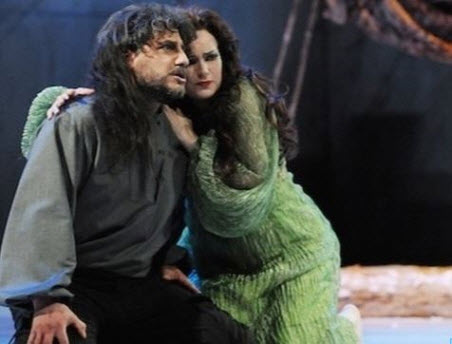

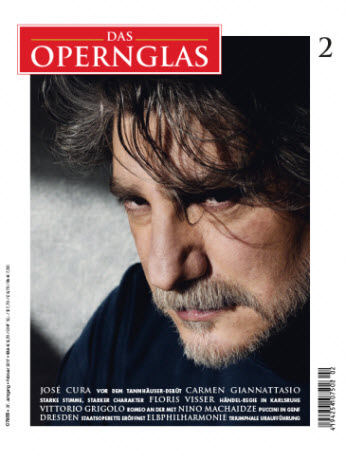 Q:
This season offers two eagerly anticipated role debuts: Tannhäuser
and Peter Grimes. Starting with the Wagner opera, which comes
out in February at Opéra de Monte-Carlo: As they are doing the French
version, the language actually should not be the problem; so what is
the main challenge for you?
Q:
This season offers two eagerly anticipated role debuts: Tannhäuser
and Peter Grimes. Starting with the Wagner opera, which comes
out in February at Opéra de Monte-Carlo: As they are doing the French
version, the language actually should not be the problem; so what is
the main challenge for you?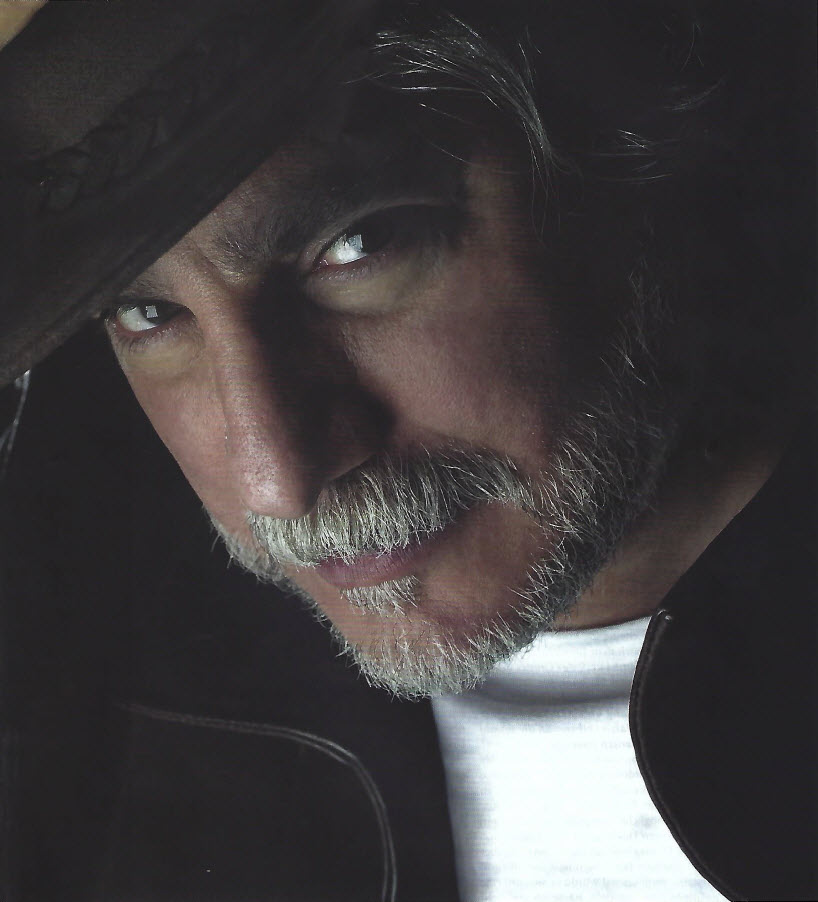
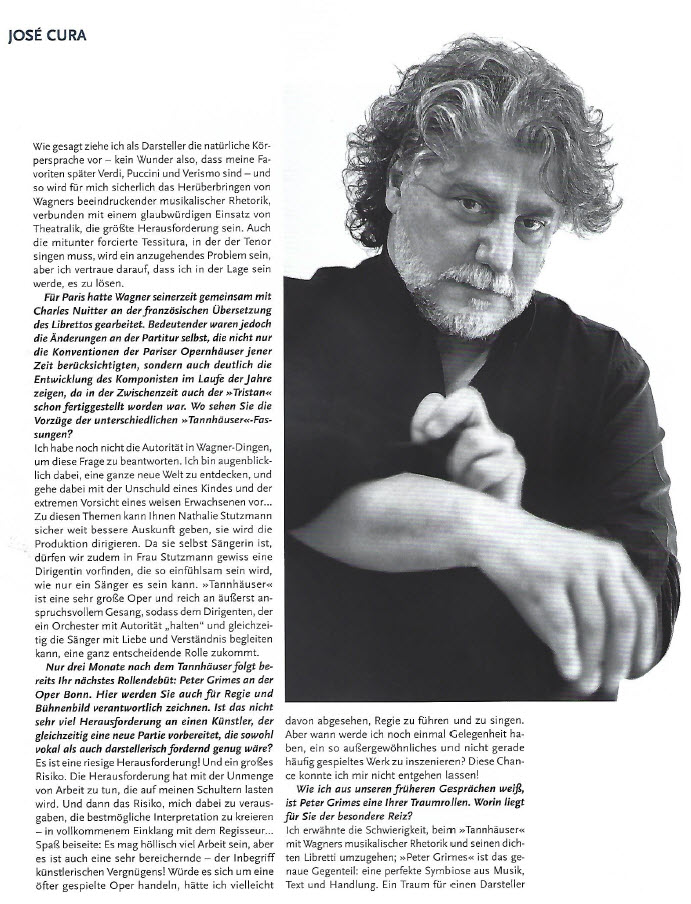
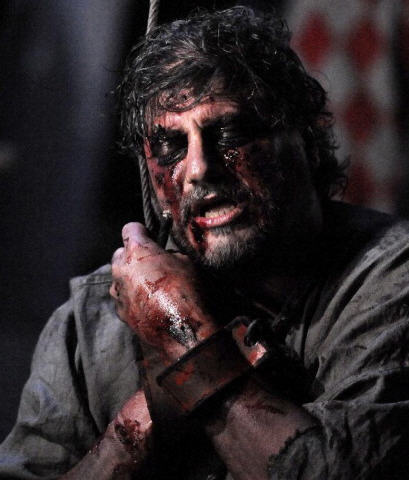
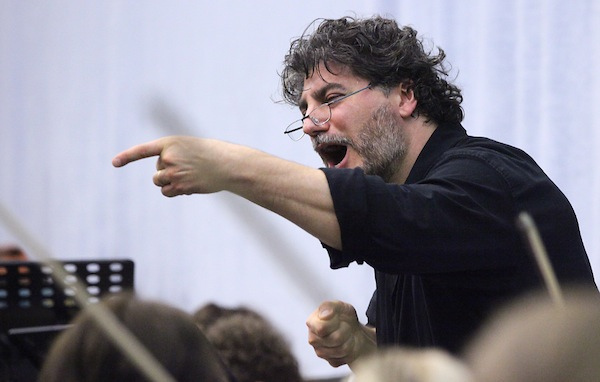
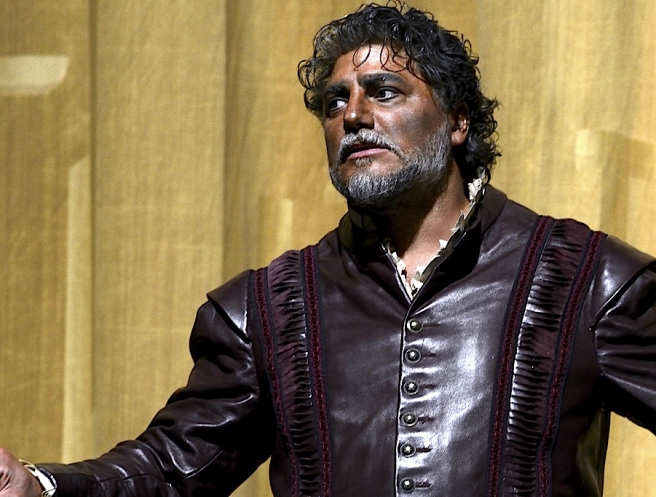 Cura:
I have only performed a couple of times in Croatia, but enough to feel
the enormous professionalism of the Croatian musicians and the great
energy of its public. I have never been in Dubrovnik, but I cannot wait
to get there because it is well known how beautiful the city is. The
program has been done upon the requests of the Festival and the wish
of Mo. Tarbuk to dedicate part of the concert to the Spanish repertoire.
Cura:
I have only performed a couple of times in Croatia, but enough to feel
the enormous professionalism of the Croatian musicians and the great
energy of its public. I have never been in Dubrovnik, but I cannot wait
to get there because it is well known how beautiful the city is. The
program has been done upon the requests of the Festival and the wish
of Mo. Tarbuk to dedicate part of the concert to the Spanish repertoire.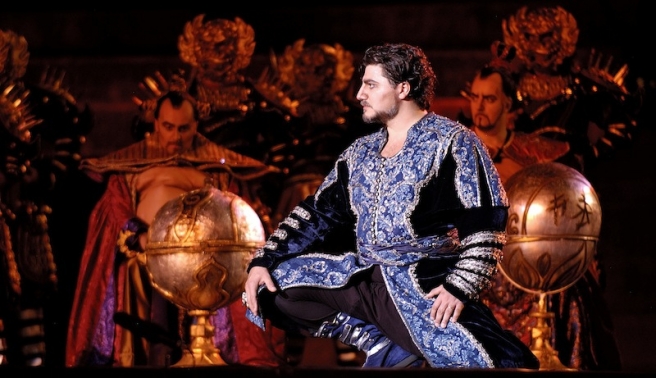
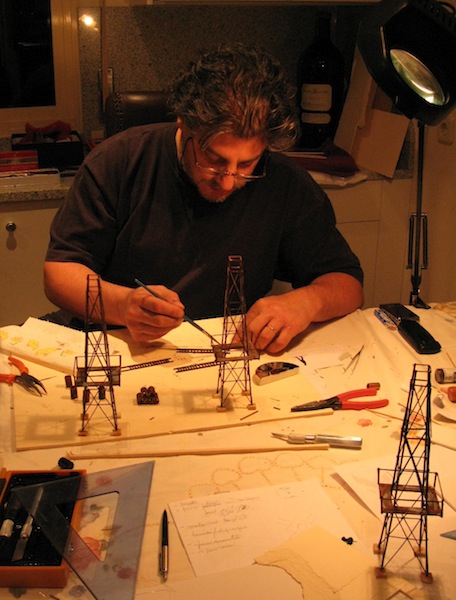 Telegram:
How important were Horacio Amauri and Vittorio Terranova for the moulding
of your vocal skill?
Telegram:
How important were Horacio Amauri and Vittorio Terranova for the moulding
of your vocal skill?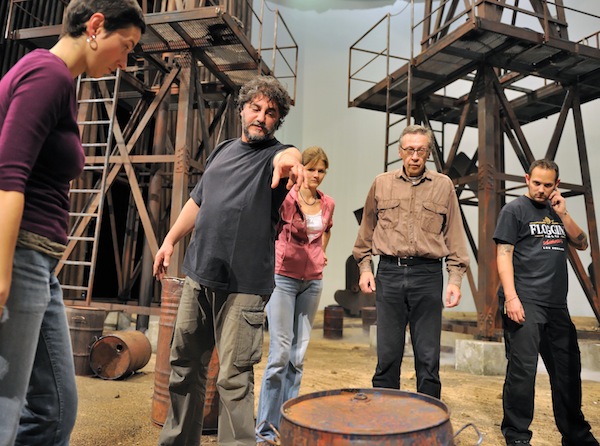
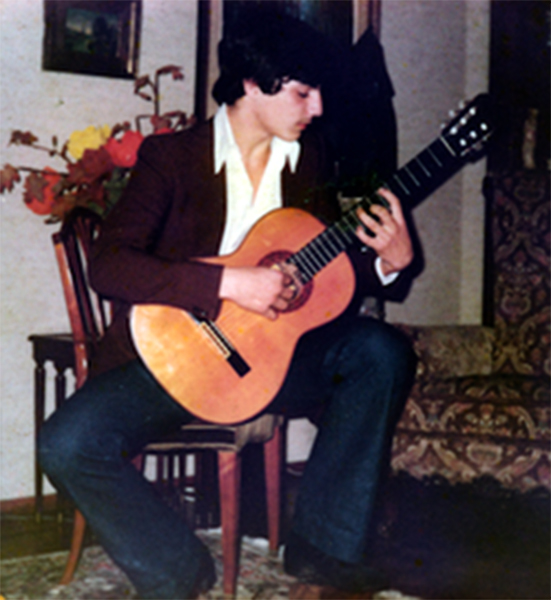

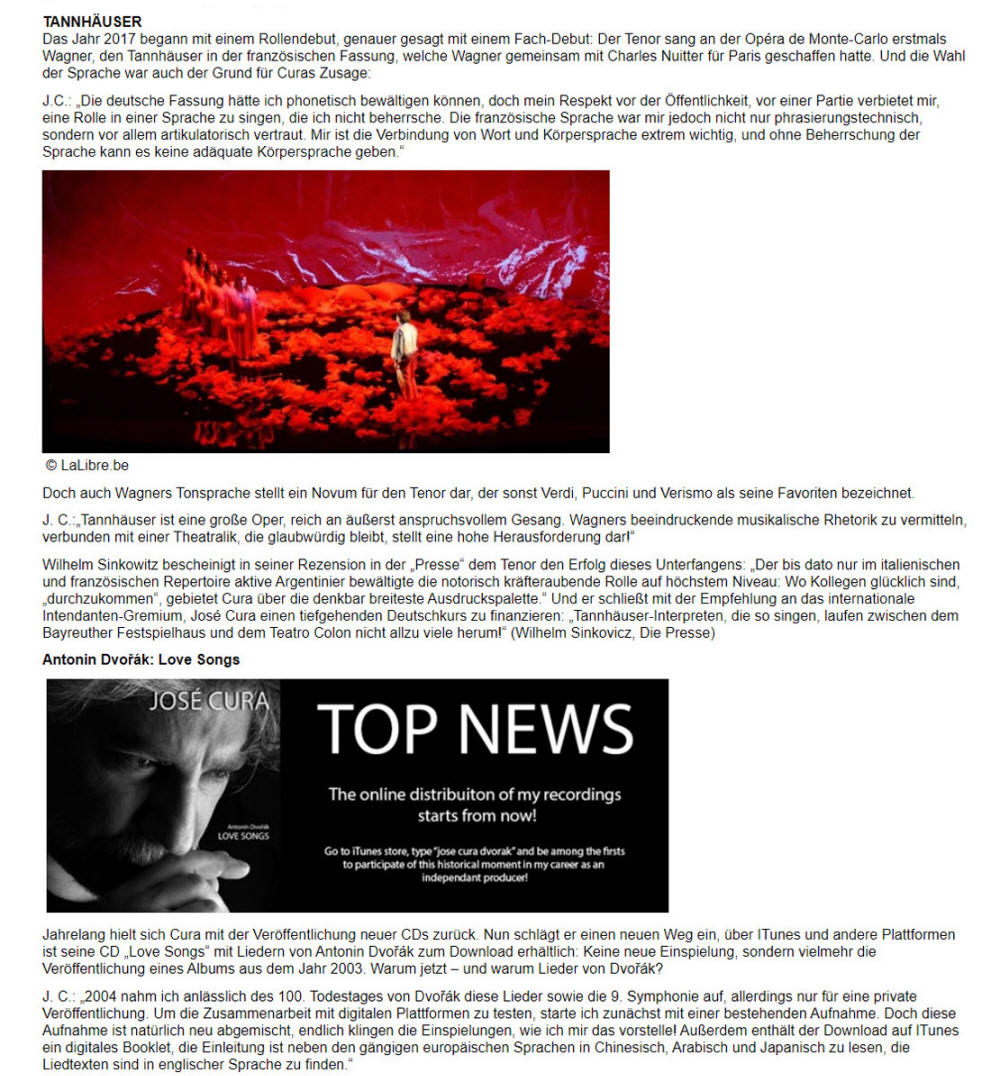
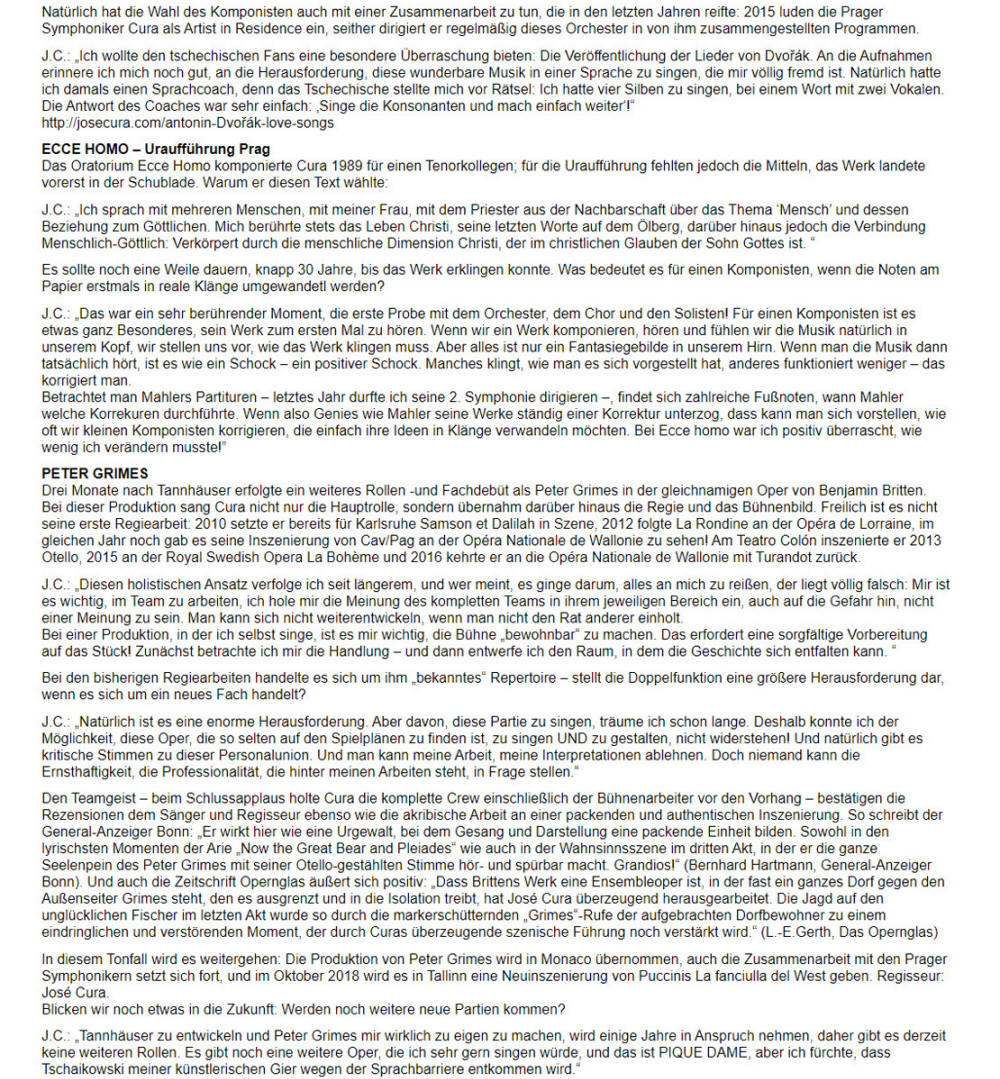
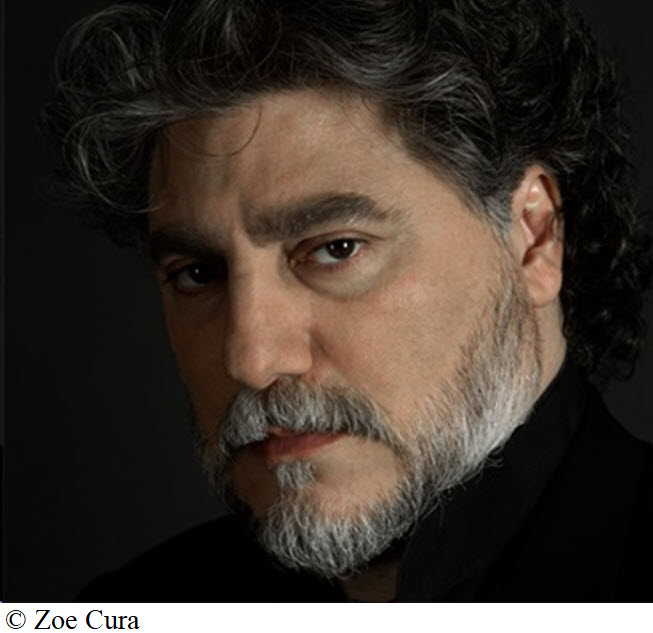
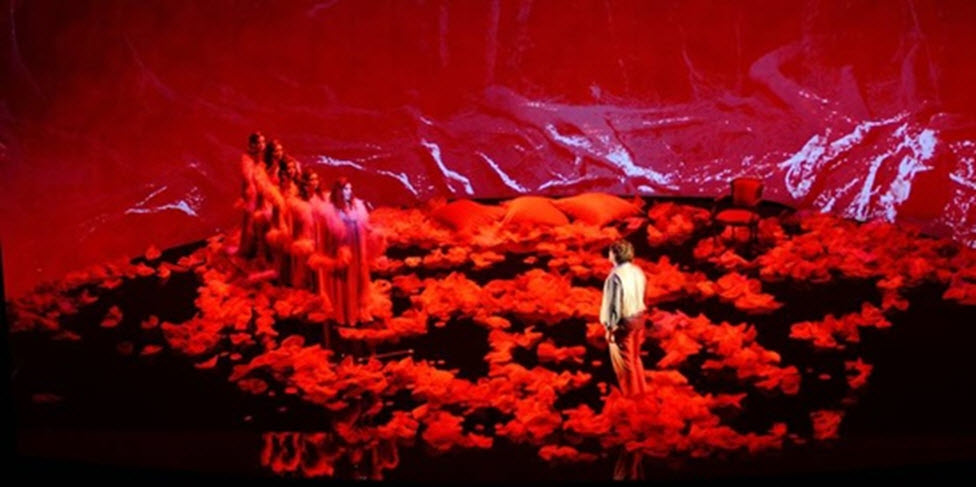

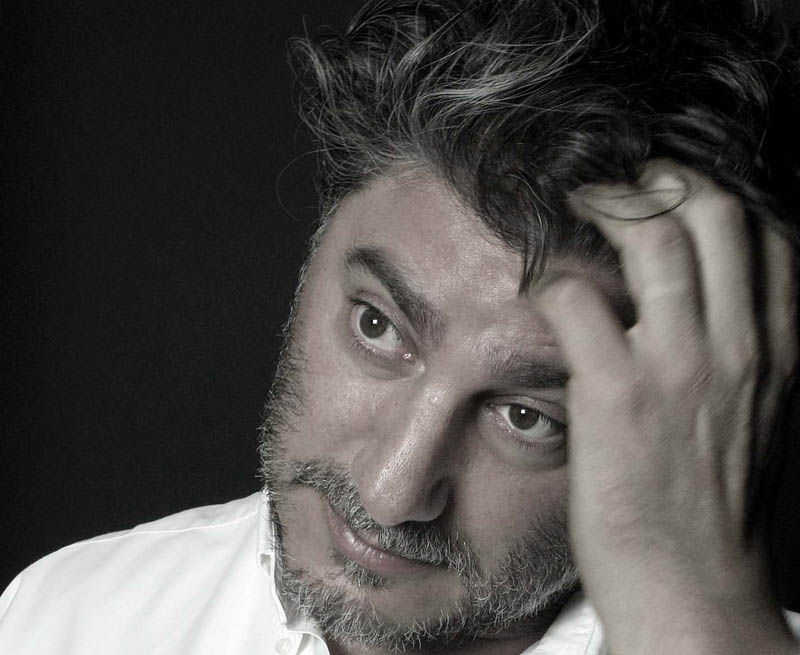
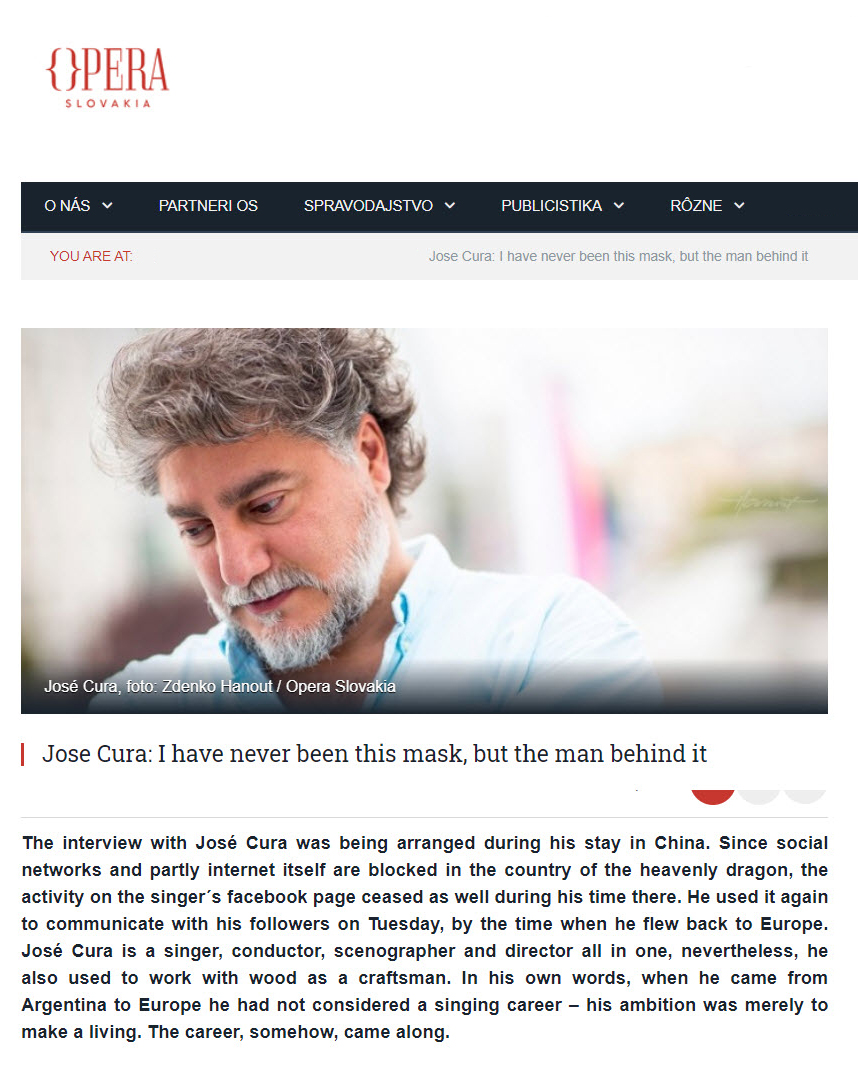
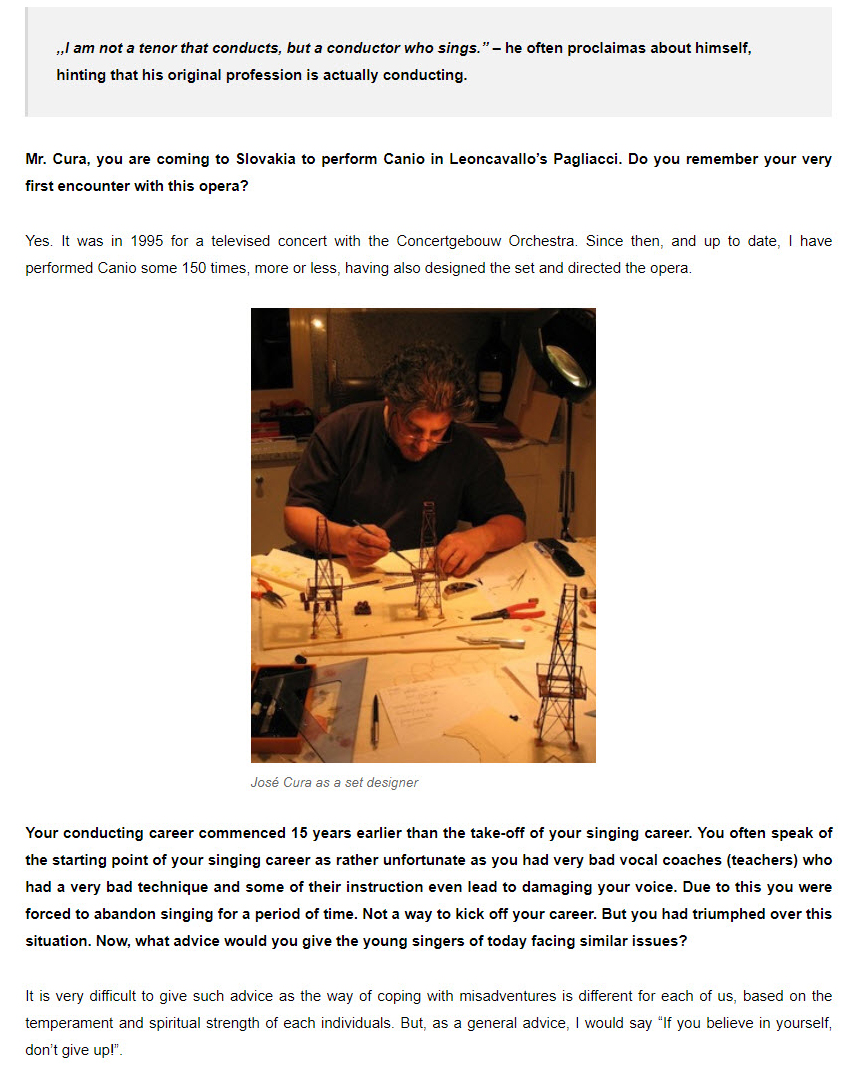
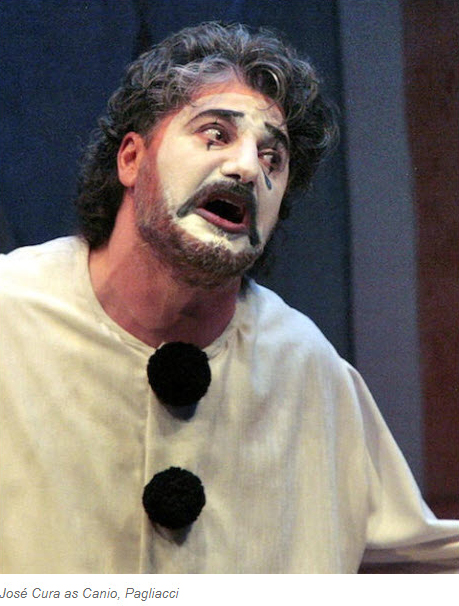
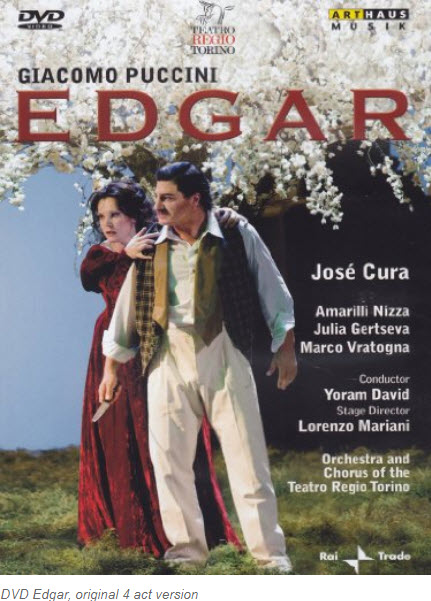
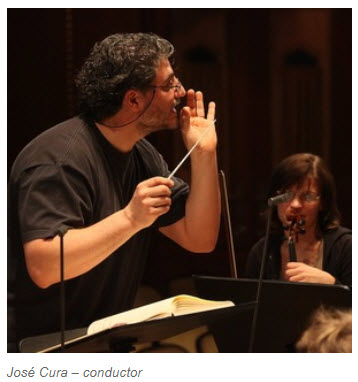
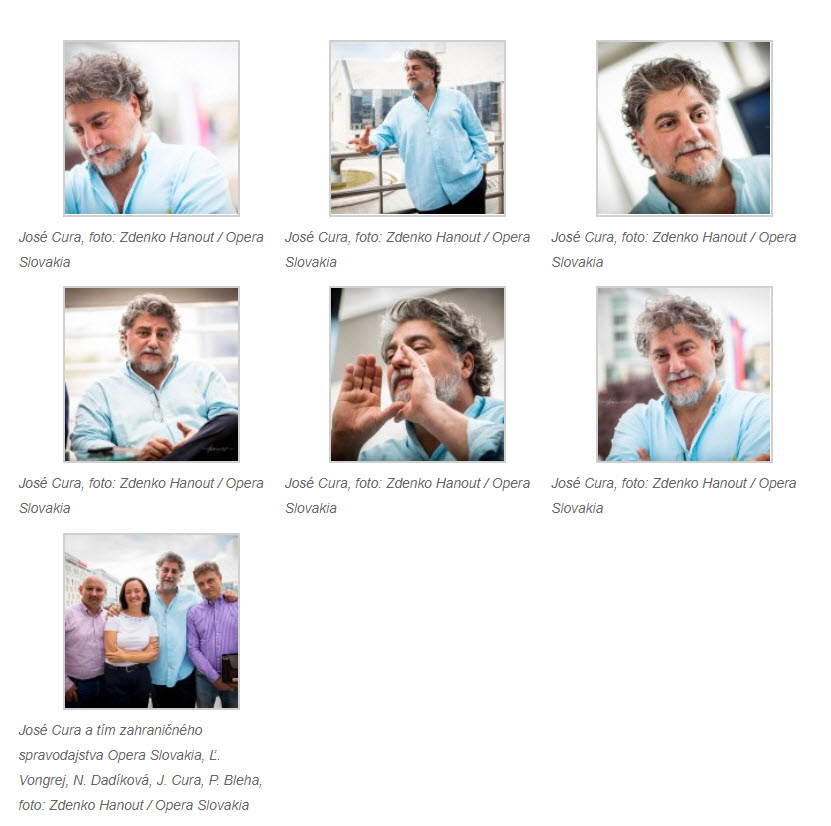
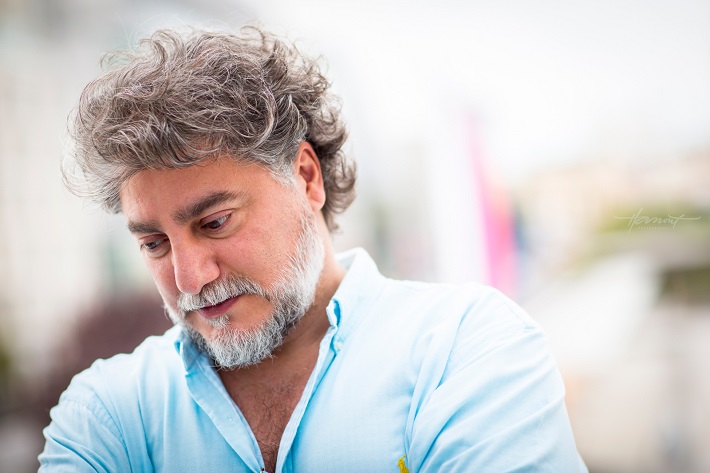
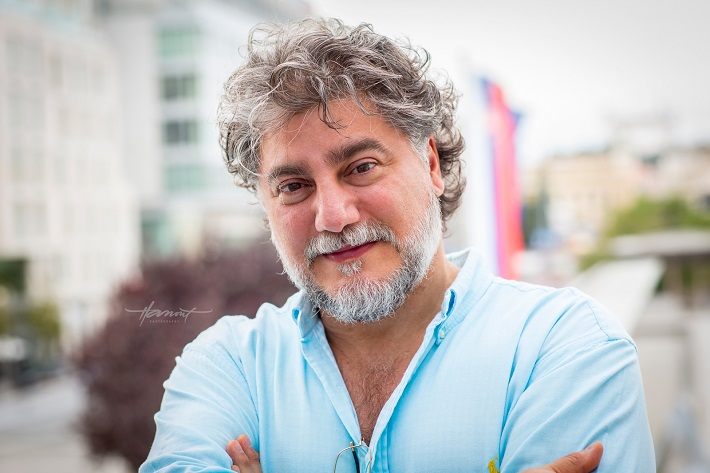
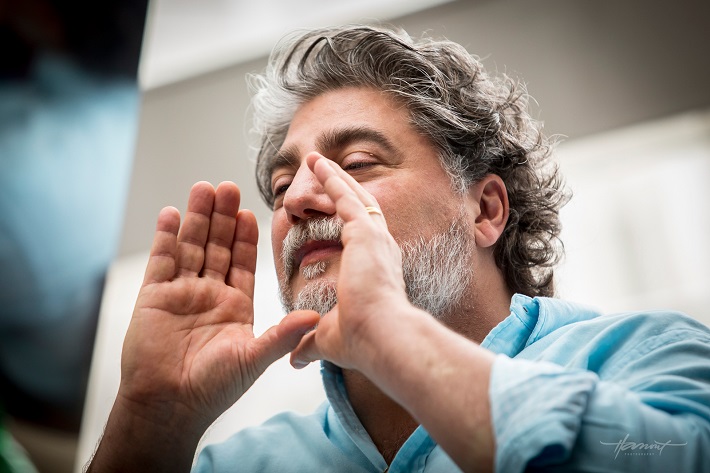
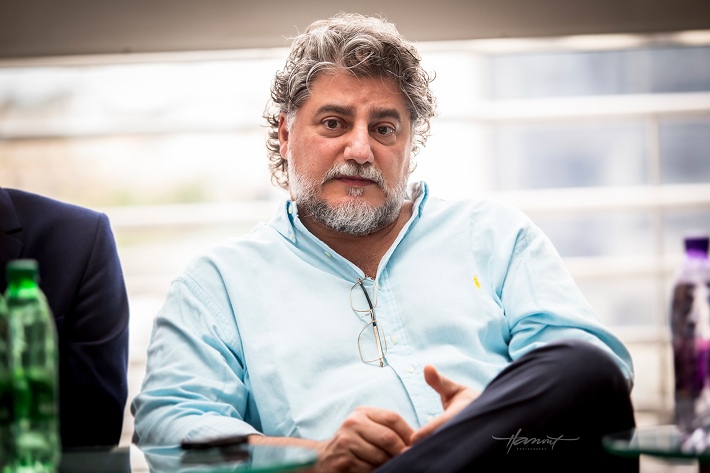
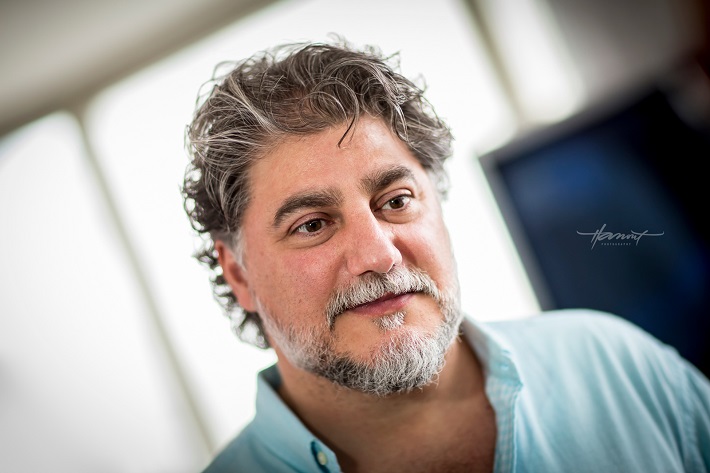
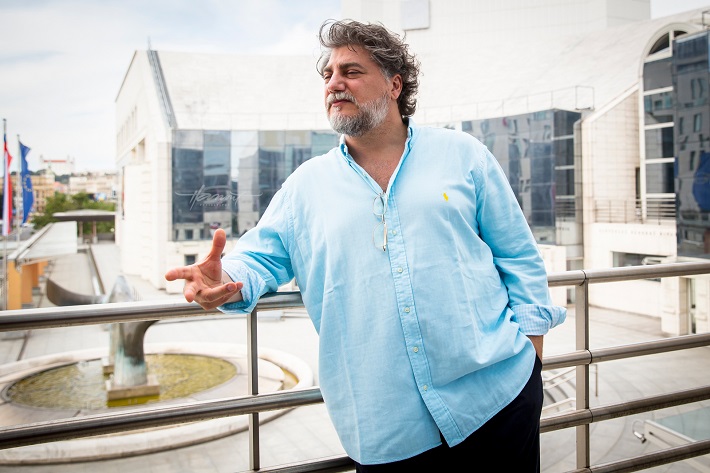
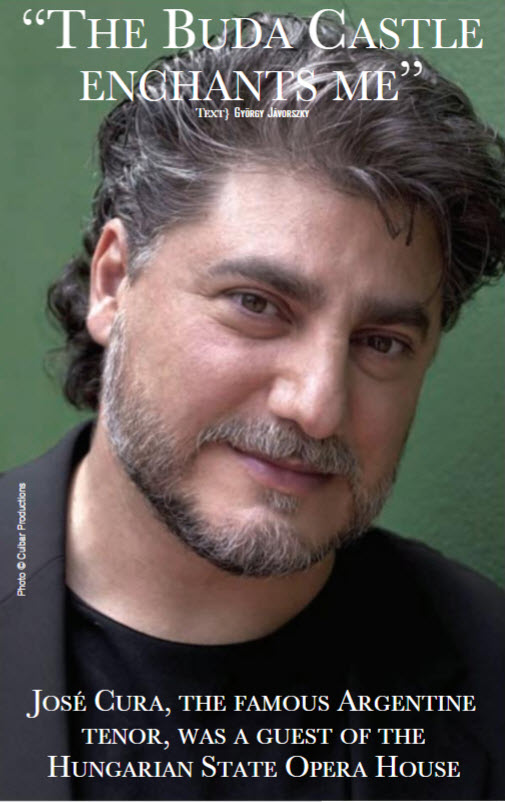
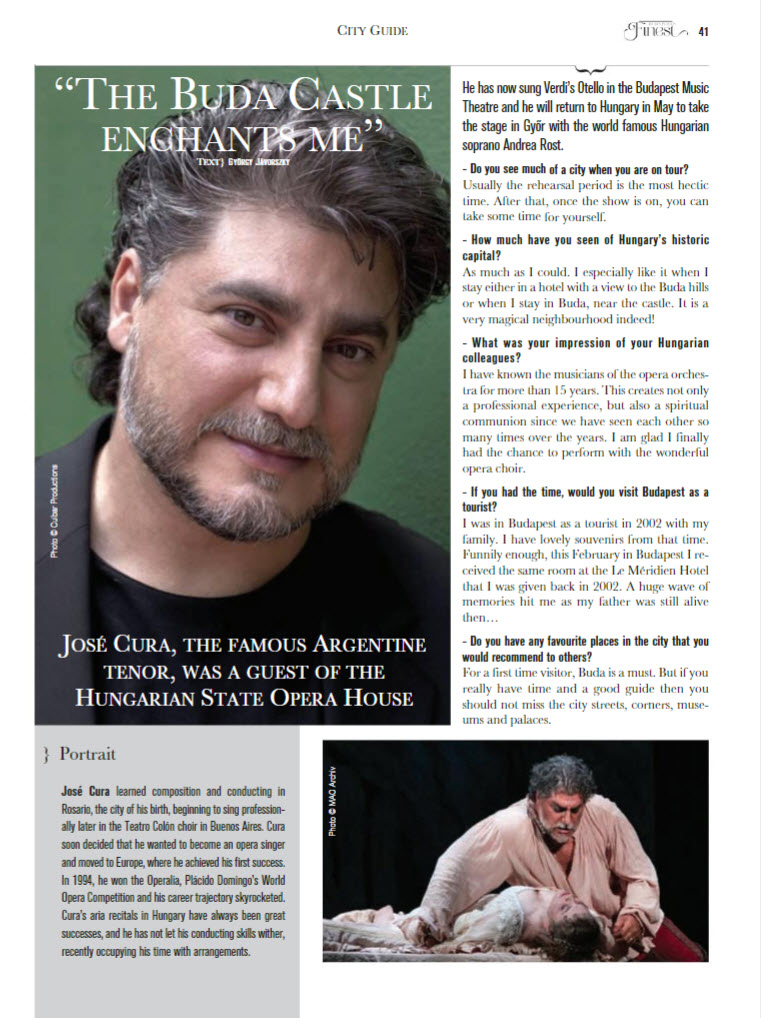
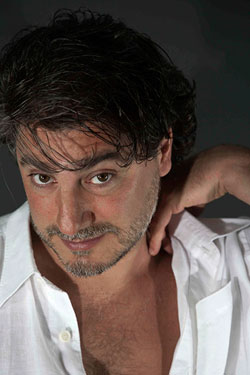
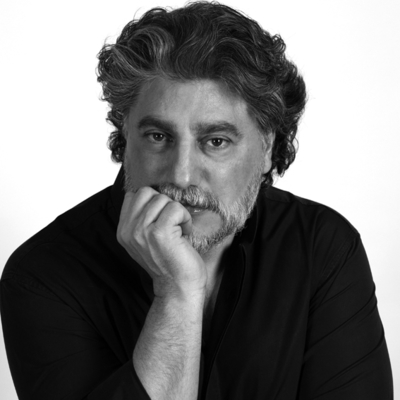
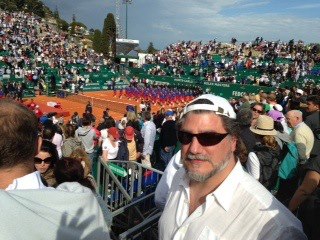

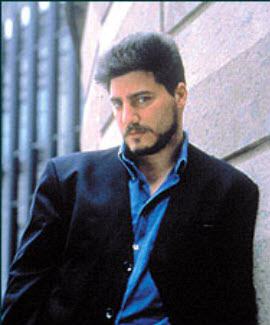
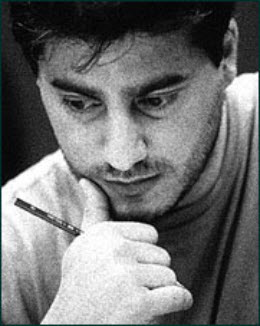
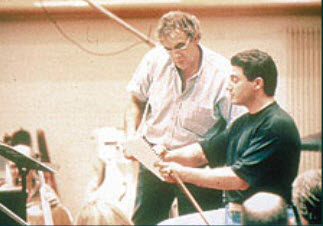
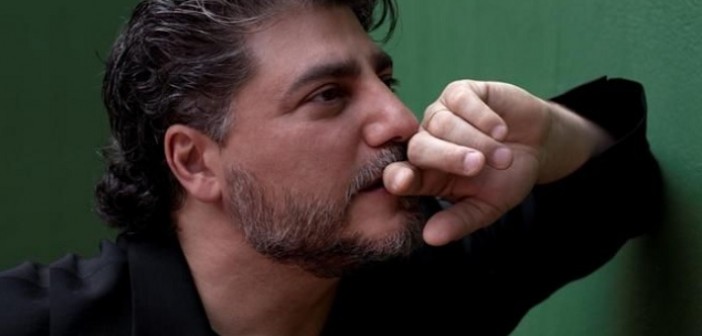
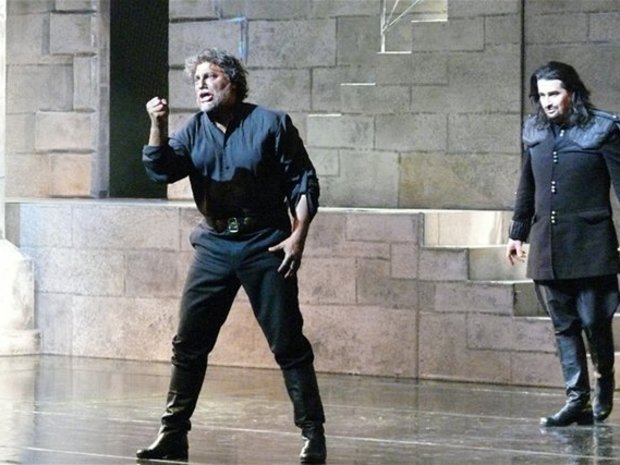
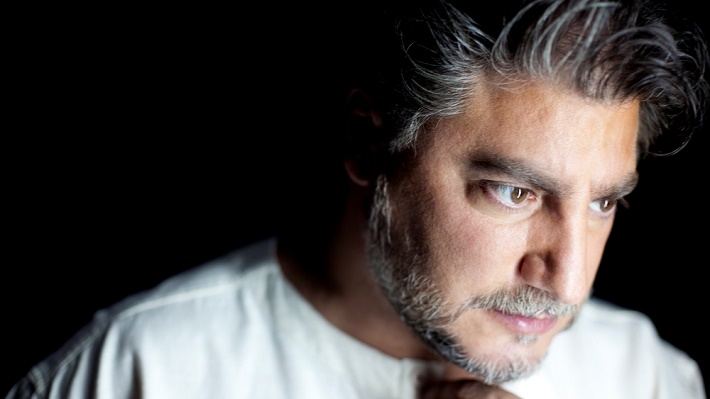
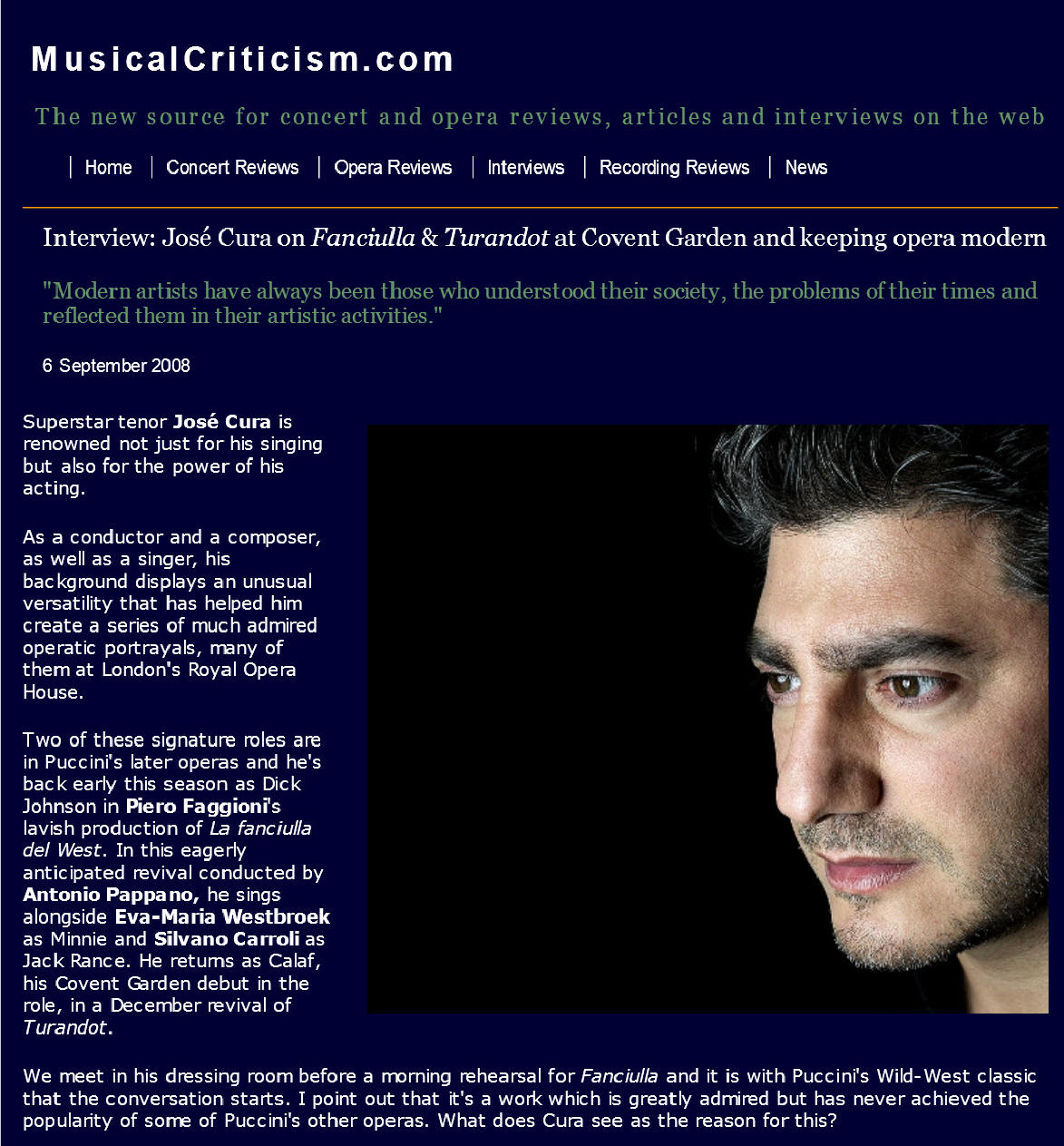
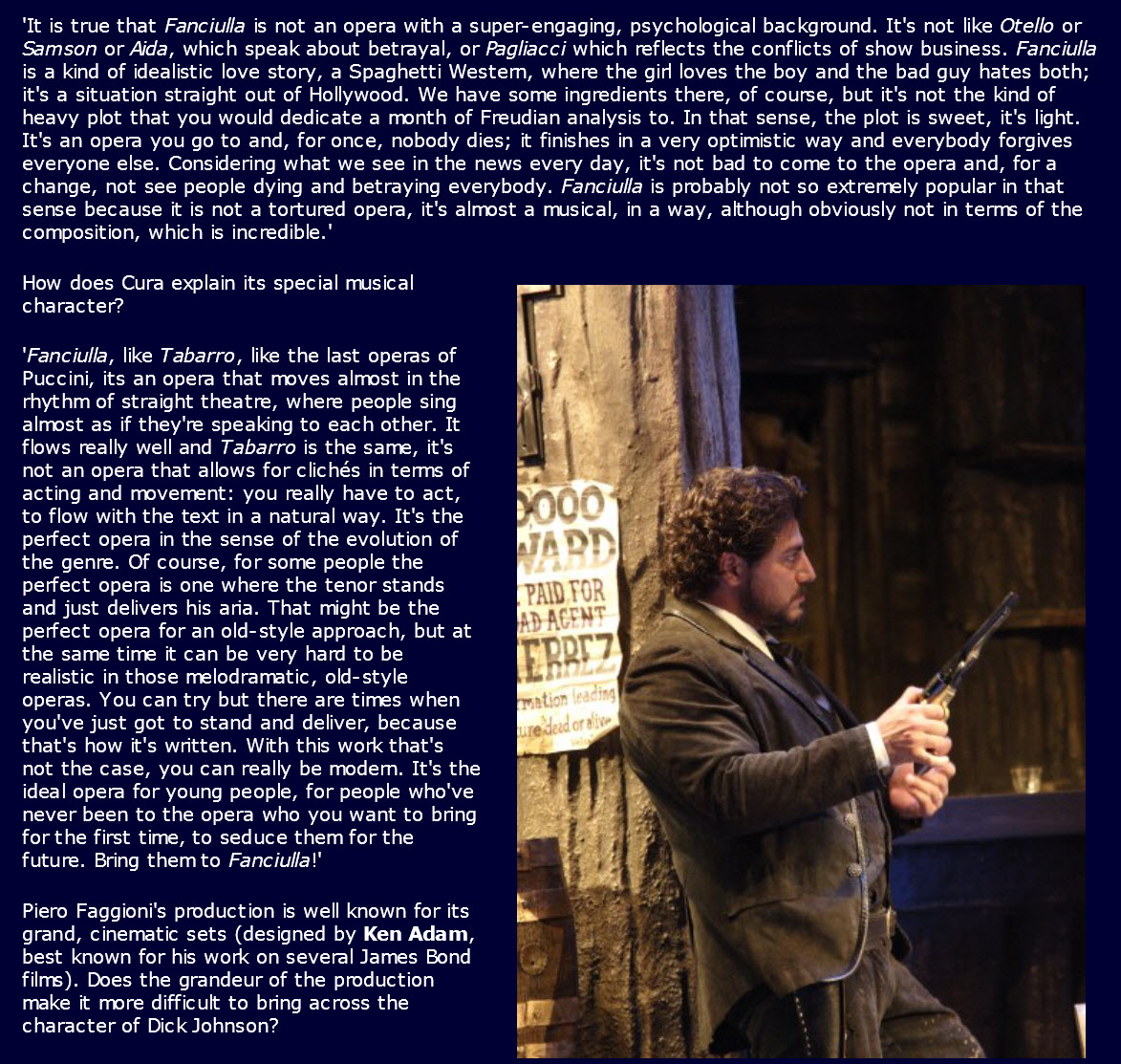
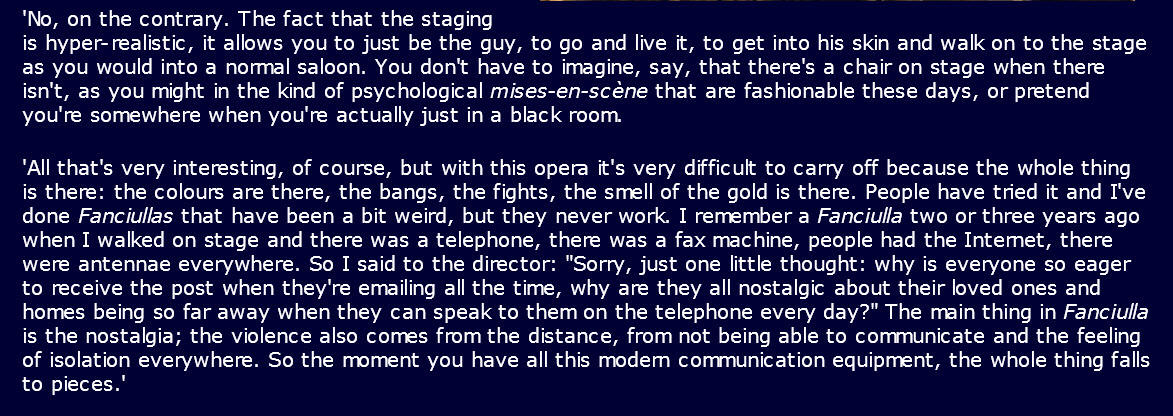
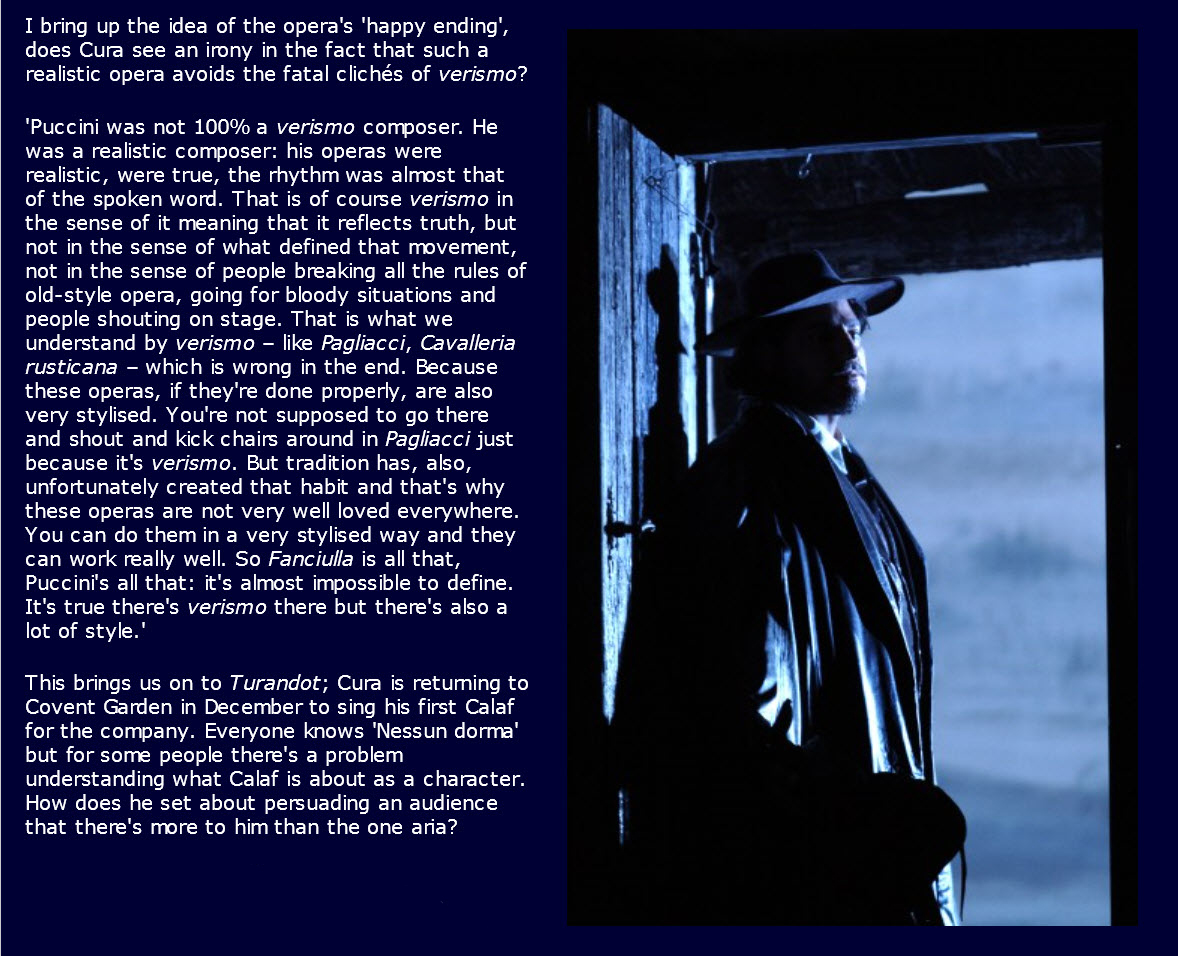
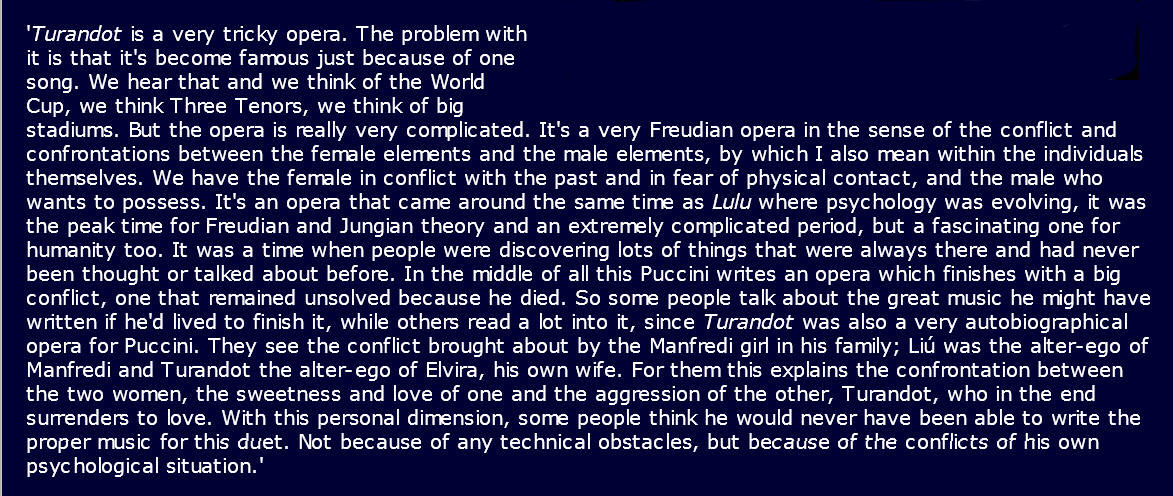
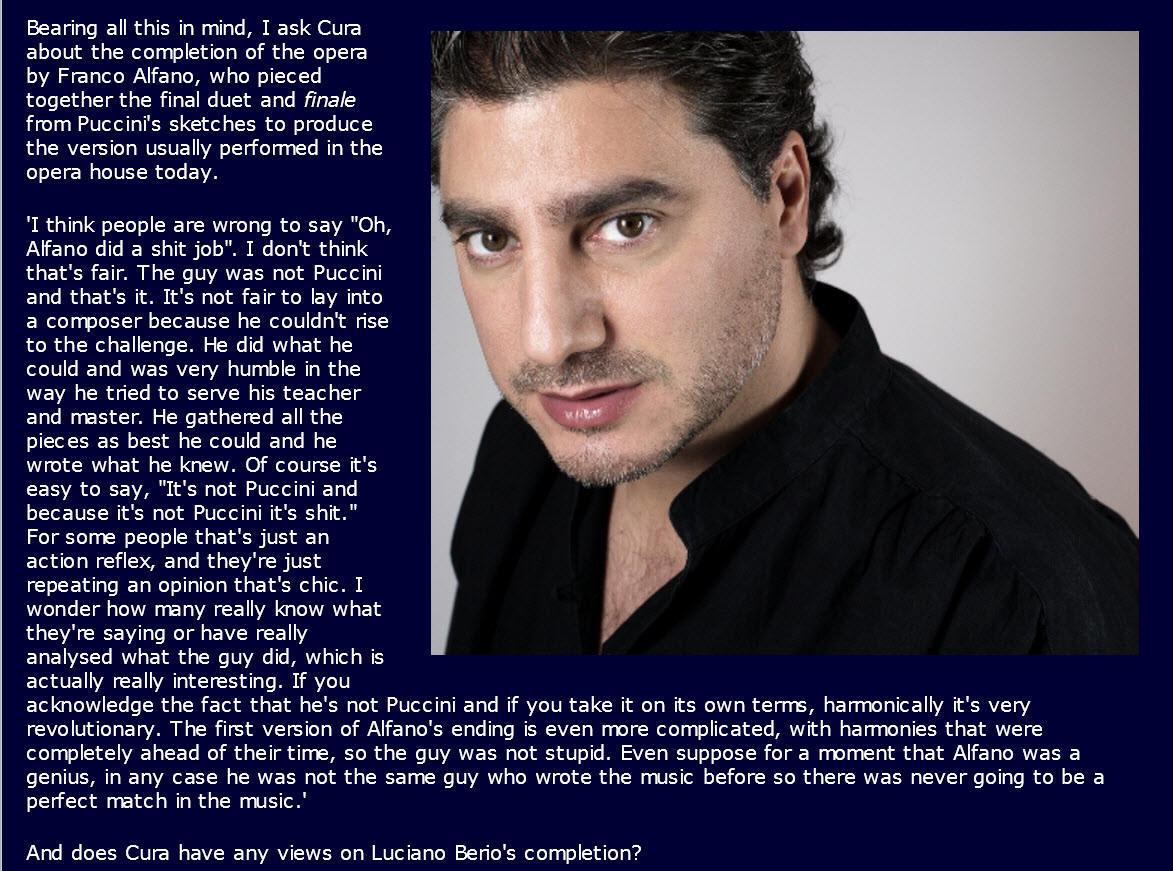

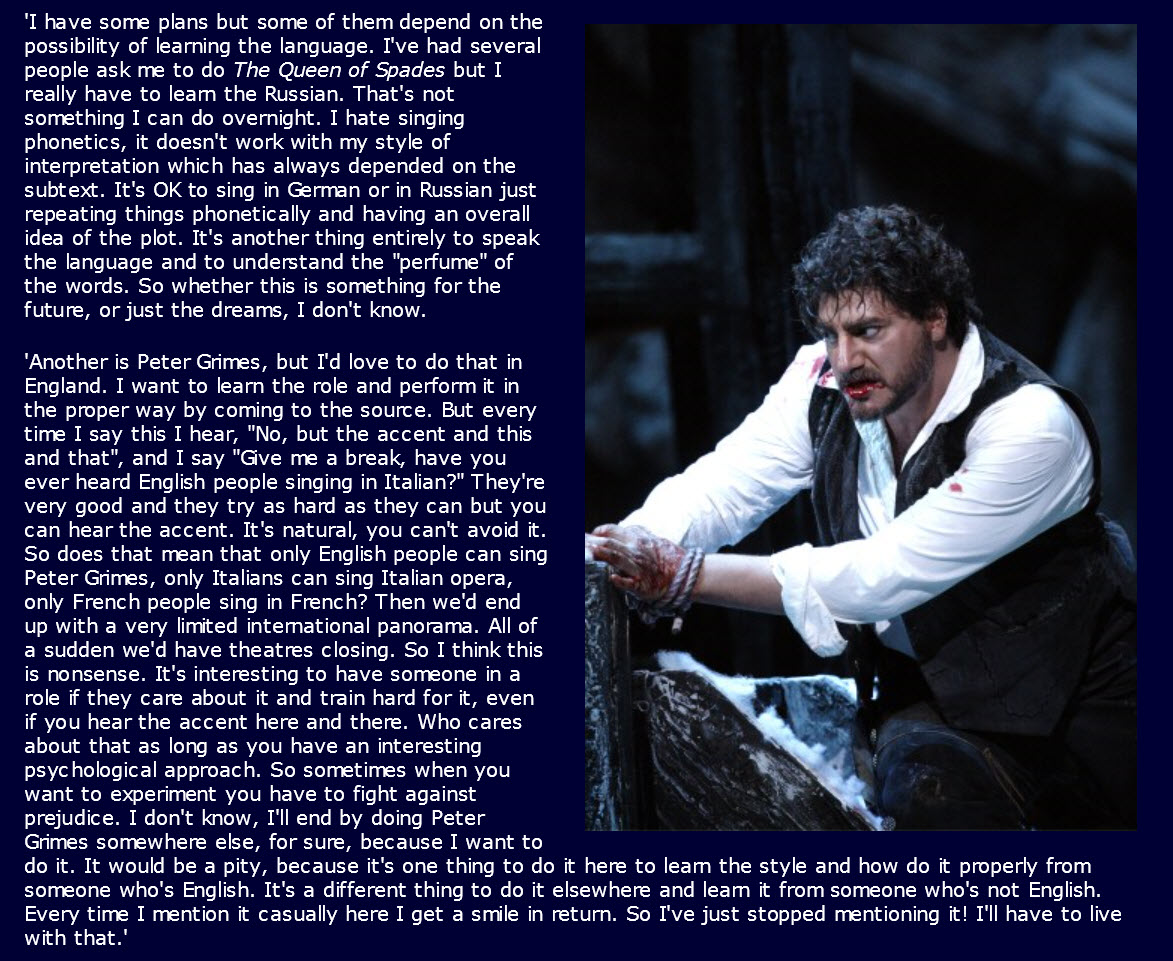

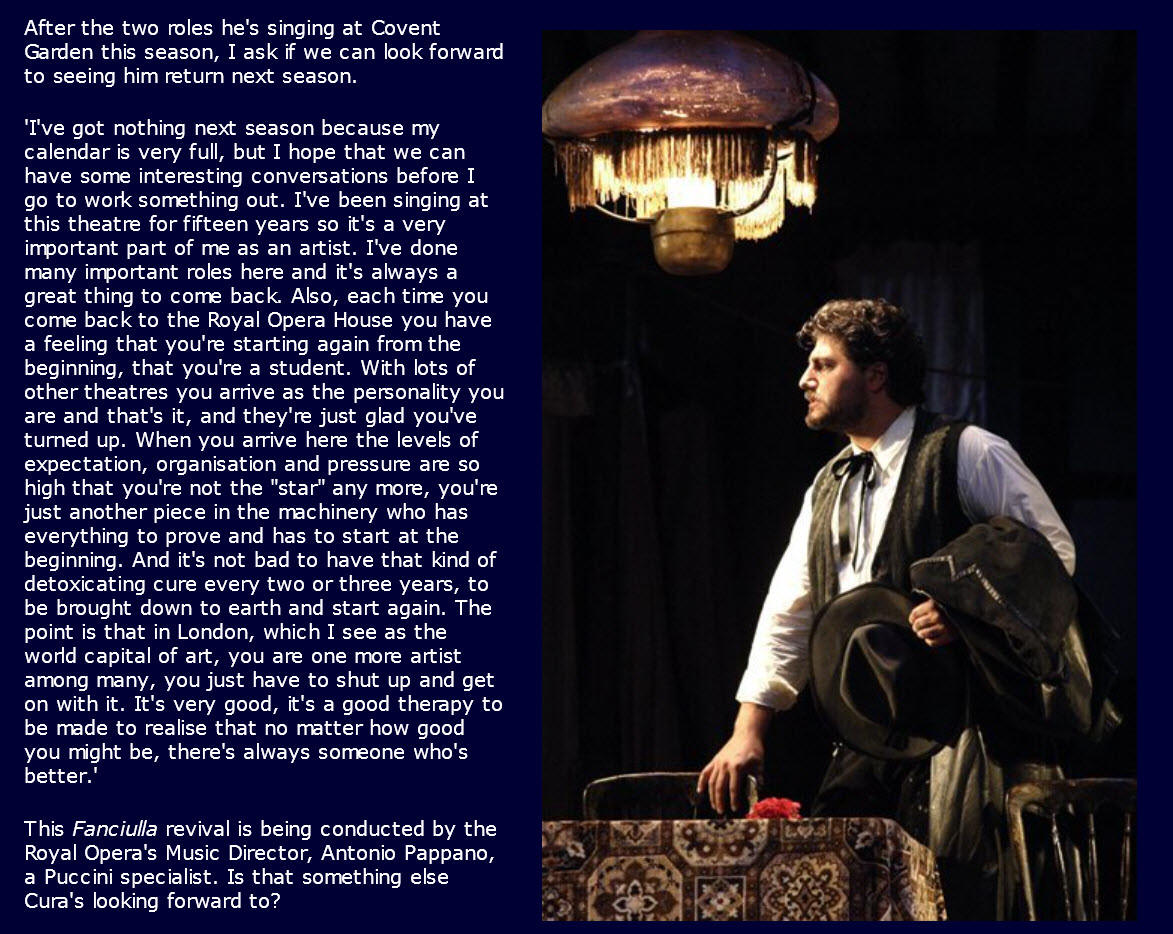

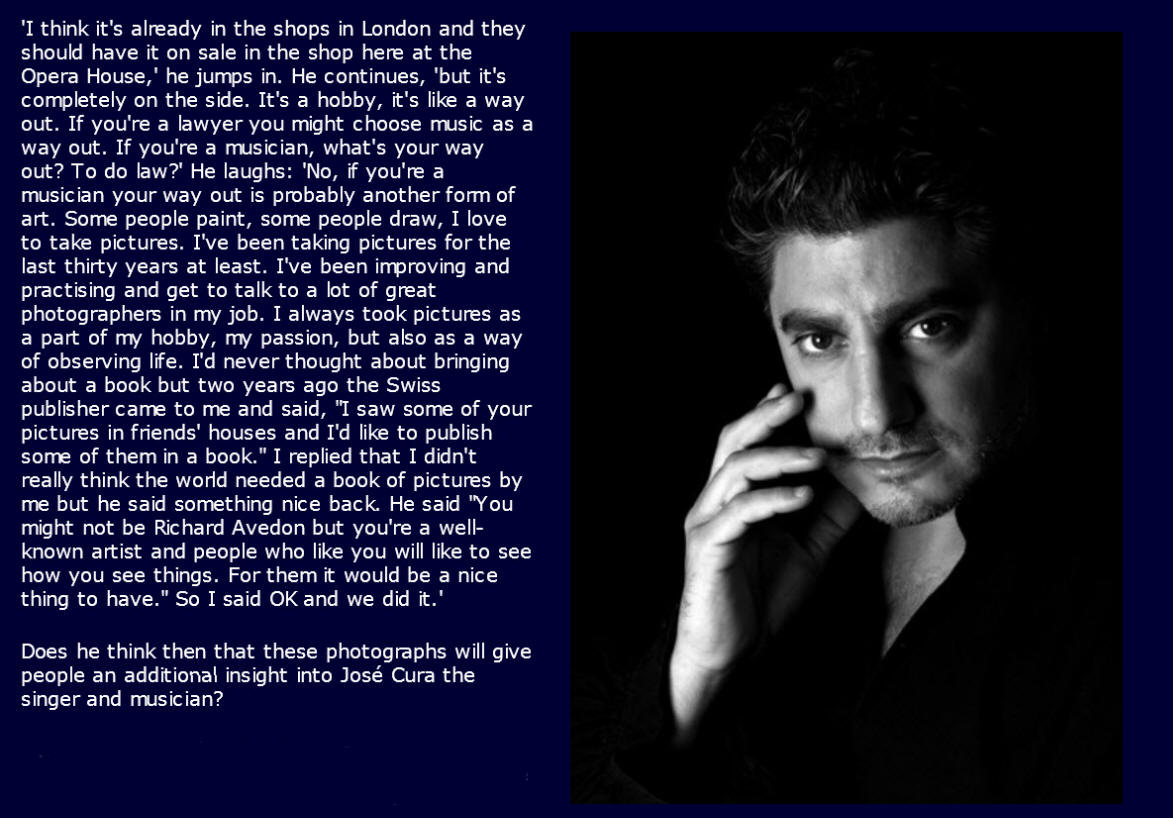
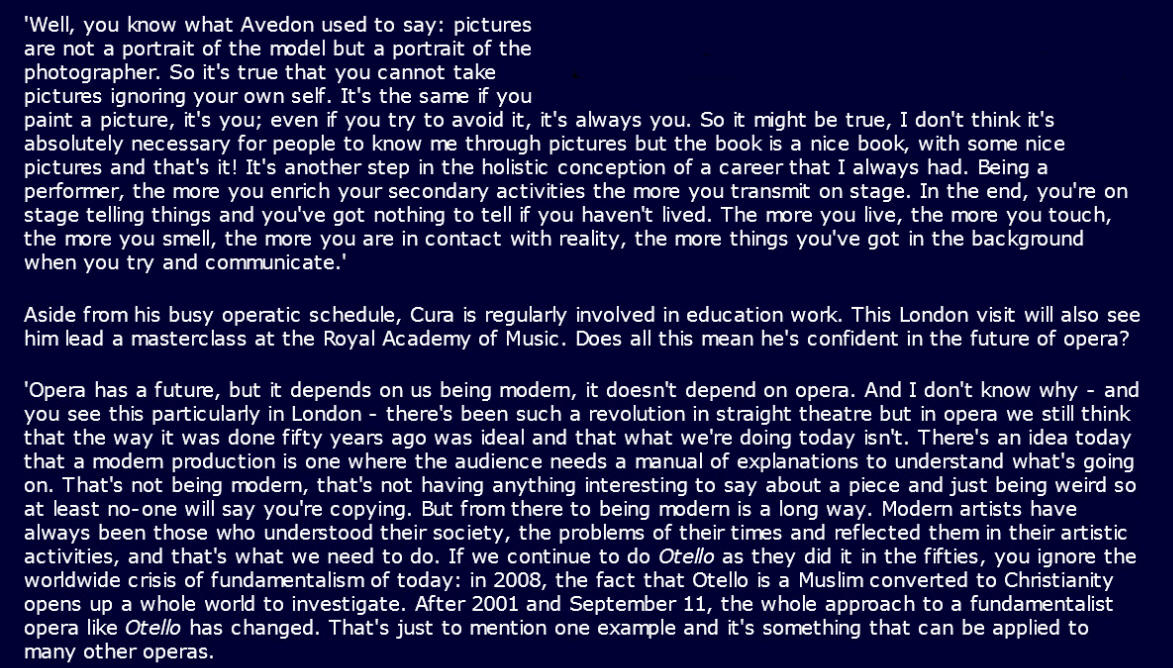

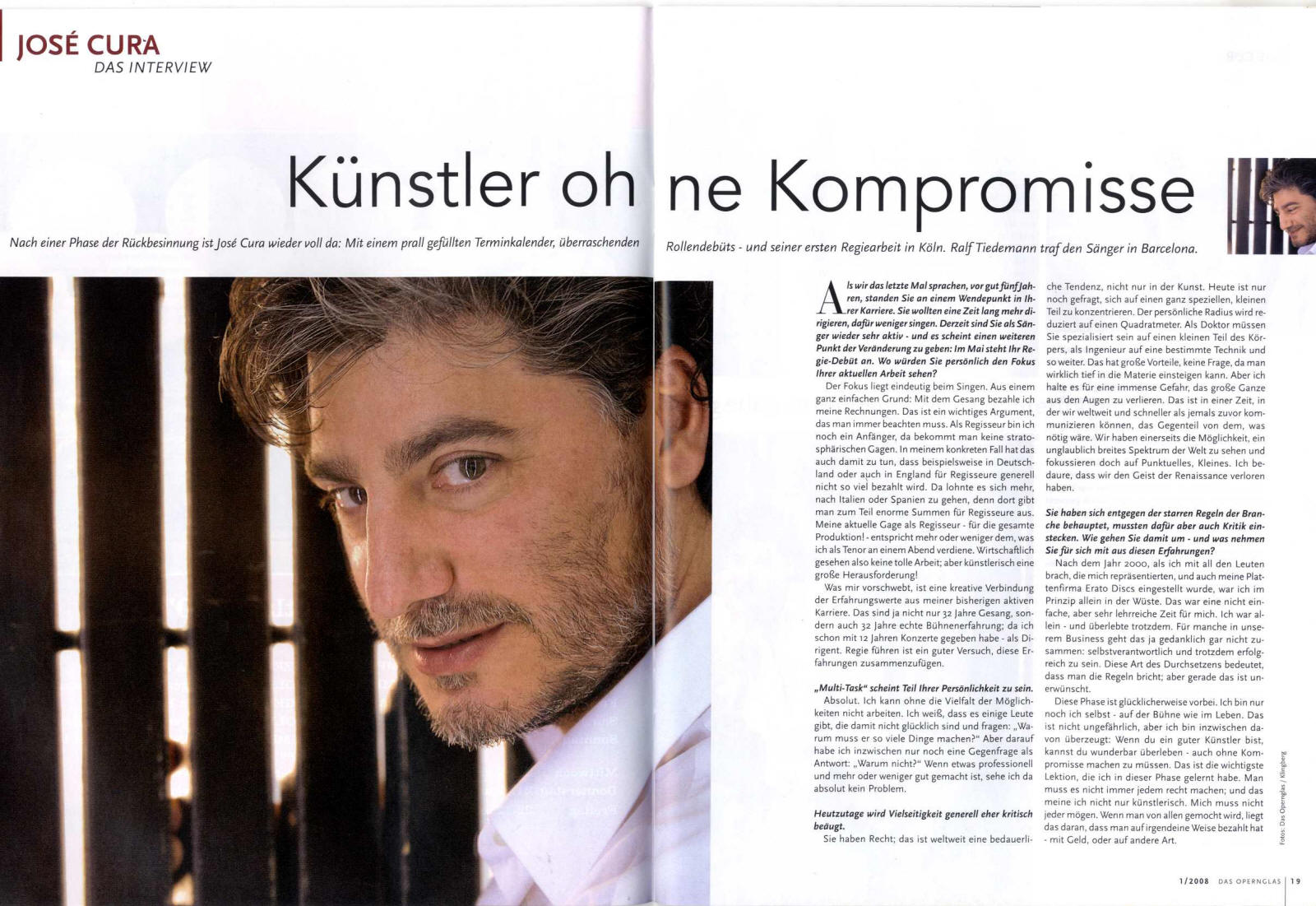
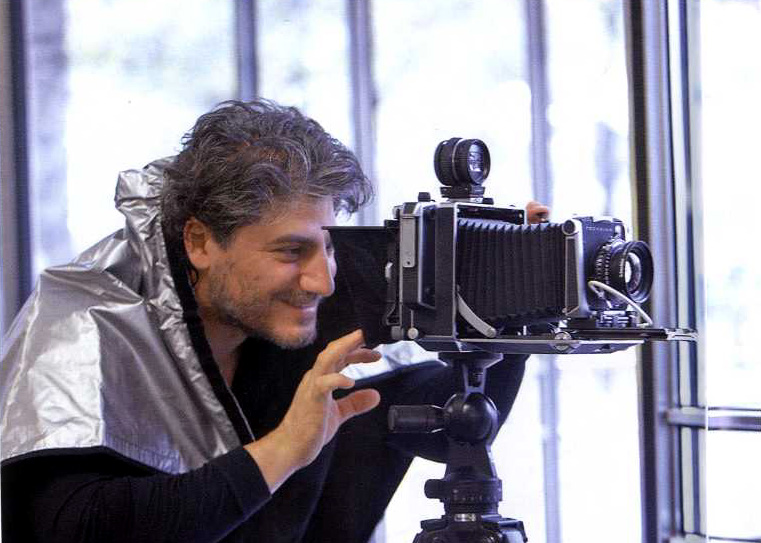
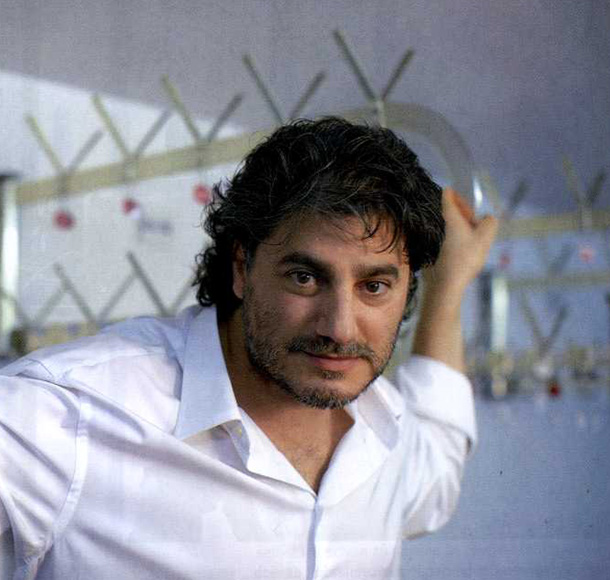
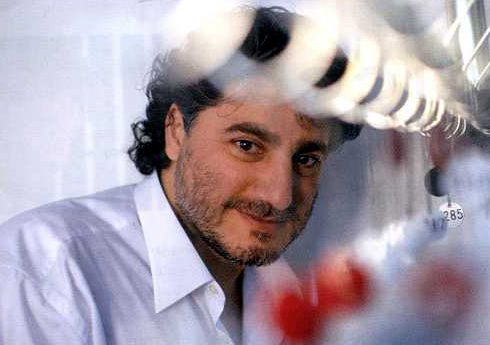
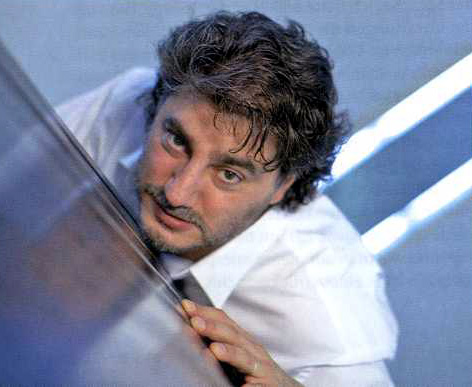
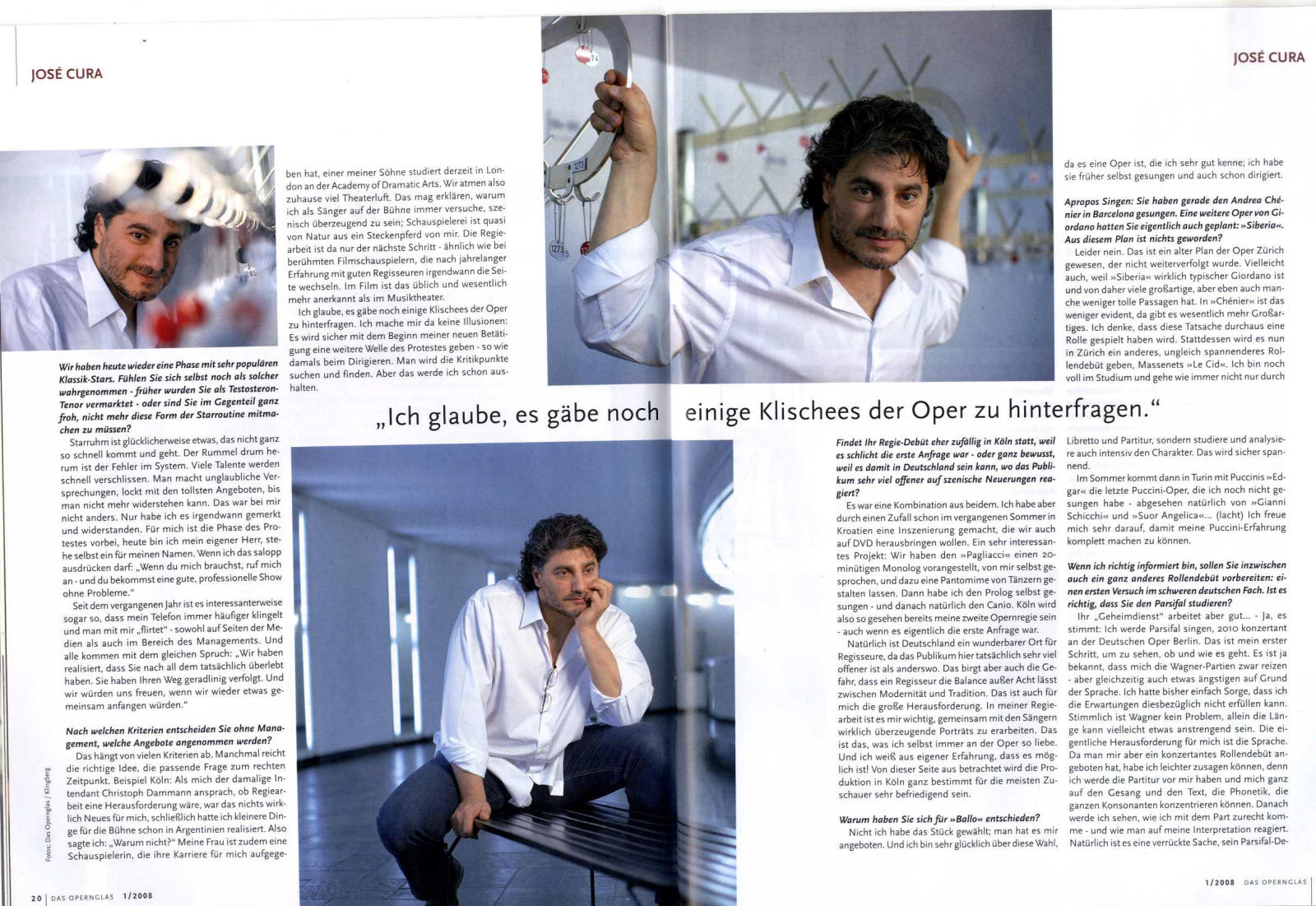
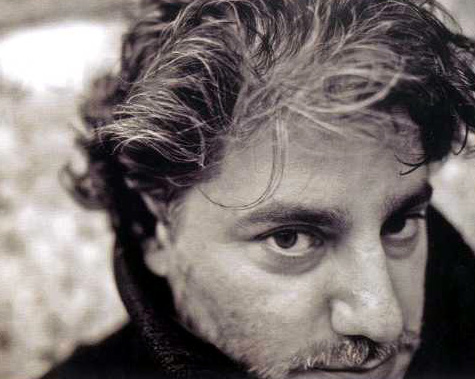
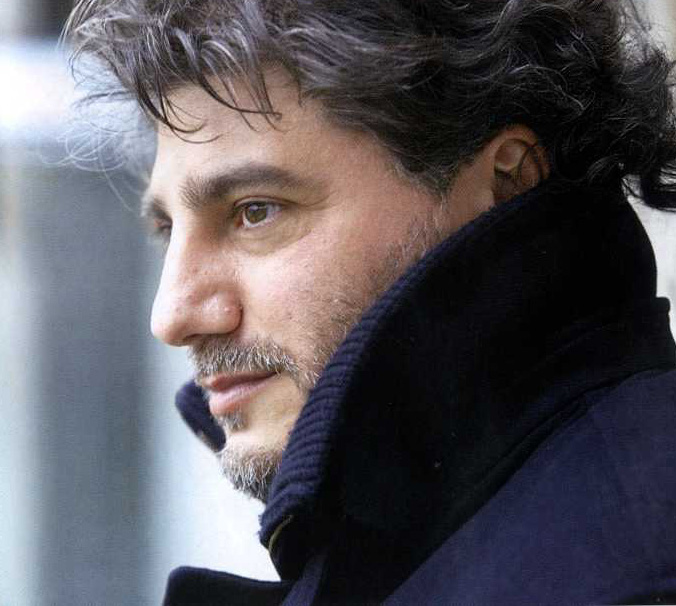
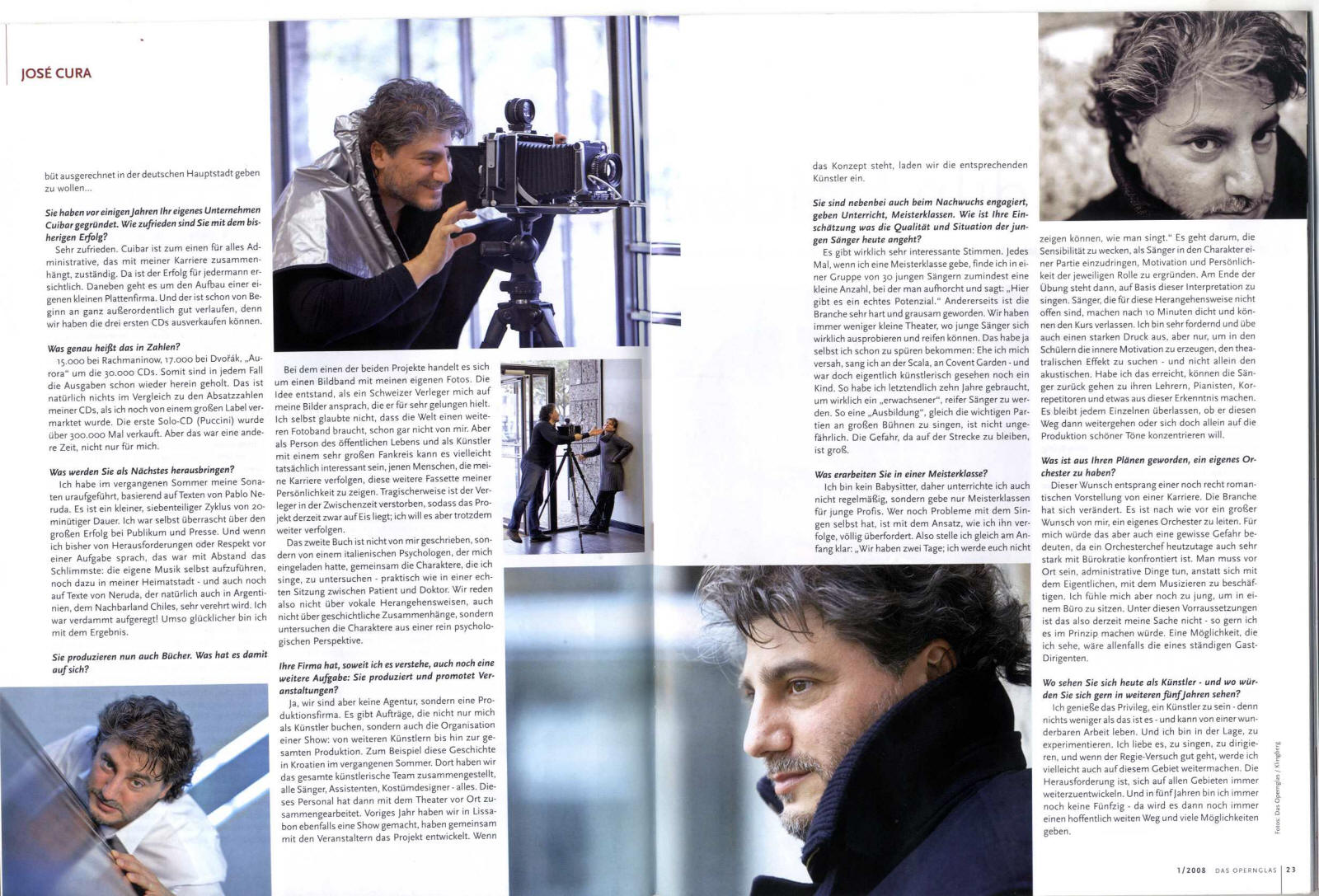
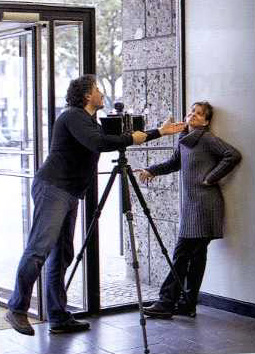
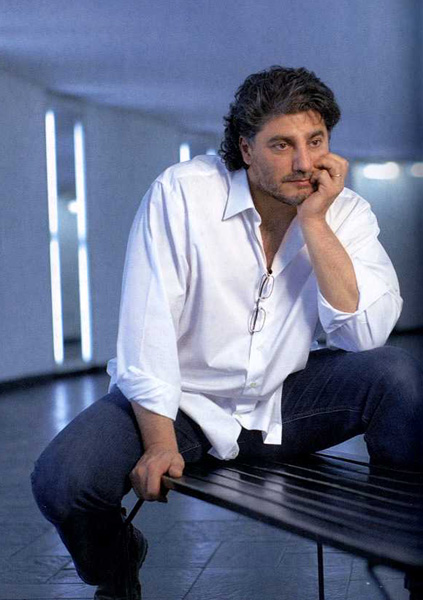
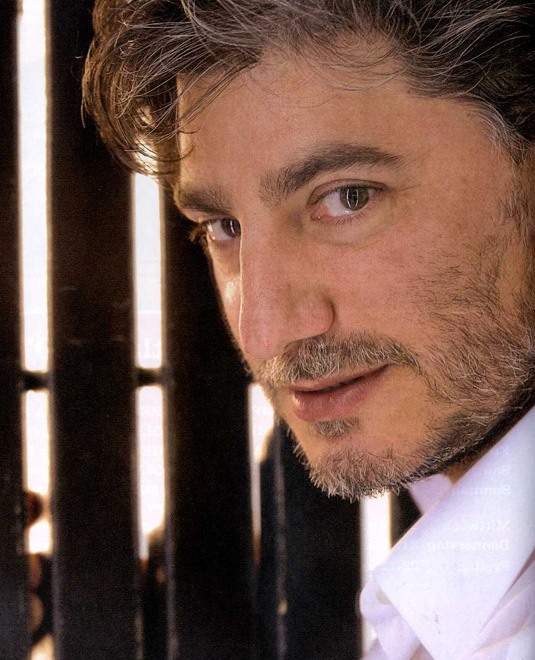
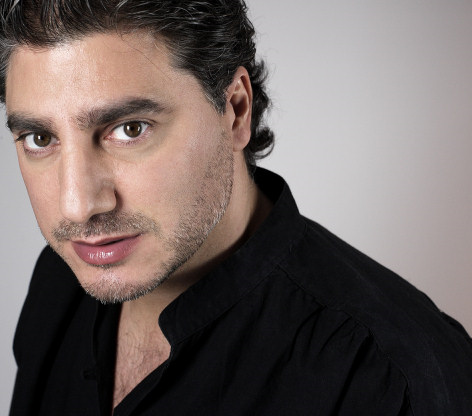 The
biography on the tenor’s own informative web site
The
biography on the tenor’s own informative web site 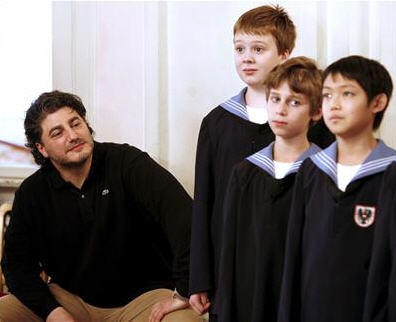
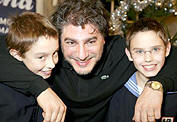
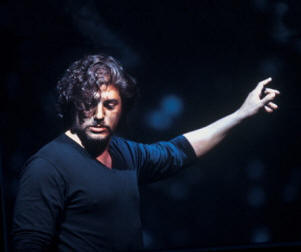
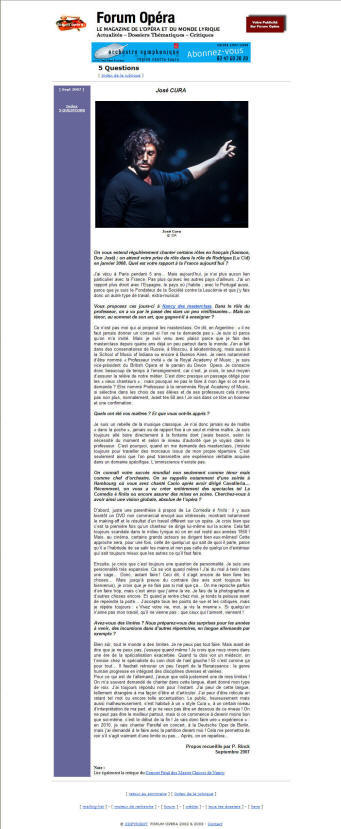



.jpg) José
Cura (44) traveled to Argentina to attend the golden anniversary
of his parents (the celebration is on Saturday 7 July in Rosario,
his hometown). He is accompanied by his wife, Silvia, and
their three children: José (19), Yazmín (14) and Nicolás (11).
The visit, at first a secret, was quickly divulged and the family
plan was subsequently interrupted by five performances of Samson
et Dalila (by Camille Saint-Saëns) in the Teatro Coliseo, with the
artistic support of the Teatro Colón, and in Rosario with the festival
of the 50 years of the Monument to the Flag and a chamber concert
in commemoration of the 25th anniversary of Mozarteum,
(8 July) where he will present the world premier of the
José
Cura (44) traveled to Argentina to attend the golden anniversary
of his parents (the celebration is on Saturday 7 July in Rosario,
his hometown). He is accompanied by his wife, Silvia, and
their three children: José (19), Yazmín (14) and Nicolás (11).
The visit, at first a secret, was quickly divulged and the family
plan was subsequently interrupted by five performances of Samson
et Dalila (by Camille Saint-Saëns) in the Teatro Coliseo, with the
artistic support of the Teatro Colón, and in Rosario with the festival
of the 50 years of the Monument to the Flag and a chamber concert
in commemoration of the 25th anniversary of Mozarteum,
(8 July) where he will present the world premier of the
.jpg) -
I was always very stubborn. Like young children, each time
they get up in the morning it is not important to them what happened
the previous day, just that they are going to play again.
I believe I am like that. I was always convinced I had something
to say, I was prepared to say it, and was going to keep on saying
it until I finally found someone who would listen to what I had
to say and then this person would pass it on to others. It
is being eternally young beyond all mistakes and objections.
It causes one to want to continue forward with the same thing.
-
I was always very stubborn. Like young children, each time
they get up in the morning it is not important to them what happened
the previous day, just that they are going to play again.
I believe I am like that. I was always convinced I had something
to say, I was prepared to say it, and was going to keep on saying
it until I finally found someone who would listen to what I had
to say and then this person would pass it on to others. It
is being eternally young beyond all mistakes and objections.
It causes one to want to continue forward with the same thing. With
his performances in Samson et Dalila presented by
the Teatro Colón, José Cura gave ample evidence to the Argentine
public of why his name is where it is in the world of opera. Nevertheless,
and not to lose the habit of being pleasantly surprised, an important
moment still remains on his agenda before the tenor returns to Europe.
It is a question this time of the world premiere of his Sonnets,
based on the poems of Pablo Neruda, that take place tomorrow in
the program for the Mozarteum of Rosario, which is celebrating its
Silver Anniversary with a concert by José Cura and pianist Eduardo
Delgado in the Foundation Astengo. The two, acquainted through
the CD of Argentine music Anhelo, will offer a chamber
recital, including songs from the recording, works for solo piano,
and the pieces composed by Cura.
With
his performances in Samson et Dalila presented by
the Teatro Colón, José Cura gave ample evidence to the Argentine
public of why his name is where it is in the world of opera. Nevertheless,
and not to lose the habit of being pleasantly surprised, an important
moment still remains on his agenda before the tenor returns to Europe.
It is a question this time of the world premiere of his Sonnets,
based on the poems of Pablo Neruda, that take place tomorrow in
the program for the Mozarteum of Rosario, which is celebrating its
Silver Anniversary with a concert by José Cura and pianist Eduardo
Delgado in the Foundation Astengo. The two, acquainted through
the CD of Argentine music Anhelo, will offer a chamber
recital, including songs from the recording, works for solo piano,
and the pieces composed by Cura.

 Applauded
by the critics for his interpretations of Giuseppe Verdi’s
“Otello” and Saint-Saens’ “Samson”, Cura is also recognized
for being the first artist to have sung and conducted
the same work simultaneously as well as being the first
to combine vocal with symphonic performances in the
same concert.
Applauded
by the critics for his interpretations of Giuseppe Verdi’s
“Otello” and Saint-Saens’ “Samson”, Cura is also recognized
for being the first artist to have sung and conducted
the same work simultaneously as well as being the first
to combine vocal with symphonic performances in the
same concert.








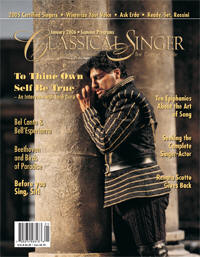
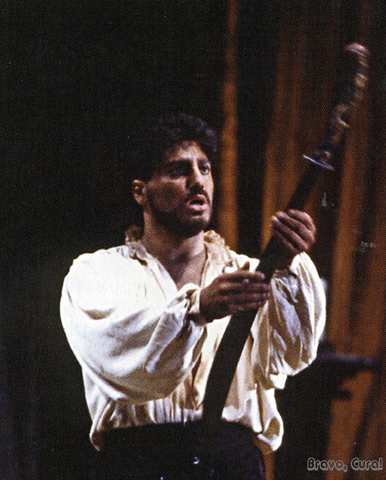 Well,
we worked for a year. I have always been a rebel in my life,
self-taught in almost everything I do. I always wanted to carve
my way, in my own style. But this teacher helped me discover
and understand my instrument. He didn’t change it; he didn’t
try to shape what was the rough prototype of my voice into an
artist. So, from there on, I took charge of my own instrument,
and kept asking myself: “Now that I understand how it feels,
what do I have to do, what do I have to keep feeling? How do
I have to mold my understanding of the voice into the musician
that I am, in order to continue on my own path?”
Well,
we worked for a year. I have always been a rebel in my life,
self-taught in almost everything I do. I always wanted to carve
my way, in my own style. But this teacher helped me discover
and understand my instrument. He didn’t change it; he didn’t
try to shape what was the rough prototype of my voice into an
artist. So, from there on, I took charge of my own instrument,
and kept asking myself: “Now that I understand how it feels,
what do I have to do, what do I have to keep feeling? How do
I have to mold my understanding of the voice into the musician
that I am, in order to continue on my own path?”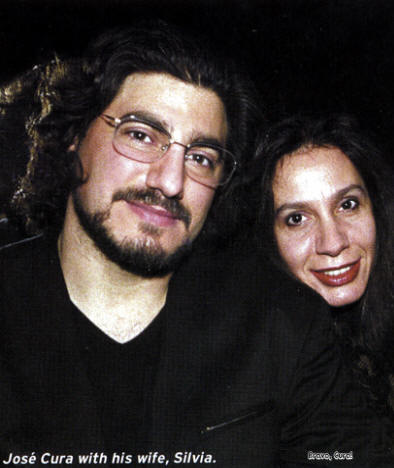 It’s
not about when you start … it’s about what you have inside your
head to deal with your life and your career, which has nothing
to do with when you start, or with age. This is like getting
married. If you feel that you have to get married at 22, even
if everybody says that you are too young, then you get married
at 22. I got married at 22! I’ve been married for 20 years—I
have three kids and I am the happiest man. So, it worked!
It’s
not about when you start … it’s about what you have inside your
head to deal with your life and your career, which has nothing
to do with when you start, or with age. This is like getting
married. If you feel that you have to get married at 22, even
if everybody says that you are too young, then you get married
at 22. I got married at 22! I’ve been married for 20 years—I
have three kids and I am the happiest man. So, it worked!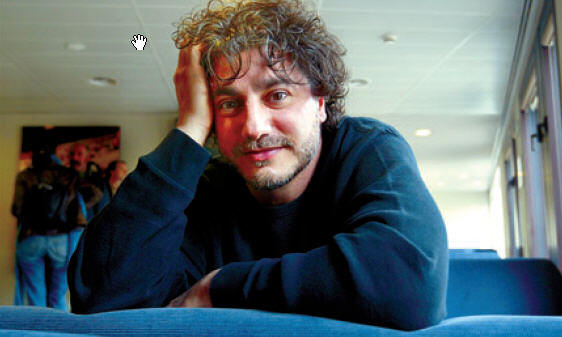
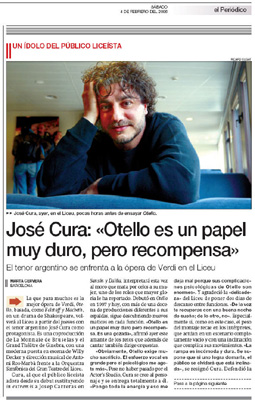 “Obvious,
Otello demands a lot of sacrifice. The vocal effort is great
but I find the psychological effort is even more exhausting.”
“Obvious,
Otello demands a lot of sacrifice. The vocal effort is great
but I find the psychological effort is even more exhausting.”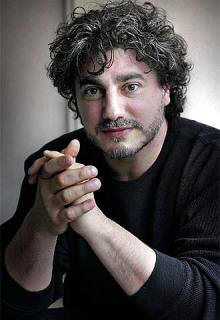
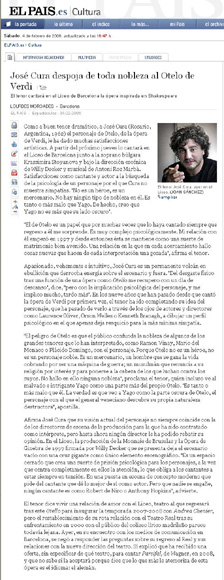 "The
role of Otello is one I have sung many times and yet it always
surprises me when I return to it. He is very complex psychologically.
My relationship with him began in 1997 and since then it has
been a sort of marriage. It is a relationship in which
I find new delights in interpretation with each production,"
says the tenor.
"The
role of Otello is one I have sung many times and yet it always
surprises me when I return to it. He is very complex psychologically.
My relationship with him began in 1997 and since then it has
been a sort of marriage. It is a relationship in which
I find new delights in interpretation with each production,"
says the tenor.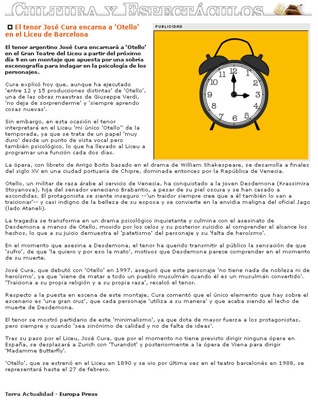 The
Argentine tenor José Cura will portray Otello in the
The
Argentine tenor José Cura will portray Otello in the 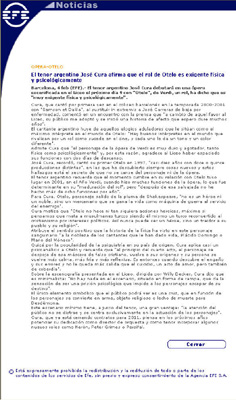 Cura,
who first sang in the Barcelonan theater in Samson et Dalila
in season 2000-2001 when he replaced José Carreras at the last
minute when Carreras fell ill, commented during his press conference
that “in exchange for that favor to the Liceu, the audience
adopted me and a history of affection began which I hope lasts
many years.”
Cura,
who first sang in the Barcelonan theater in Samson et Dalila
in season 2000-2001 when he replaced José Carreras at the last
minute when Carreras fell ill, commented during his press conference
that “in exchange for that favor to the Liceu, the audience
adopted me and a history of affection began which I hope lasts
many years.”
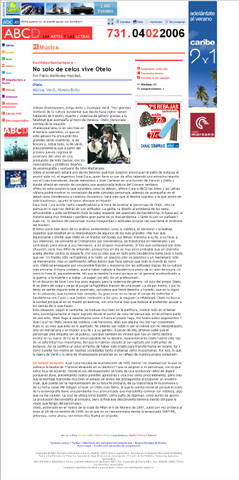 On
stage will be Argentinean José Cura, a tenor who may cause many
sighs in the stalls when he assumes this role. It has taken
him several years to build a strong relationship with Liceu
since his first, brief appearance when he replaced José Carreras
in a production of Samson et Dalila until [last year]
when he presented a passionate reading of Il corsaro
in a concert version of the Verdi opera.
On
stage will be Argentinean José Cura, a tenor who may cause many
sighs in the stalls when he assumes this role. It has taken
him several years to build a strong relationship with Liceu
since his first, brief appearance when he replaced José Carreras
in a production of Samson et Dalila until [last year]
when he presented a passionate reading of Il corsaro
in a concert version of the Verdi opera.  BARCELONA.
Promoting the best Otello of the moment was a marketing ploy
the Liceu could not let pass, and in introducing José Cura,
Joan Matabosch, the Liceu’s artistic director, said: "We are
very proud to have with us the best interpreter of this role
at this time.”
BARCELONA.
Promoting the best Otello of the moment was a marketing ploy
the Liceu could not let pass, and in introducing José Cura,
Joan Matabosch, the Liceu’s artistic director, said: "We are
very proud to have with us the best interpreter of this role
at this time.”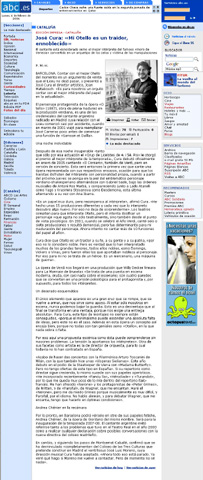 "It
is a very difficult role, but it rewards the interpreter," Cura
said. "I have been in 15 different productions and whenever
I play the role I discover something new. That is why it never
ceases to amaze me.” Theaters compete to sign him for
the role but he tries to take a rational approach to accepting
offers for a character "who exhausts not only physically but
also psychologically. In 2001, when the Verdi Year was celebrated,
I sang in six or seven different productions and that was insane,
but it helped me matured in the role. Now I try to sing no more
than ten performances a year."
"It
is a very difficult role, but it rewards the interpreter," Cura
said. "I have been in 15 different productions and whenever
I play the role I discover something new. That is why it never
ceases to amaze me.” Theaters compete to sign him for
the role but he tries to take a rational approach to accepting
offers for a character "who exhausts not only physically but
also psychologically. In 2001, when the Verdi Year was celebrated,
I sang in six or seven different productions and that was insane,
but it helped me matured in the role. Now I try to sing no more
than ten performances a year."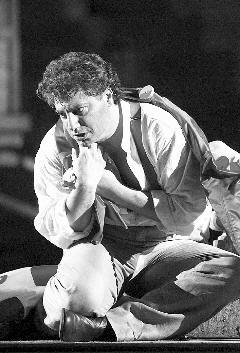
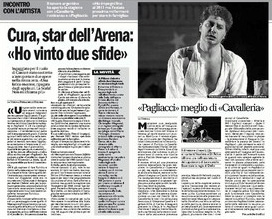 “The
great heat: I spent all evening getting water and integrators
to recover the lost liquids.”
“The
great heat: I spent all evening getting water and integrators
to recover the lost liquids.”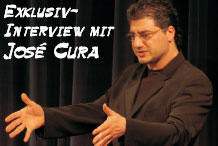
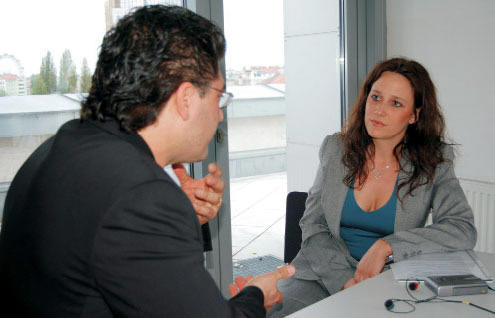
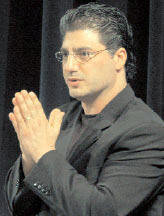 R-S:
Your occupation
affects
your private
and family
life. As
you have
already
mentioned
before,
you are
lot on the
way. How
do you and
your wife
deal with
it?
R-S:
Your occupation
affects
your private
and family
life. As
you have
already
mentioned
before,
you are
lot on the
way. How
do you and
your wife
deal with
it?

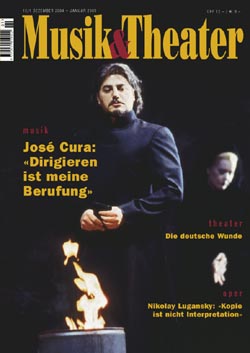 M&T:
What makes you special?
M&T:
What makes you special?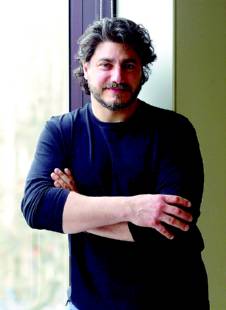 José
Cura ( Rosario 1962) could be reproached for many things,
but never for being a tame tenor. On the contrary. He is one
of those artists who leave their mark on everything they do.
This he demonstrated in December 2000, when after having been
booed by part of the audience in stalls at Teatro Real, he stopped
the performance and stood up to them.
José
Cura ( Rosario 1962) could be reproached for many things,
but never for being a tame tenor. On the contrary. He is one
of those artists who leave their mark on everything they do.
This he demonstrated in December 2000, when after having been
booed by part of the audience in stalls at Teatro Real, he stopped
the performance and stood up to them.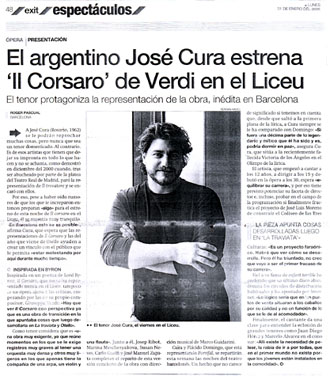
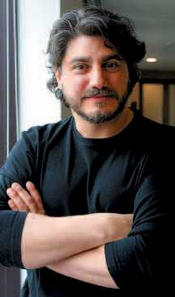 Inserted
between performances of Parsifal,
Inserted
between performances of Parsifal, 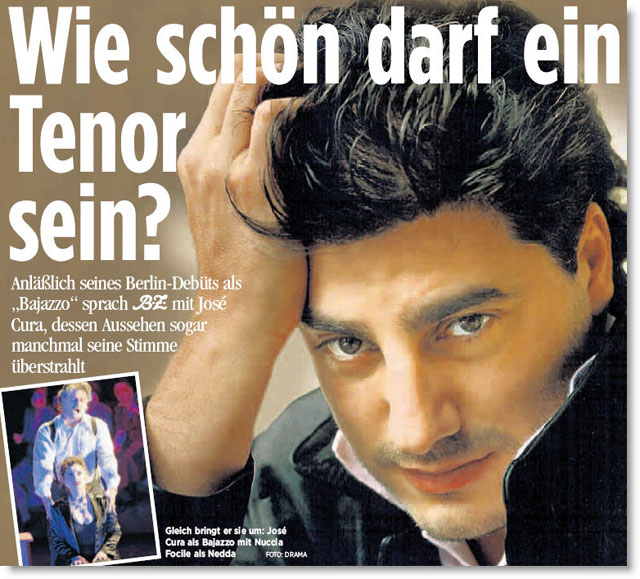
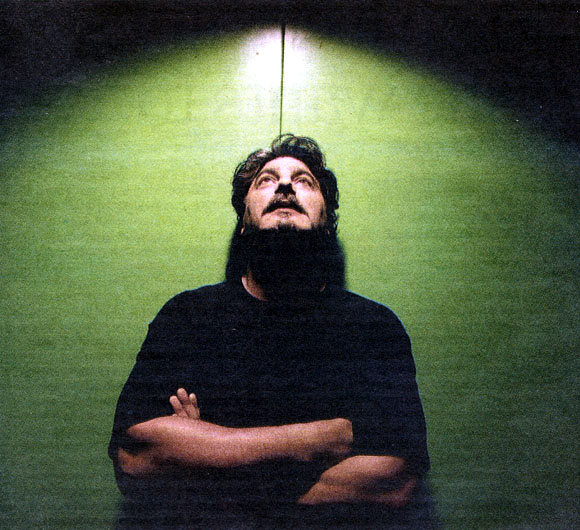 José
Cura breezes in from his rehearsal at the Royal Opera House
looking rather like an off-duty nightclub bouncer. The dark-eyed
Argentinian superstar, a former rugby player and body-builder,
could have been tailor-made for the tenor lead in La Fanciulla
del West, Puccini's take on the gold rush, for which he received
rave reviews last week. His character, Johnson, aka Ramerrez,
is an escaped Latin bandit, by turns a "goody" and a "baddy"
in the best tradition of spaghetti westerns, but - in the best
tradition of romantic opera - ultimately redeemed by love. Cura
has run the gamut of "goody" and "baddy" in terms of critical
opinion over the years, but it's his passion that carries him
beyond that. His treacly, seductive, dangerous voice can knock
you into submission in seconds.
José
Cura breezes in from his rehearsal at the Royal Opera House
looking rather like an off-duty nightclub bouncer. The dark-eyed
Argentinian superstar, a former rugby player and body-builder,
could have been tailor-made for the tenor lead in La Fanciulla
del West, Puccini's take on the gold rush, for which he received
rave reviews last week. His character, Johnson, aka Ramerrez,
is an escaped Latin bandit, by turns a "goody" and a "baddy"
in the best tradition of spaghetti westerns, but - in the best
tradition of romantic opera - ultimately redeemed by love. Cura
has run the gamut of "goody" and "baddy" in terms of critical
opinion over the years, but it's his passion that carries him
beyond that. His treacly, seductive, dangerous voice can knock
you into submission in seconds. 